How to setup Conditional Logic If/Else
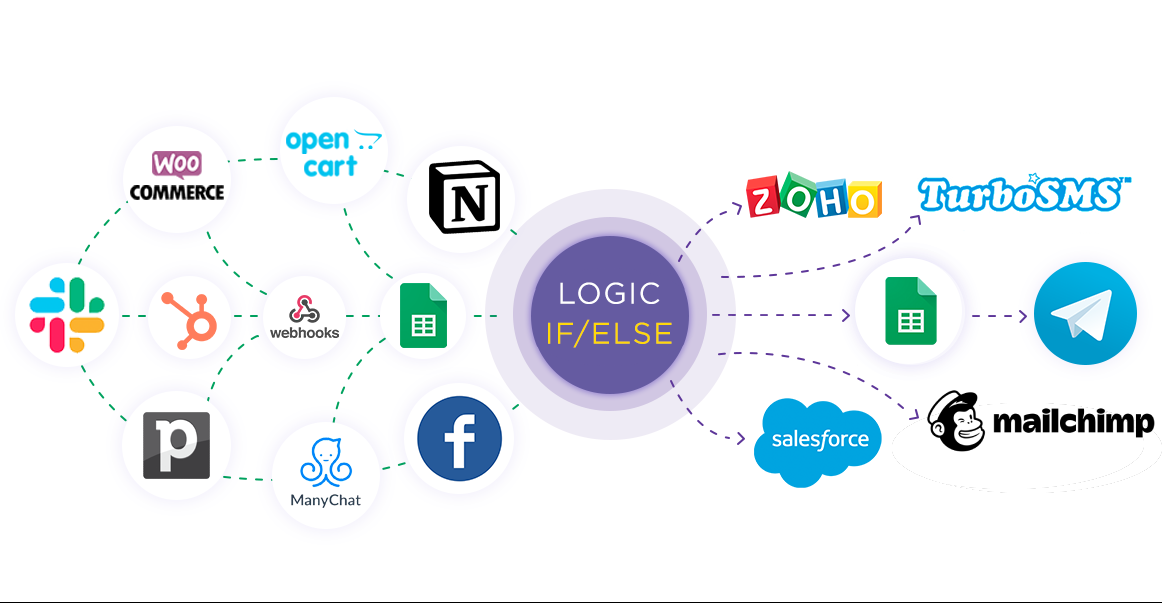
Integration with Logic If/Else is implemented as a separate Logic If/Else section and is a powerful tool for automating and optimizing various business processes. Logic If/Else allows you to set updata transfer scenarios based on the specific conditions under which certain actions must be performed in various Data Destination systems. This will allow data from the Data Source to be transferred to Data Destination according to established conditions and to build flexible and efficient business processes. Thus, using the Logic If/Else section, you can automatically monitor compliance with conditions and transfer data to the services and systems that you use.
The Logic If/Else feature allows you to set up data transmission scenarios based on the specific conditions under which certain actions must be performed in various Data Destination systems.
Navigation:
Connecting Google Sheets as a Data Source:
1. What data can you get from Google Sheets?
2. How to connect your Google Sheets account to ApiX-Drive?
3. Select the table and sheet from which rows will be get.
4. An example of data for one of the rows in your table.
Connecting Gmail as a Data Destination:
1. What will the Gmail integration do?
2. How to connect your Gmail account to ApiX-Drive?
3. How to set up data transfer to Gmail in the selected action?
4. Example of data that will be sent to your Gmail.
Setting up the first section of Logic If/Else - Gmail:
1. What logical action will the first Logic section perform?
2. How to set a specific condition for a selected action?
3. How to add Data Destination inside the Logic section?
4. What will the Gmail integration do?
5. How to connect a Gmail account in the Logic section?
6. How to set up data transfer to Gmail in the selected action?
7. Example of data that will be sent to your Gmail.
Setting up the second section of Logic If/Else - Slack:
1. What logical action will the second Logic section perform?
2. How to set a specific condition for a selected action?
3. How to add Data Destination inside the Logic section?
4. What will integration with Slack do?
5. How to connect a Slack account in the Logic section?
6. How to set up data transfer to Slack in the selected action?
7. Example of data that will be sent to your Slack.
8. Auto-update and update interval.
Answers to frequently asked questions:
1. How to set up Logic based on the result of data transmission of the Data Destination system, if the execution result condition is Successful or Unsuccessful?
2. What will be the final result for the given condition?
Setting Data SOURCE: Google Sheets
Let's look at the operation of the Logic function using the example of a data transfer scenario for specific conditions in Gmail and Slack.
First, you need to create a new connection, click “Create connection”.
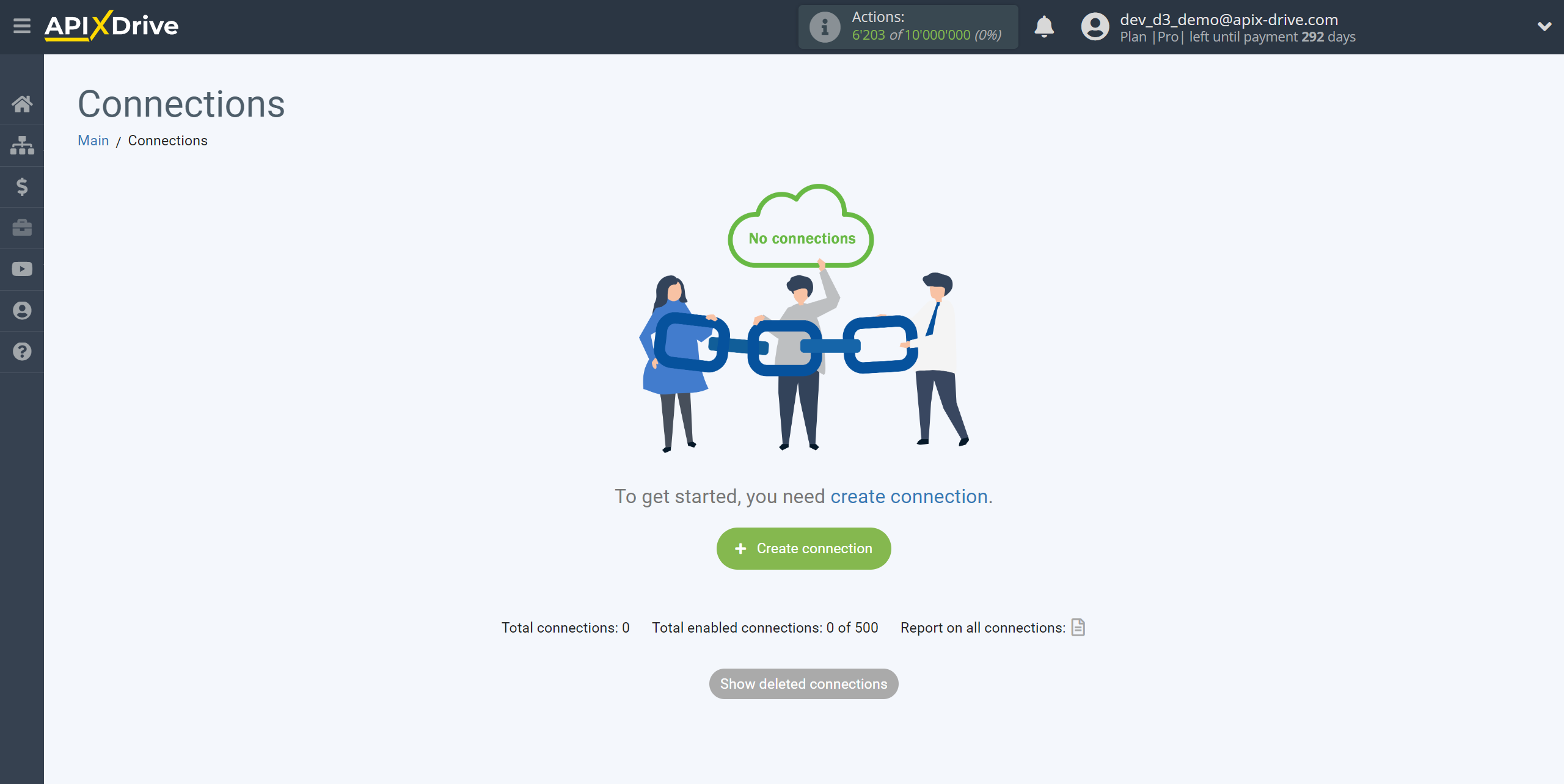
Select the system as the Data Source. In this case, you must specify Google Sheets.
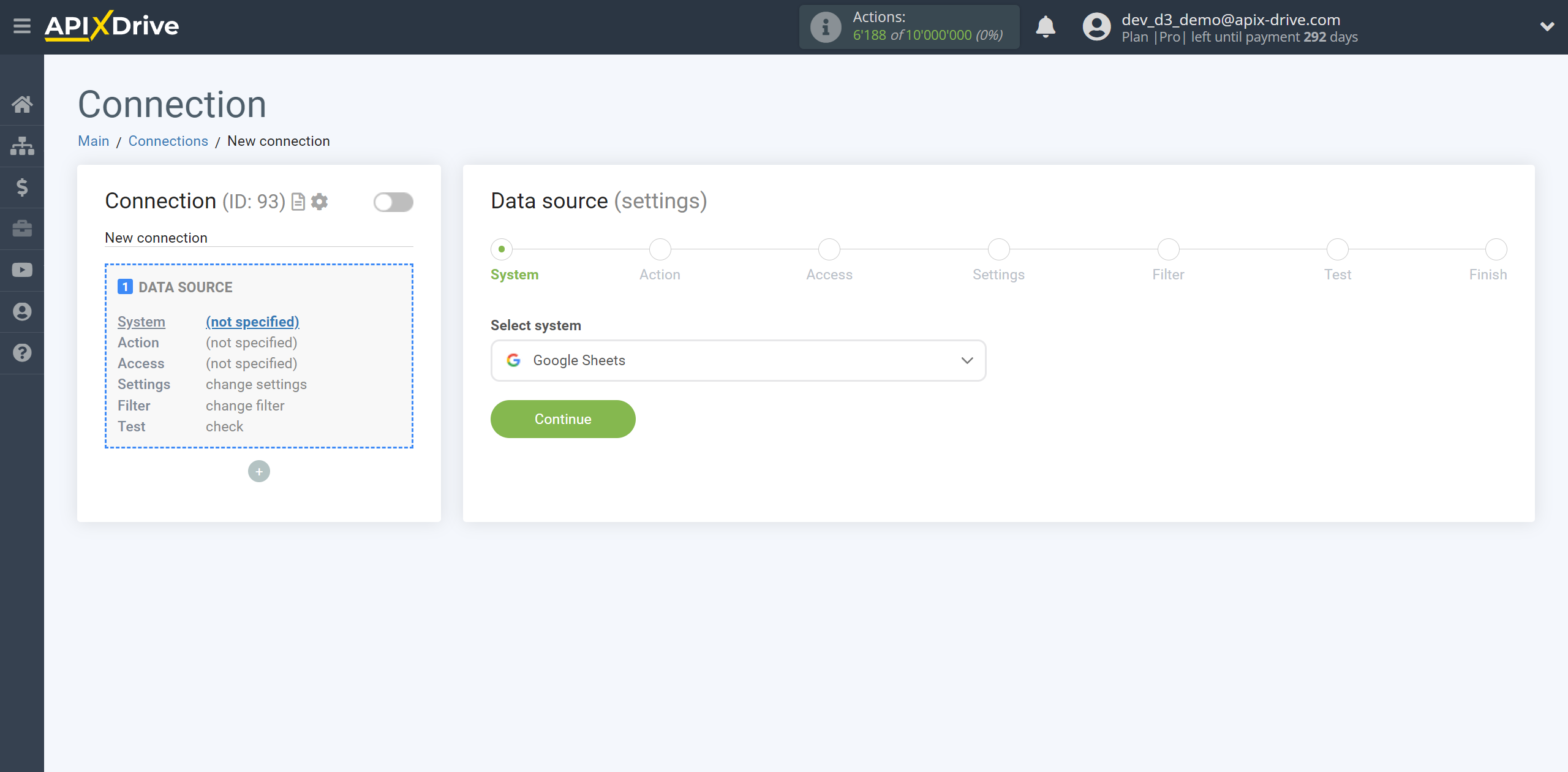
Next, you need to specify the action "Get ROWS (new)".
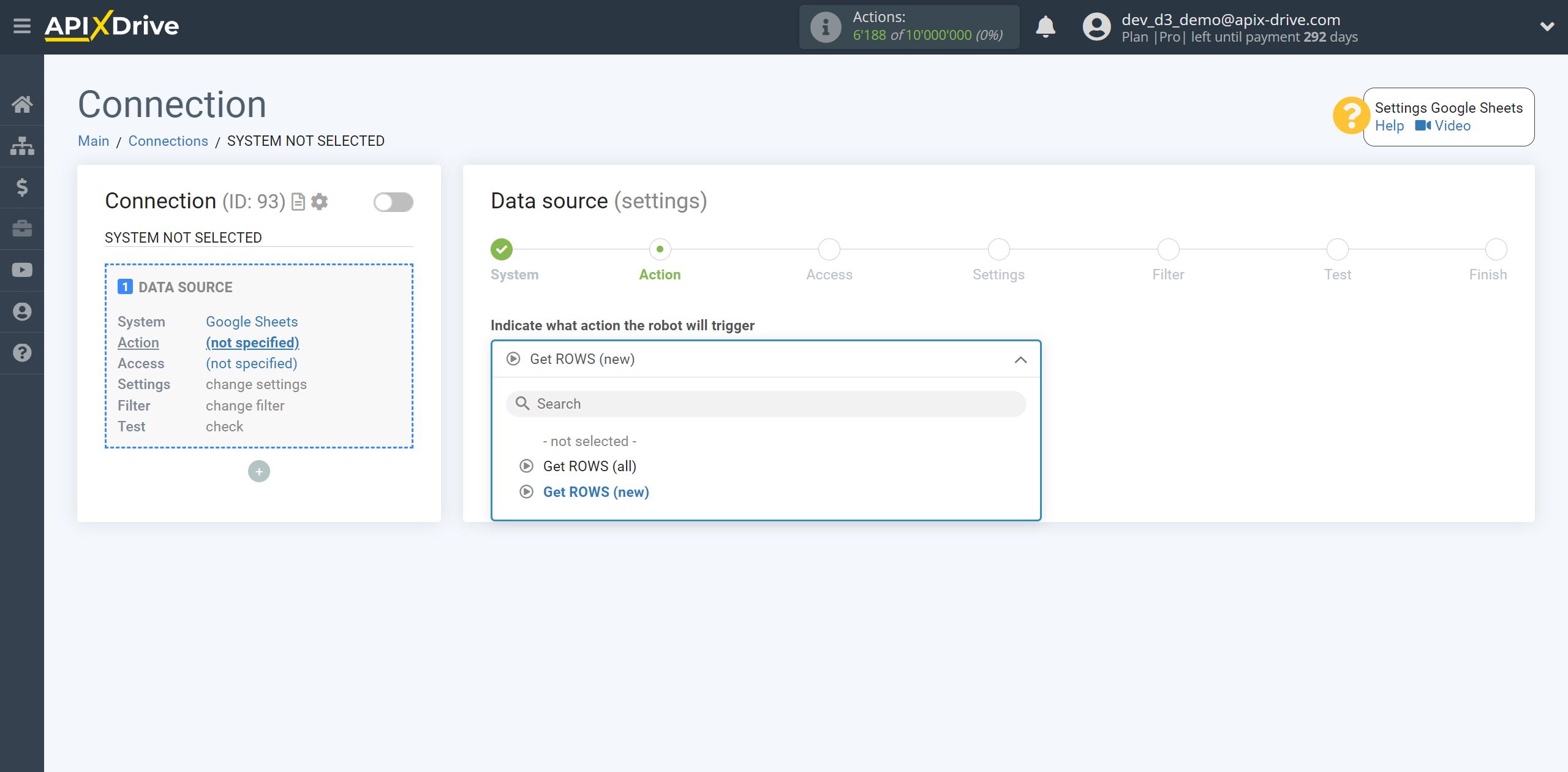
The next step is to select the Google Sheets account from which will get the data.
If there are no accounts connected to the system, click "Connect account".
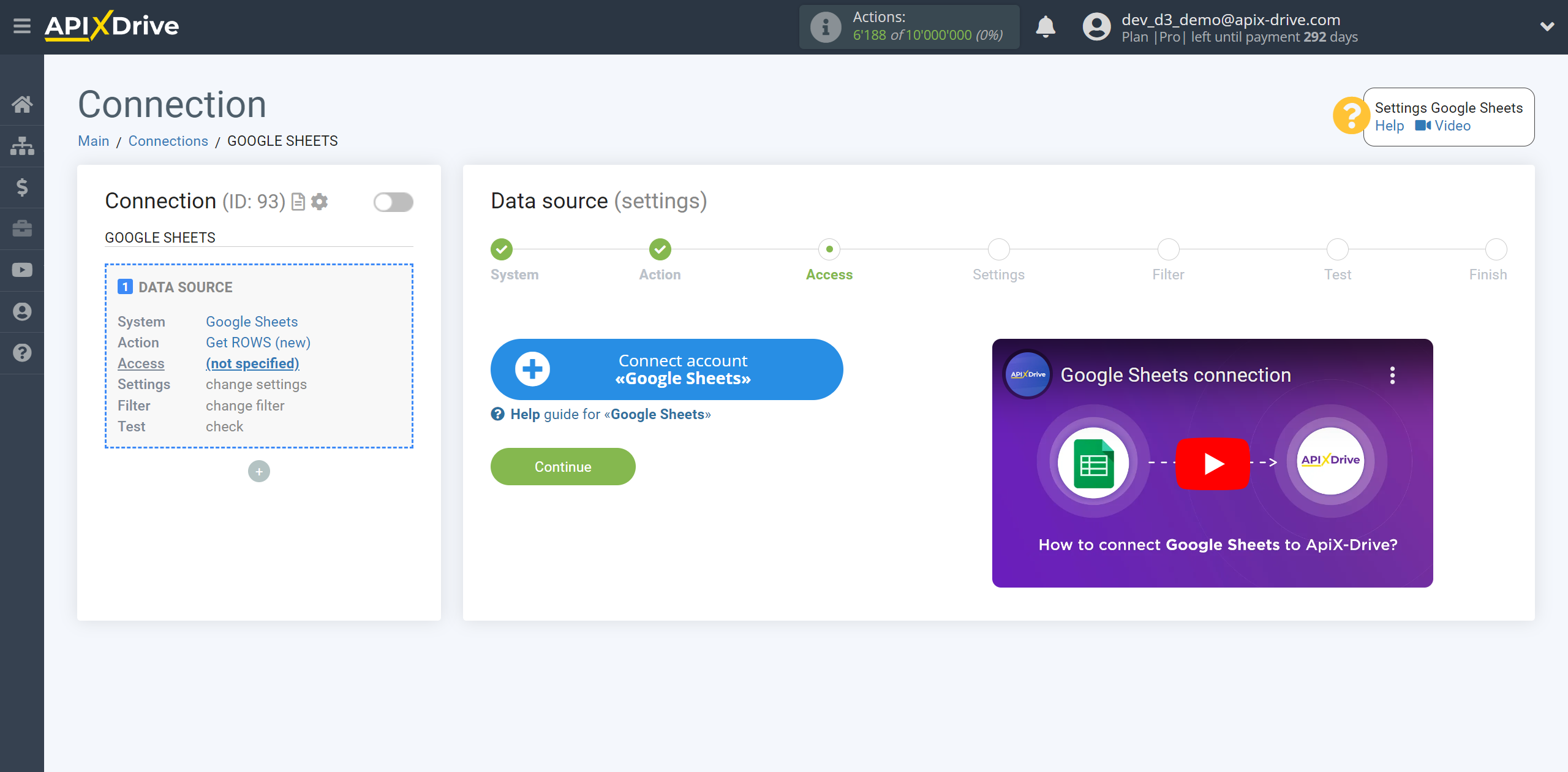
Select which account you want to connect to ApiX-Drive.
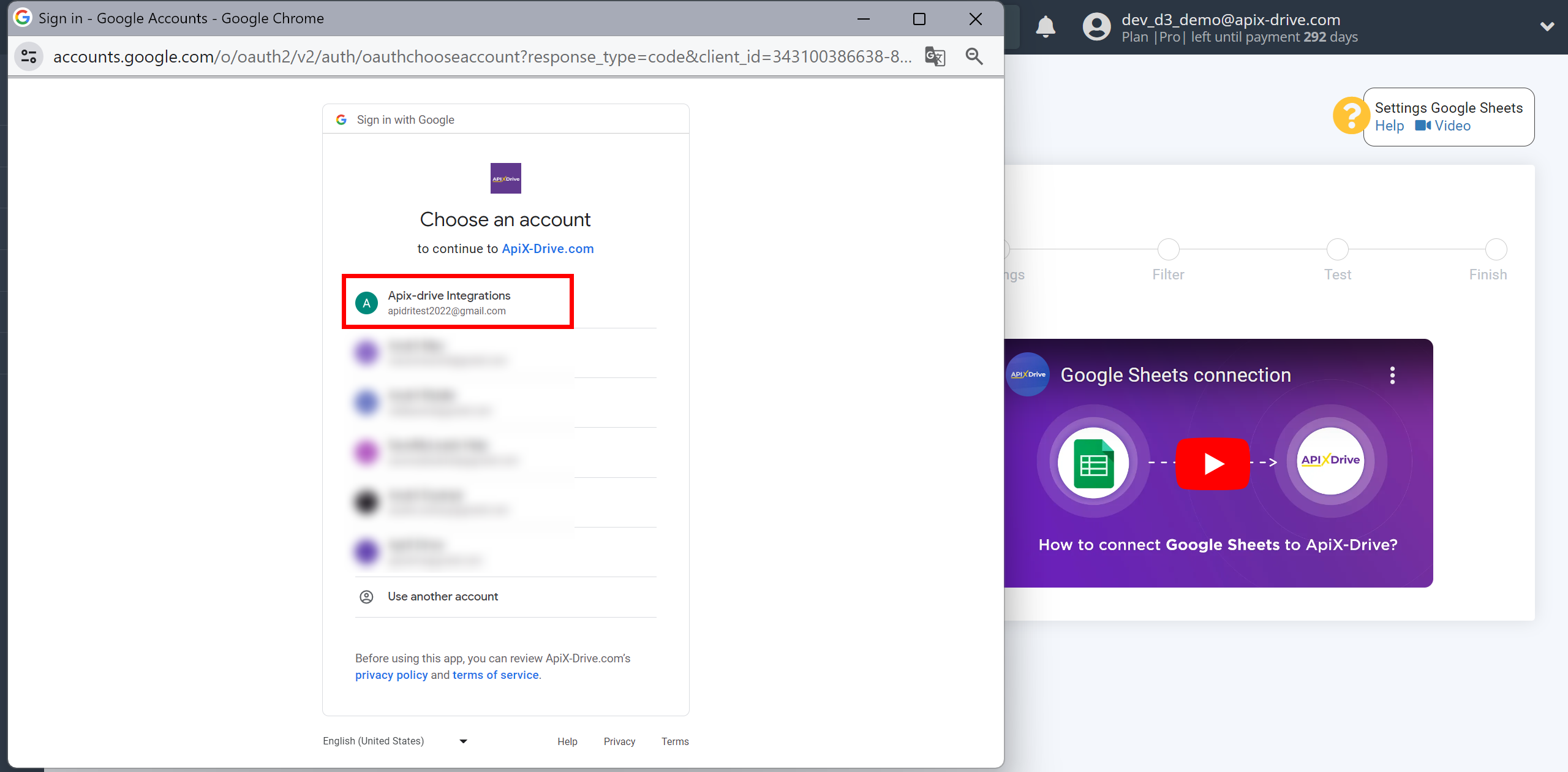
Give your permission to ApiX-Drive to work with this account.
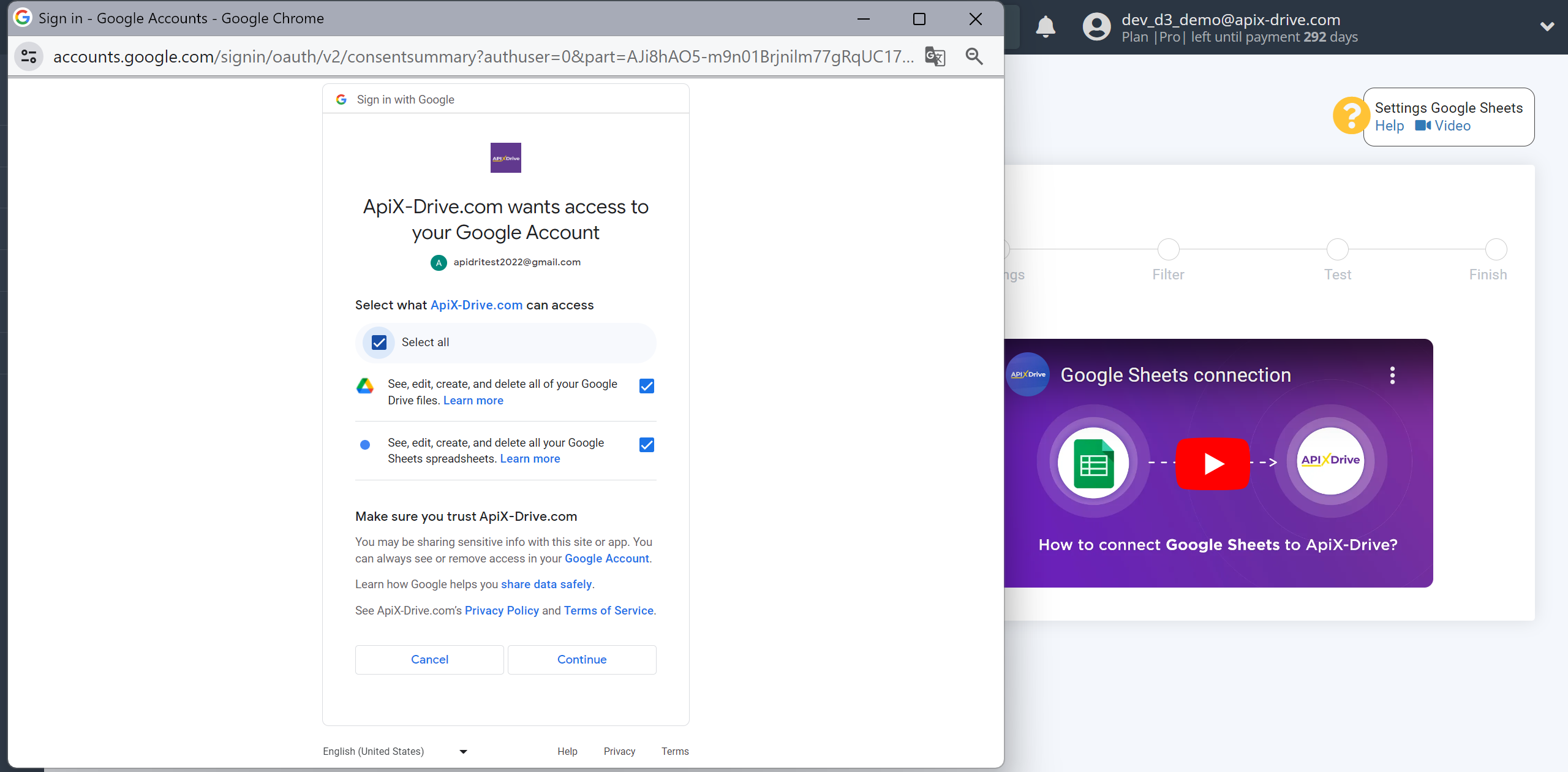
When the connected account appears in the "active accounts" list, select it.
Attention! If your account is on the "inactive accounts" list, check your access to this account!
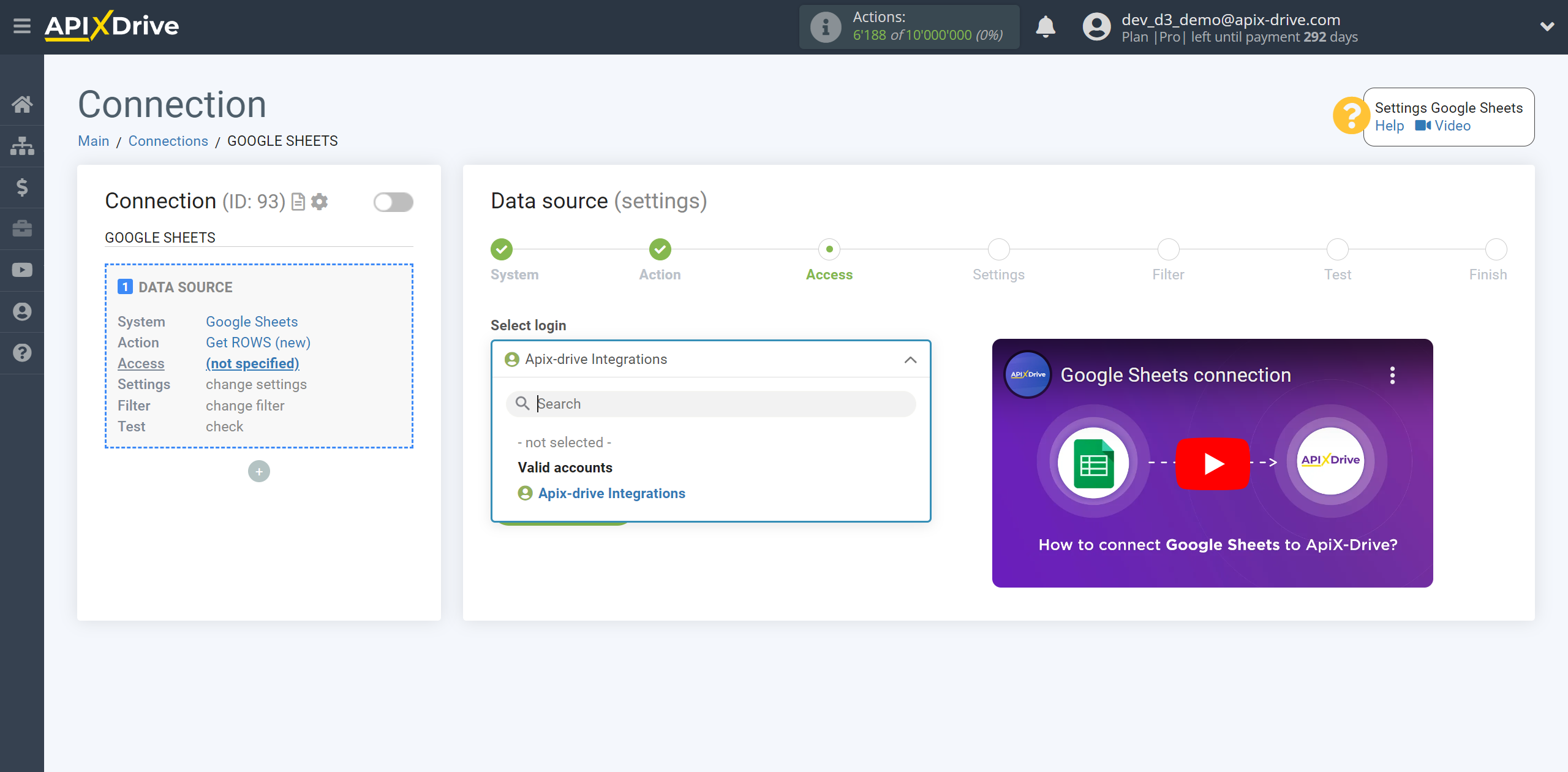
Select the Google Sheets table and sheet where the data you need is located.
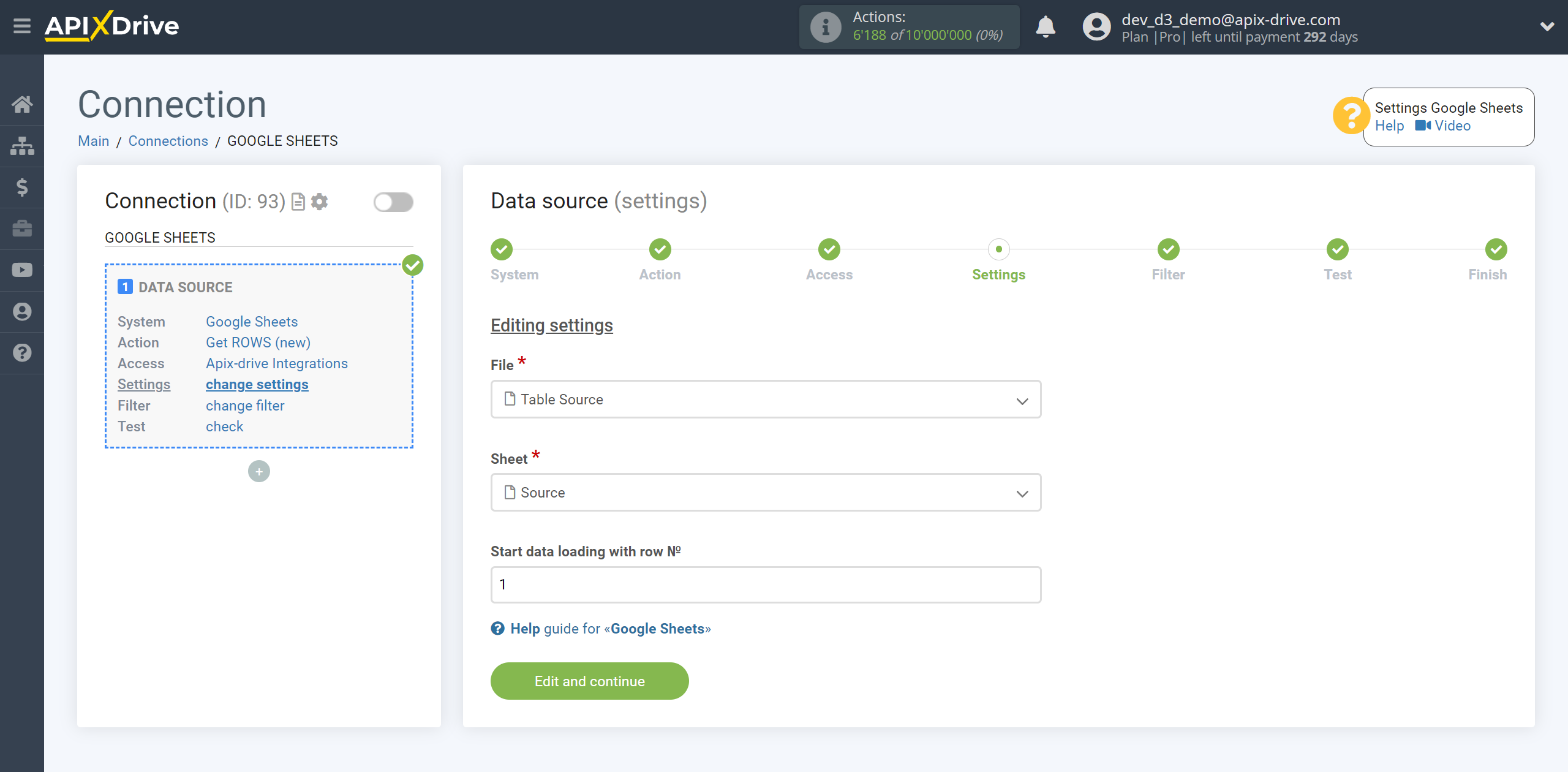
If necessary, you can set up a Data Filter, or click "Continue" to skip this step.
To find out how to setup the Data Filter, follow the link: https://apix-drive.com/en/help/data-filter
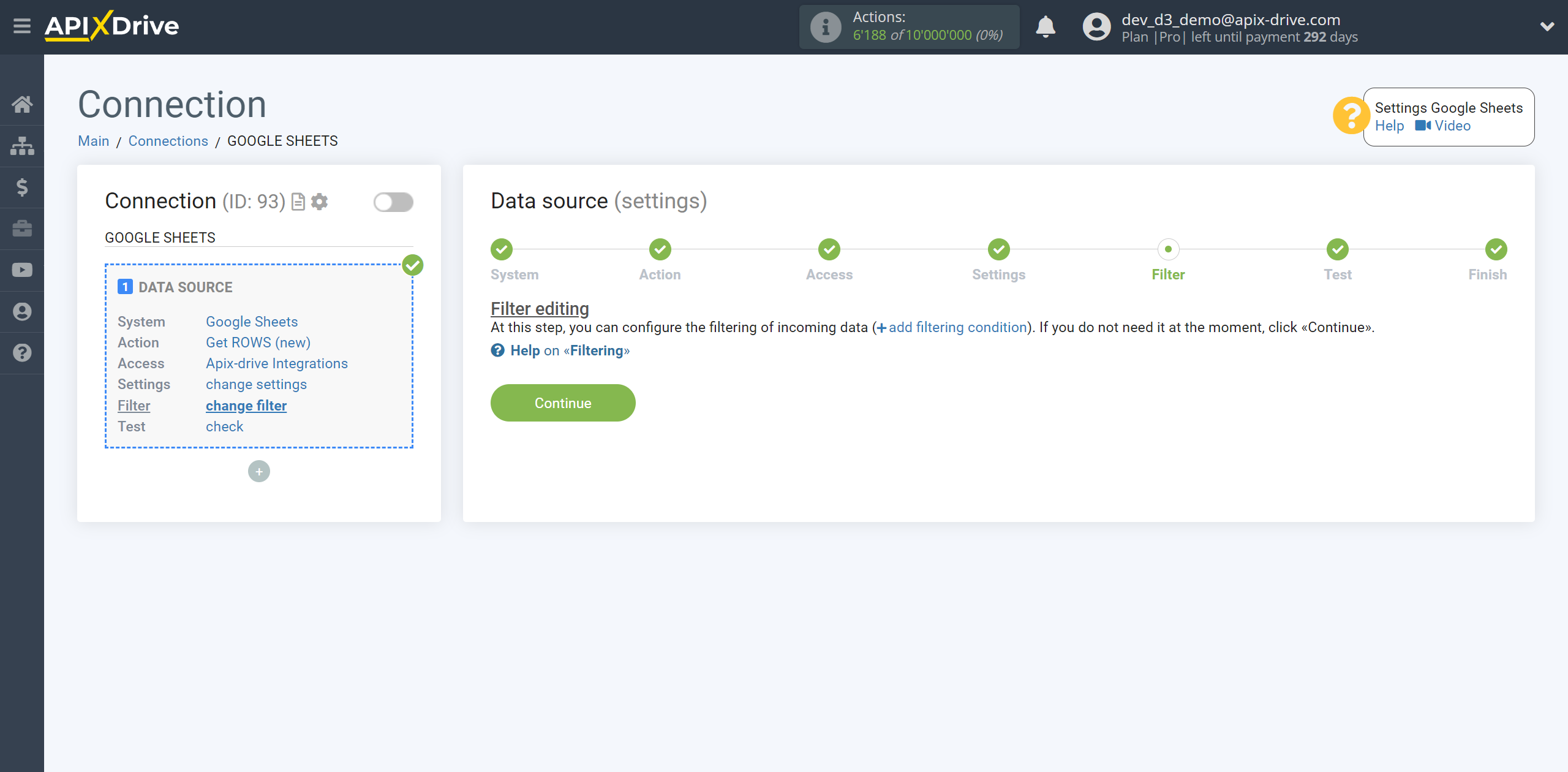
You can now see test data for one of the rows in your Google Sheets table.
If you want to update your test data, click "Load test data from Google Sheets"
If you want to change the settings, click "Edit" and you will go back a step.
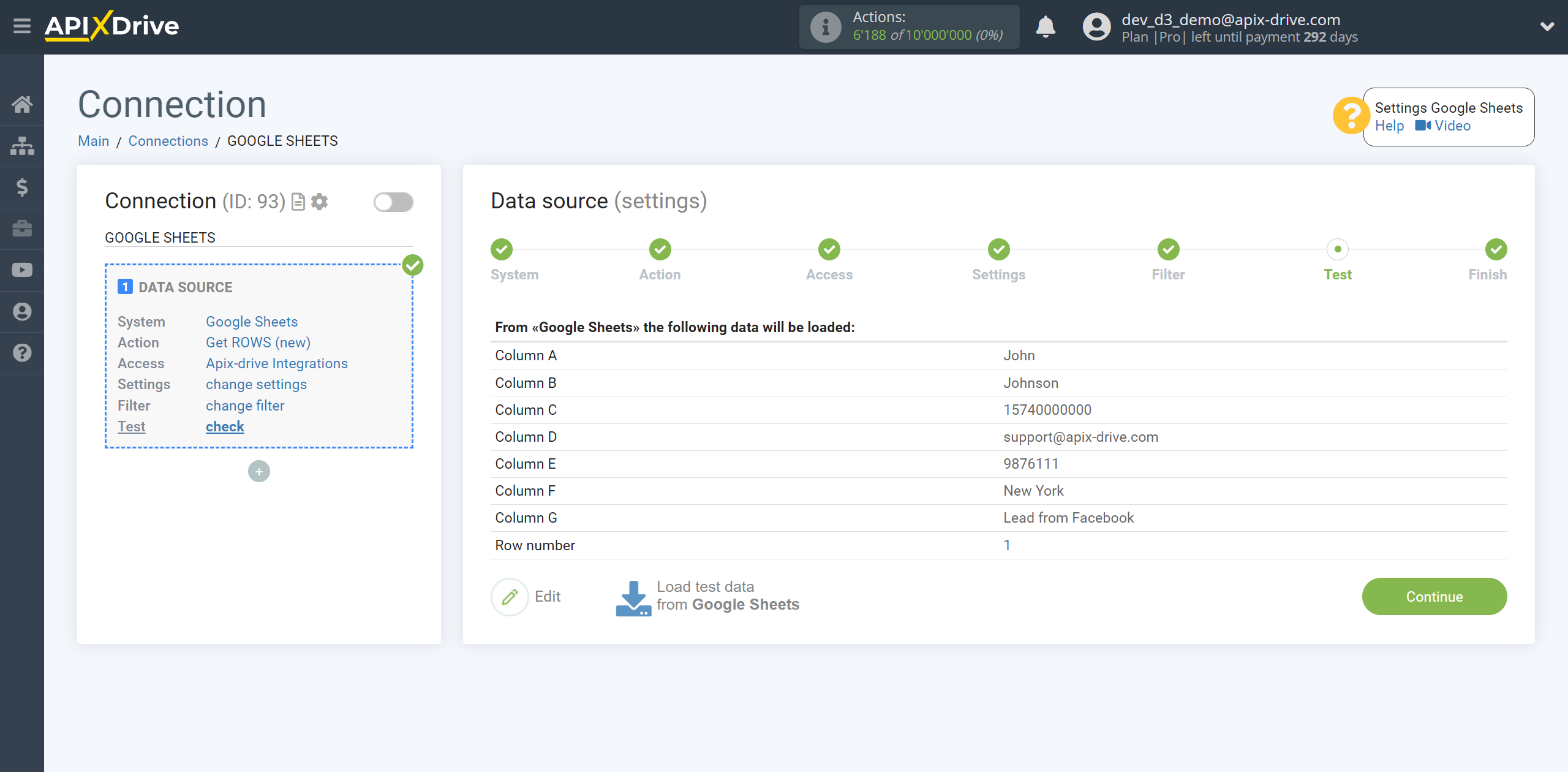
This completes the Data Source setup!
Now we connect the Data Destination section. To do this, click on “+” and select “DATA DESTINATION” from the list.
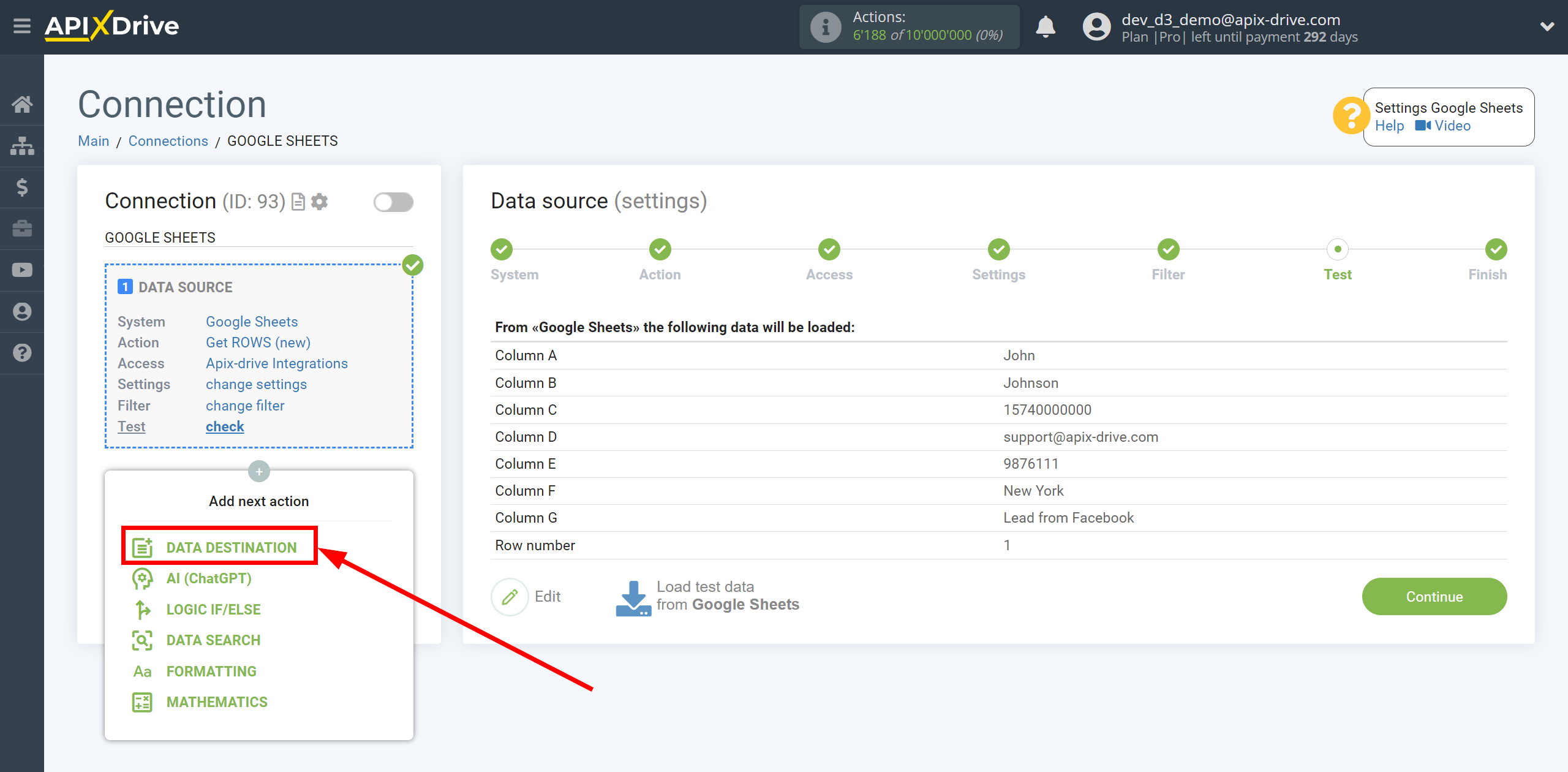
Setting Data Destination: GMAIL
Select the system as Data Destination. In this case, you must specify Gmail (we connect the first Gmail account).
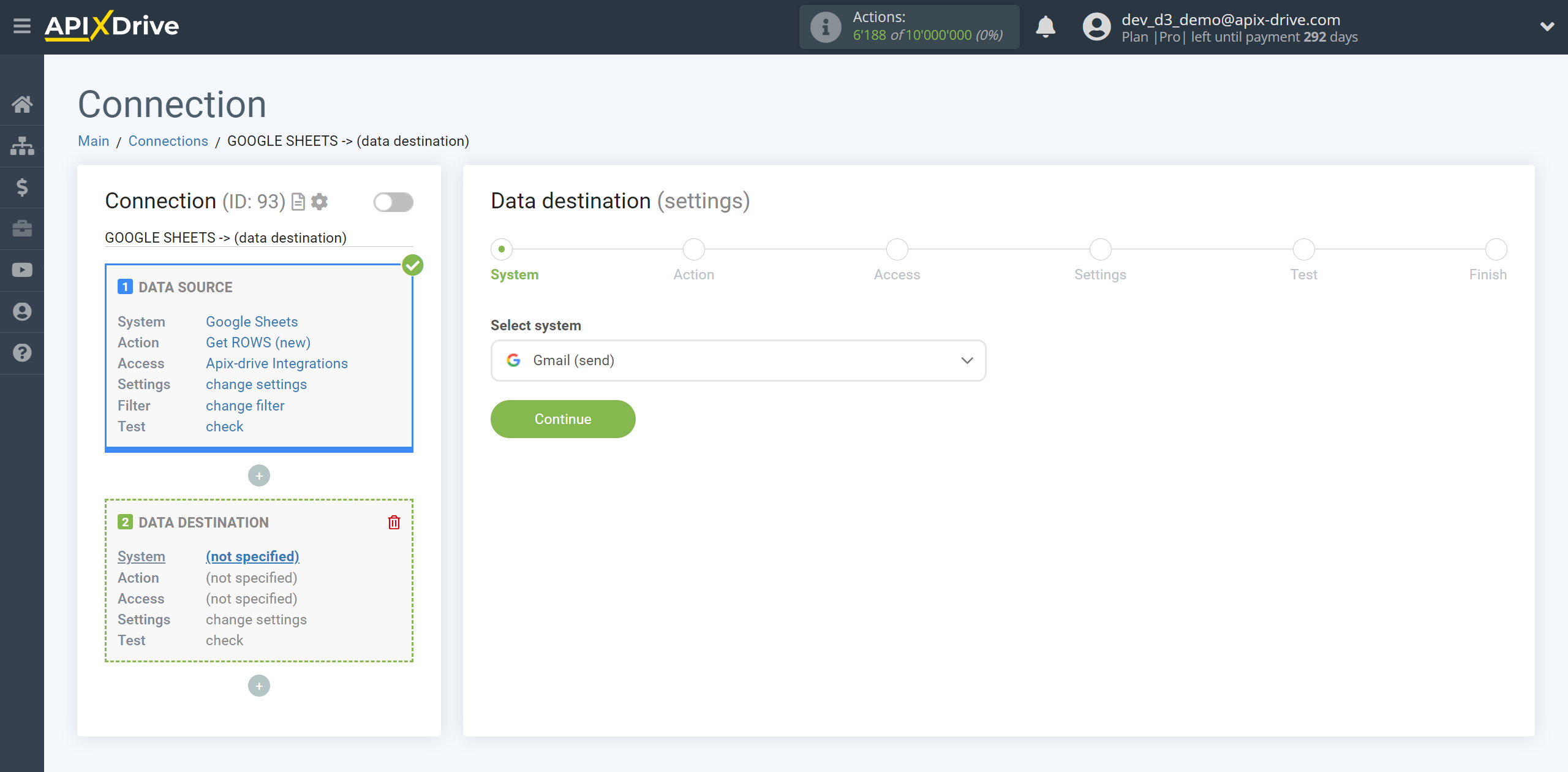
Next, you need to specify the action "Send EMAIL".
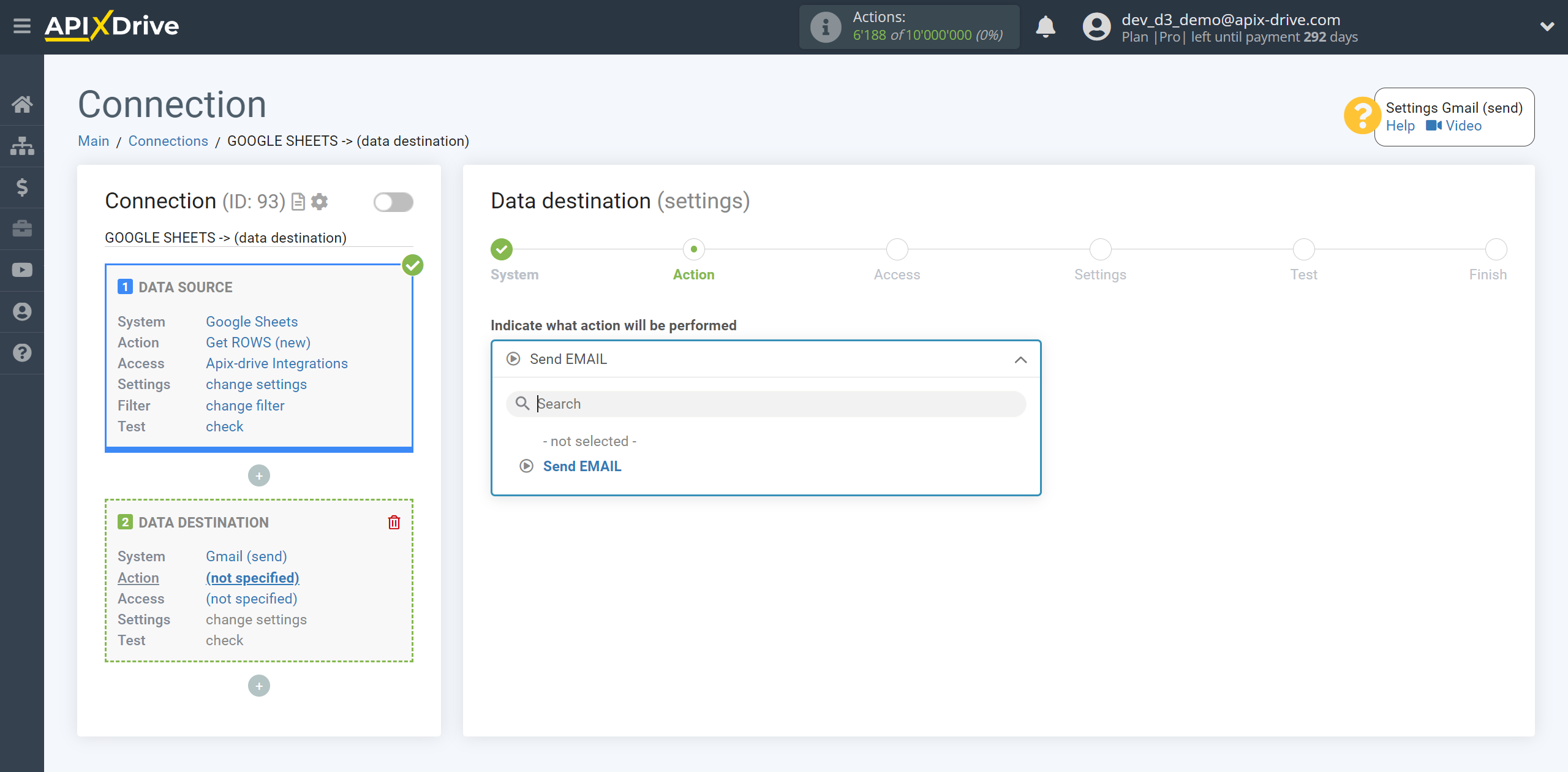
The next step is to select a Gmail account through which emails will be sent.
If there are no accounts connected to the ApiX-Drive system, click “Connect account”.
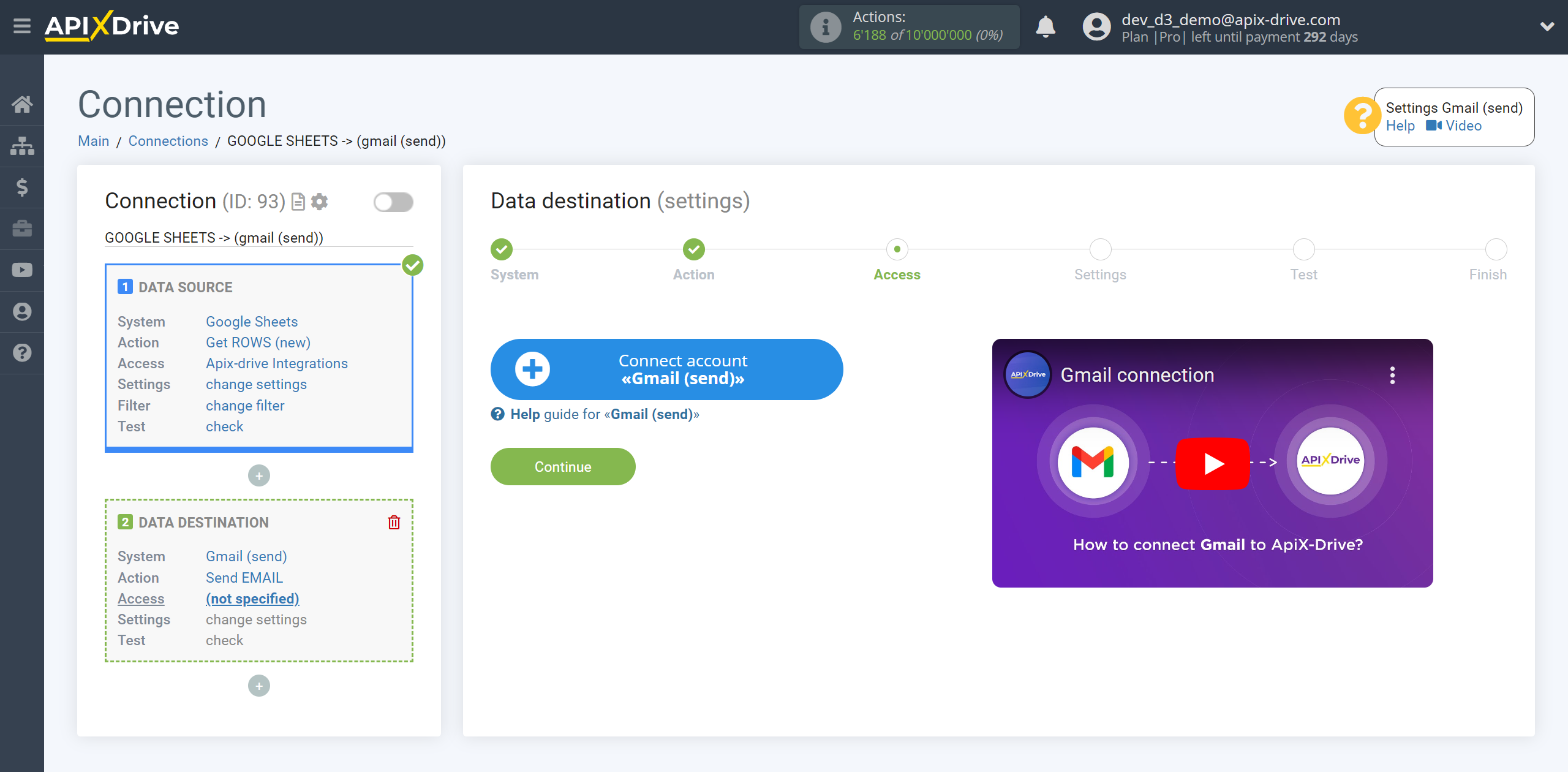
Select the required account and grant ApiX-Drive permission to work with this account.
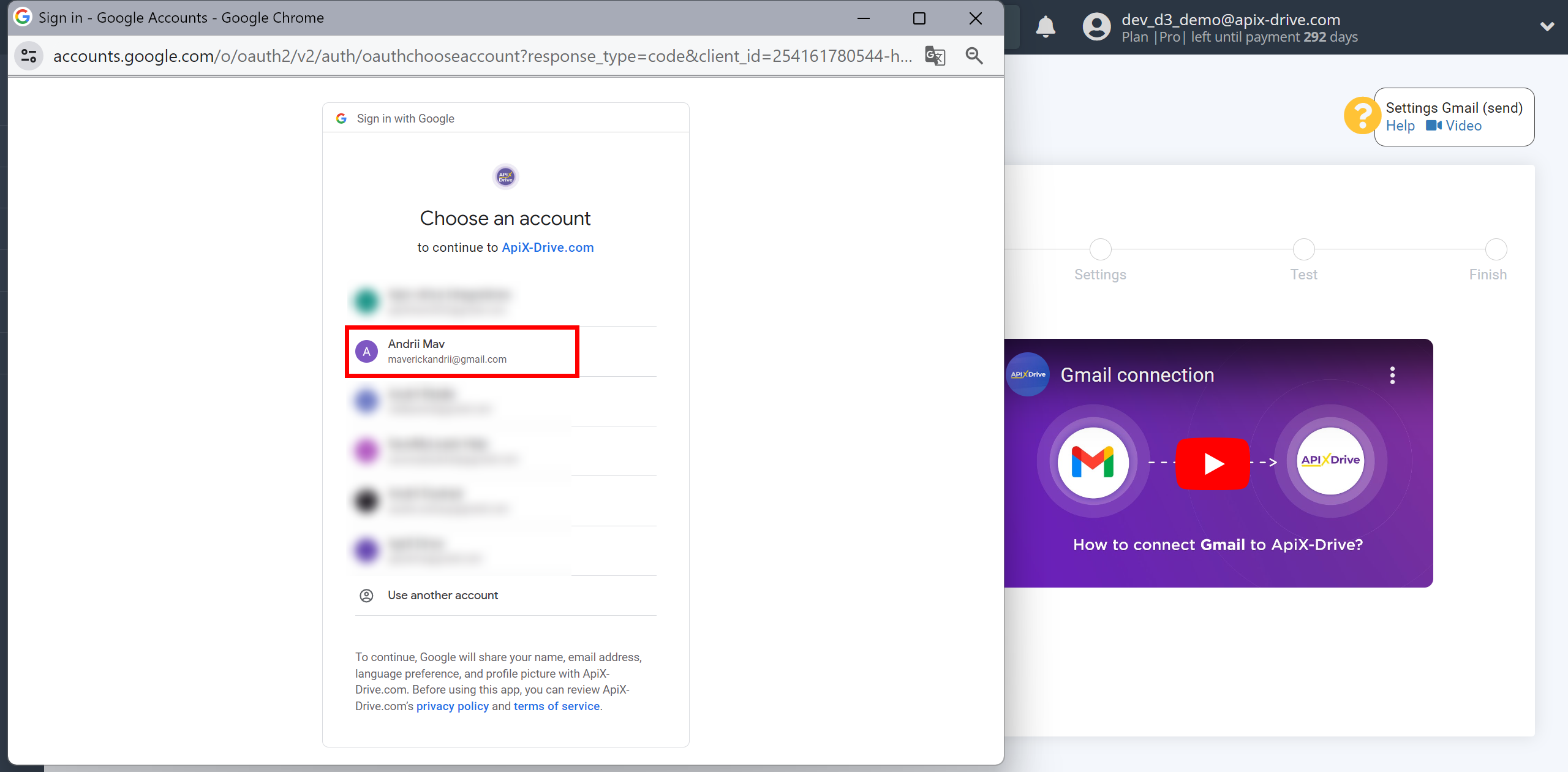
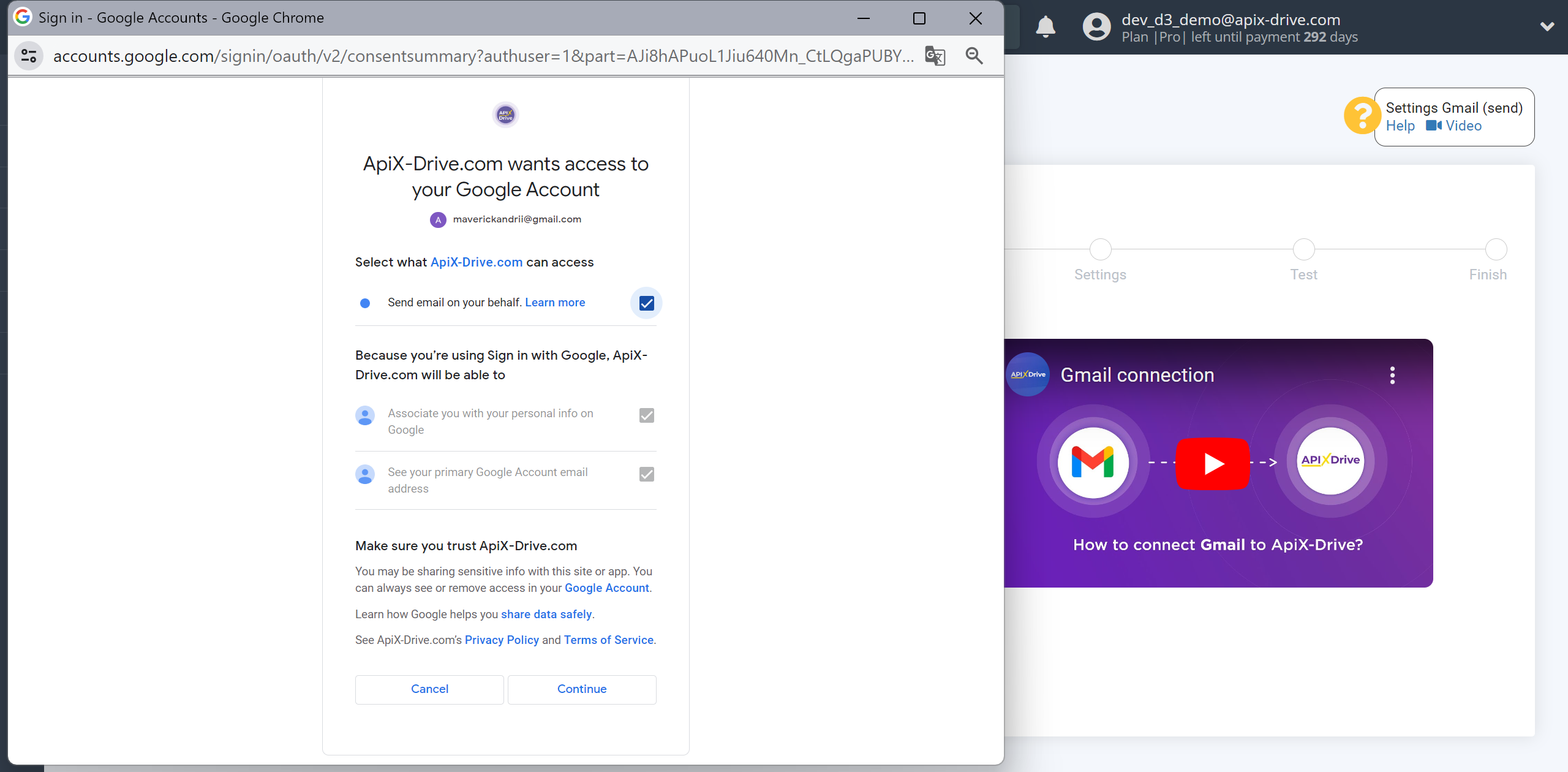
When the connected account appears in the "active accounts" list, select it.
Attention! If your account is on the "inactive accounts" list, check your access to this account!
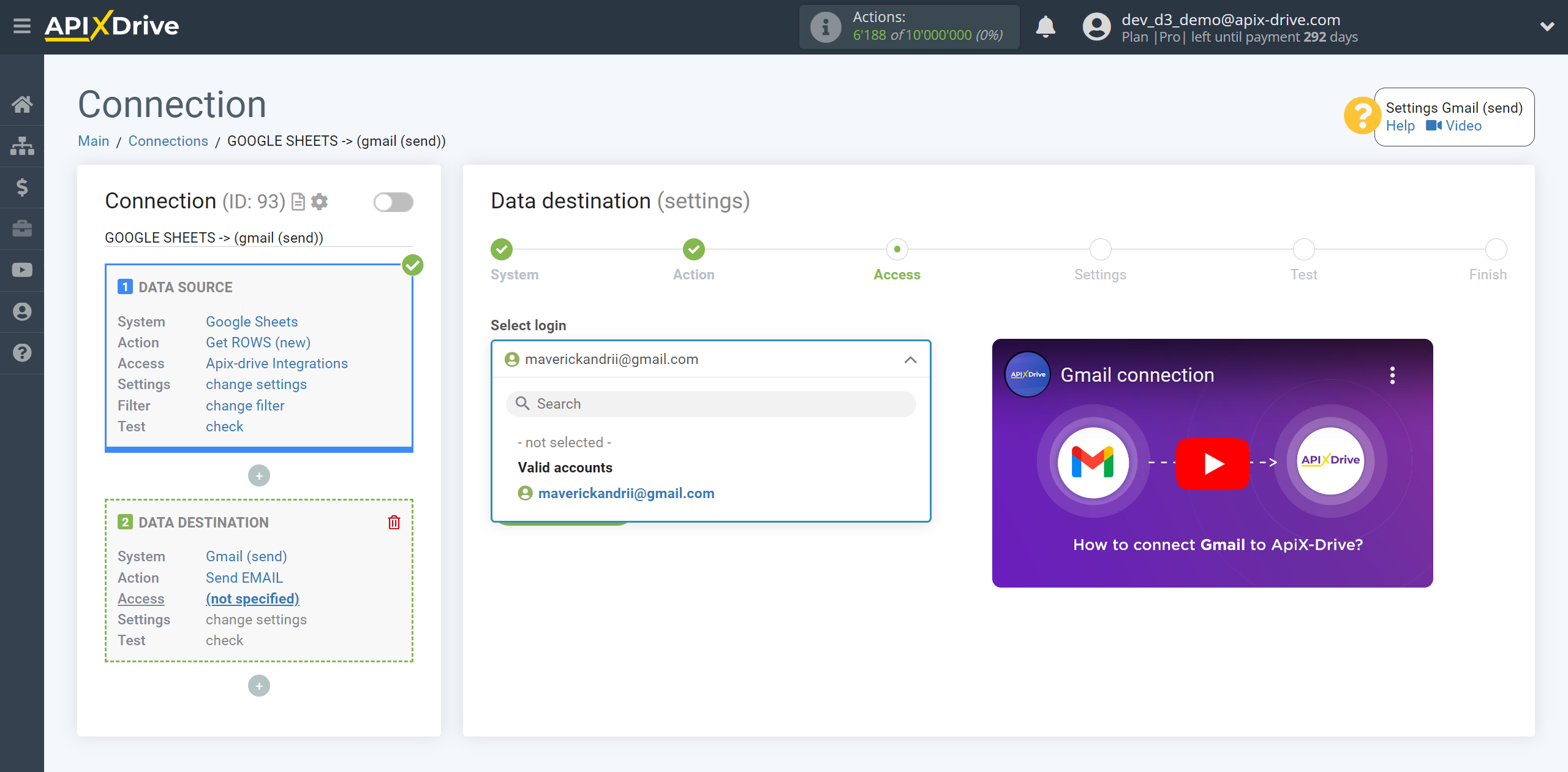
On the left are the Gmail fields into which the data will be transferred. On the right, in the drop-down list, is the available data from the Data Source, in this case, Google Sheets.
Select the required data that is in the Google Sheets cells, click on the parameter and it will be assigned to the selected Gmail field.
Please note that you can use not only Google Sheets variables, but also manually entered data, for example, you can compose the necessary text of a letter by adding it with data from Google Sheets cells.
Click "Continue" when you are finished assigning fields.
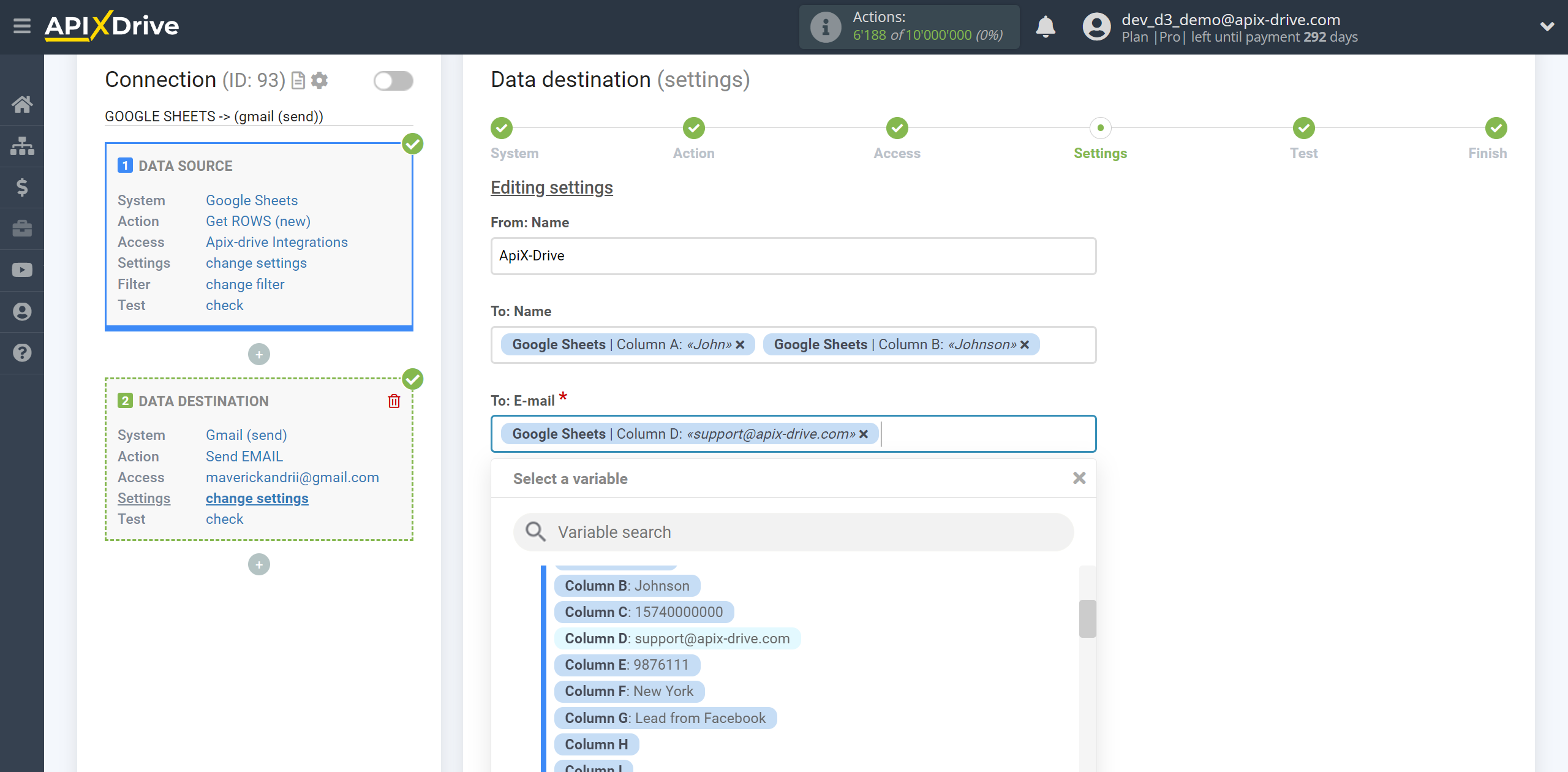
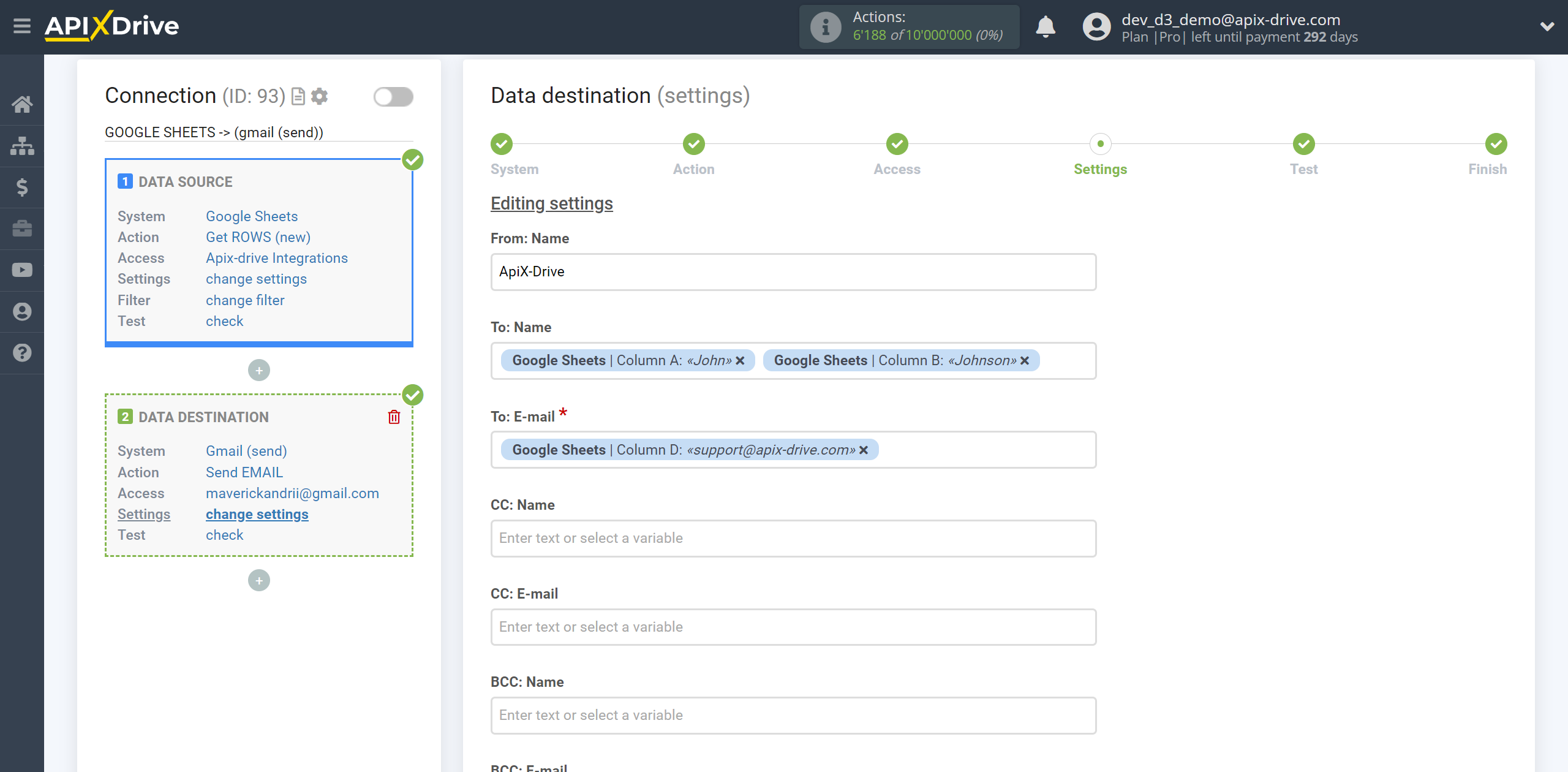
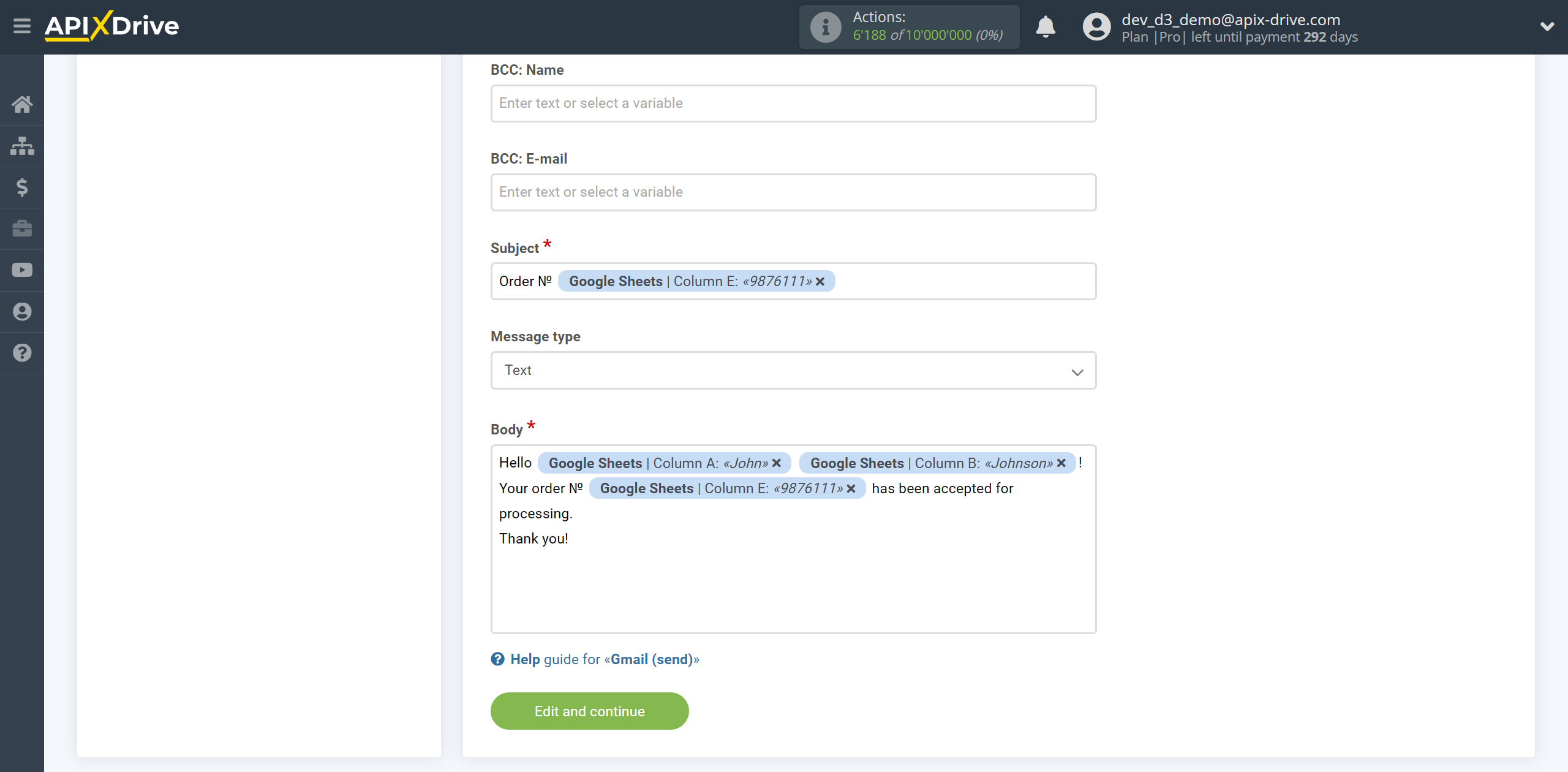
Now you can see the test data of the created email in Gmail.
Click "Send test data to Gmail" and check if the email has arrived and if it looks the way you intended.
If something does not suit you - click "Edit" and go back one step.
Note! In Data Destination systems, two additional fields have been added: “Runtime errors” and “Execution result”, which can be used in the Logic section for conditions. In the example we will use these fields.
- Runtime errors - when assigning this field, the field will contain information about an error if it occurs in the Data Destination system. If there is no error and the data transfer is successful, this field will remain empty.
- Execution result - if the conditions are met, this field will return a logical value, 1 or 0, where:
1 - means that the data transfer in the Data Destination section was Successful (for example: successfully added a new rows in Google Sheets, created a lead/contact/deal in the CRM system or sent a message to Slack)
0 - means that the data transfer in the Data Destination section was not completed, that is, it was Unsuccessful (for example: an error occurred, a contact for update was not found, a lead/deal/contact was not created in the CRM system, a message/email was not sent)
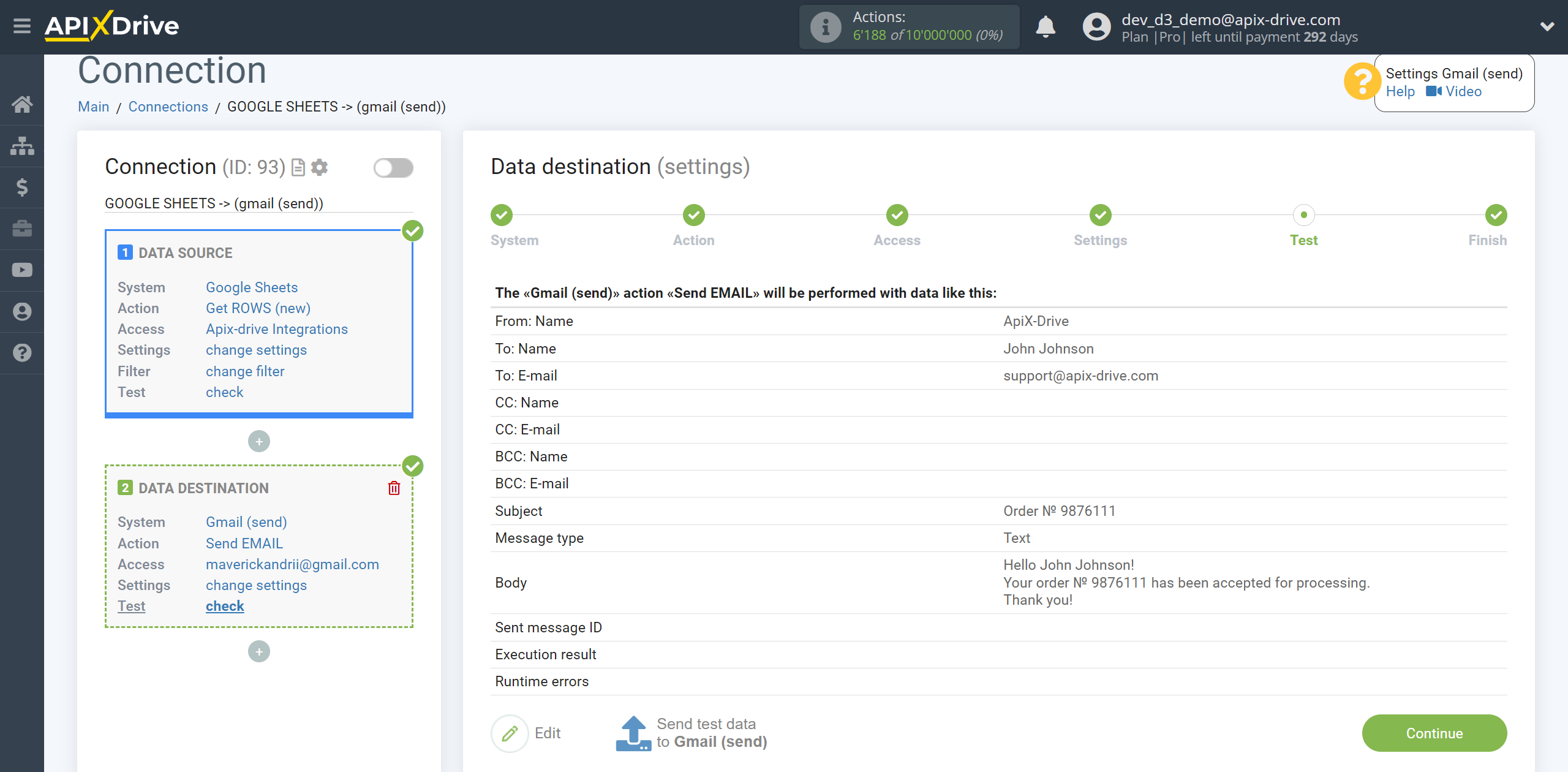
This completes the setup for Data Destination from your first Gmail account!
Now we connect the additional Logic section. To do this, click on “+” and select “LOGIC If/Else” from the list.
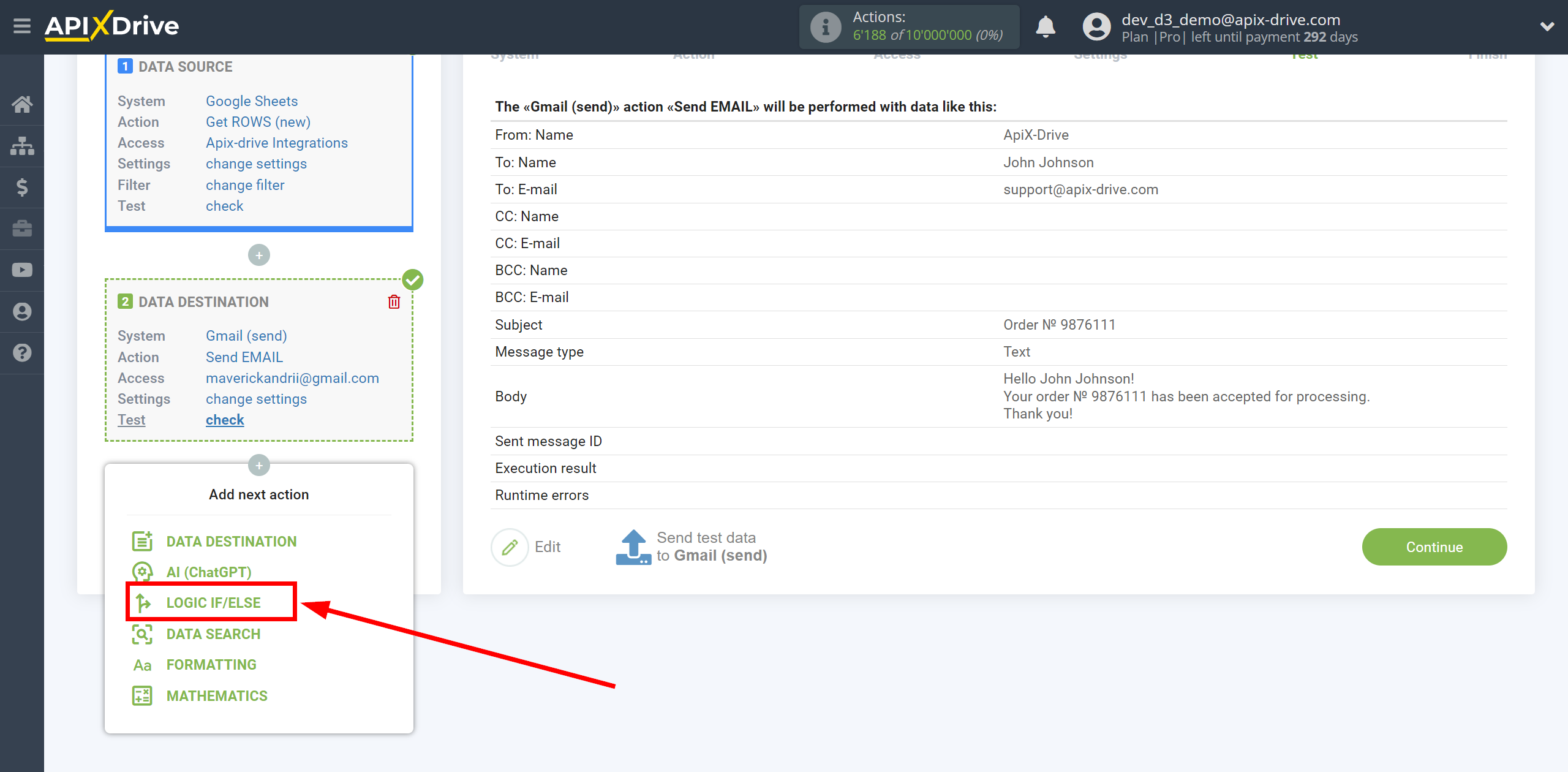
Setting LOGIC If/Else sections
Connecting the first section of Logic If/Else
In the "Logical action" field, select the "If" action.
In the "Your comment" field, you can provide additional information or an explanation for a specific condition for the If action.
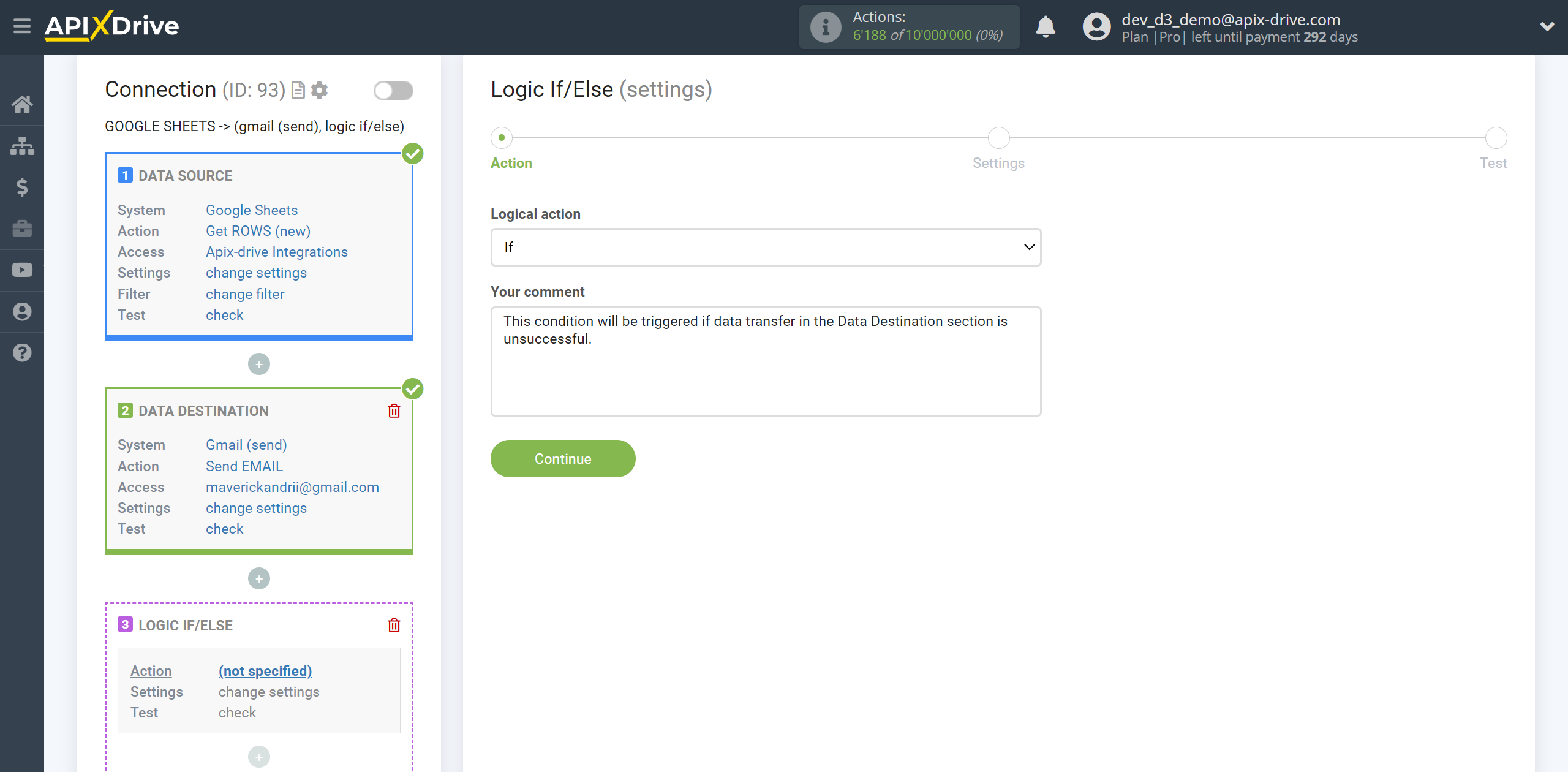
Next, you need to configure a specific condition, when fulfilled, data will be transferred in the Logic section.
- Parameter - this field contains all the fields from the previous Data Source and Data Destination sections that can be used to configure conditions. In our example, we use the field from the Data Destination "Execution Result".
- Operation - in this field you must select the action that will be applied for a specific condition. In this example, we select "Equals".
- Value - in this field you must select “Successfully” if you want the condition to be met when the Data Destination section is successfully triggered, or select “Unsuccessful” if an error occurs in the Data Destination section or for some other reason the data is not transmitted. In this case we select "Unsuccessful".
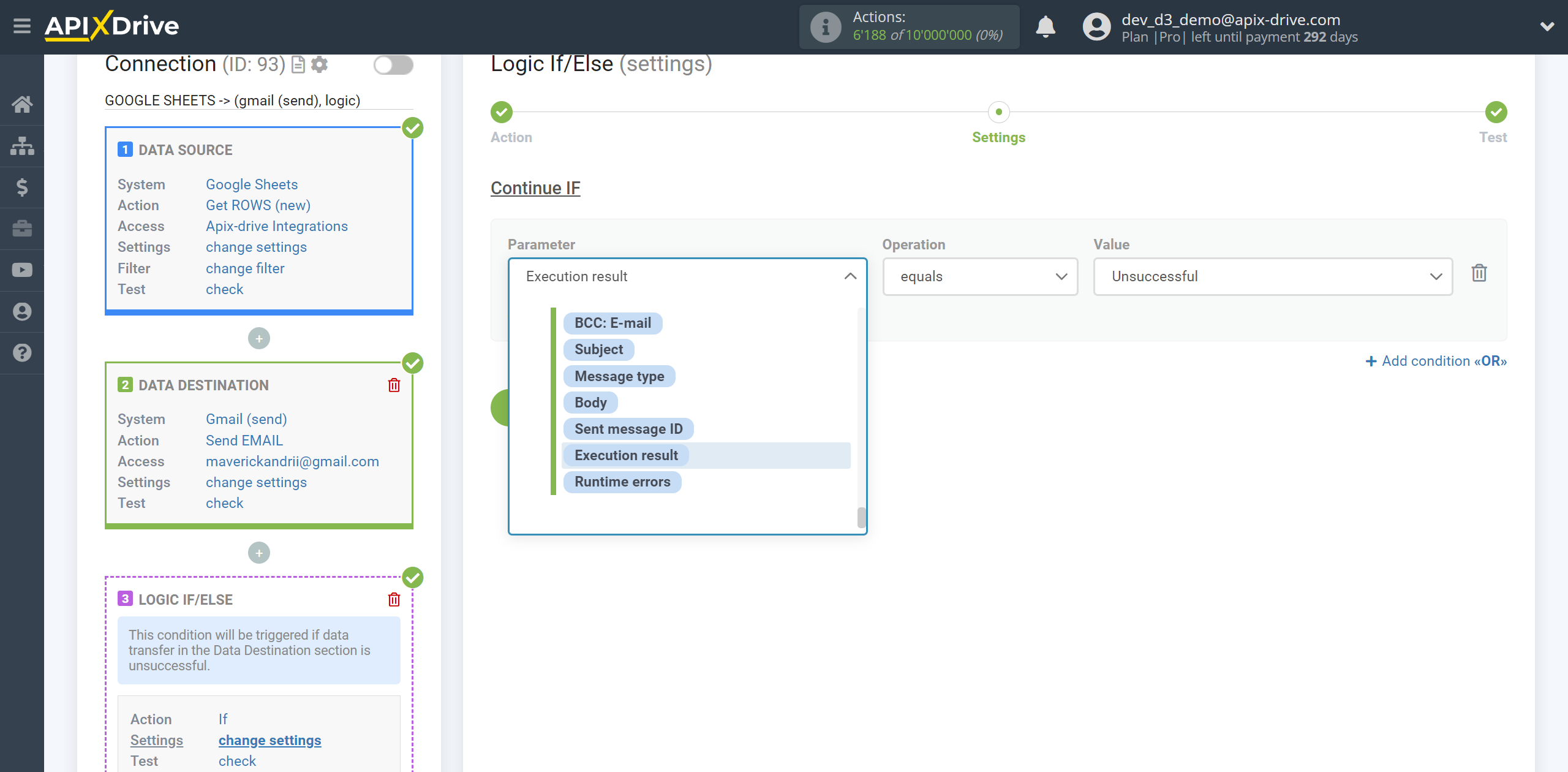
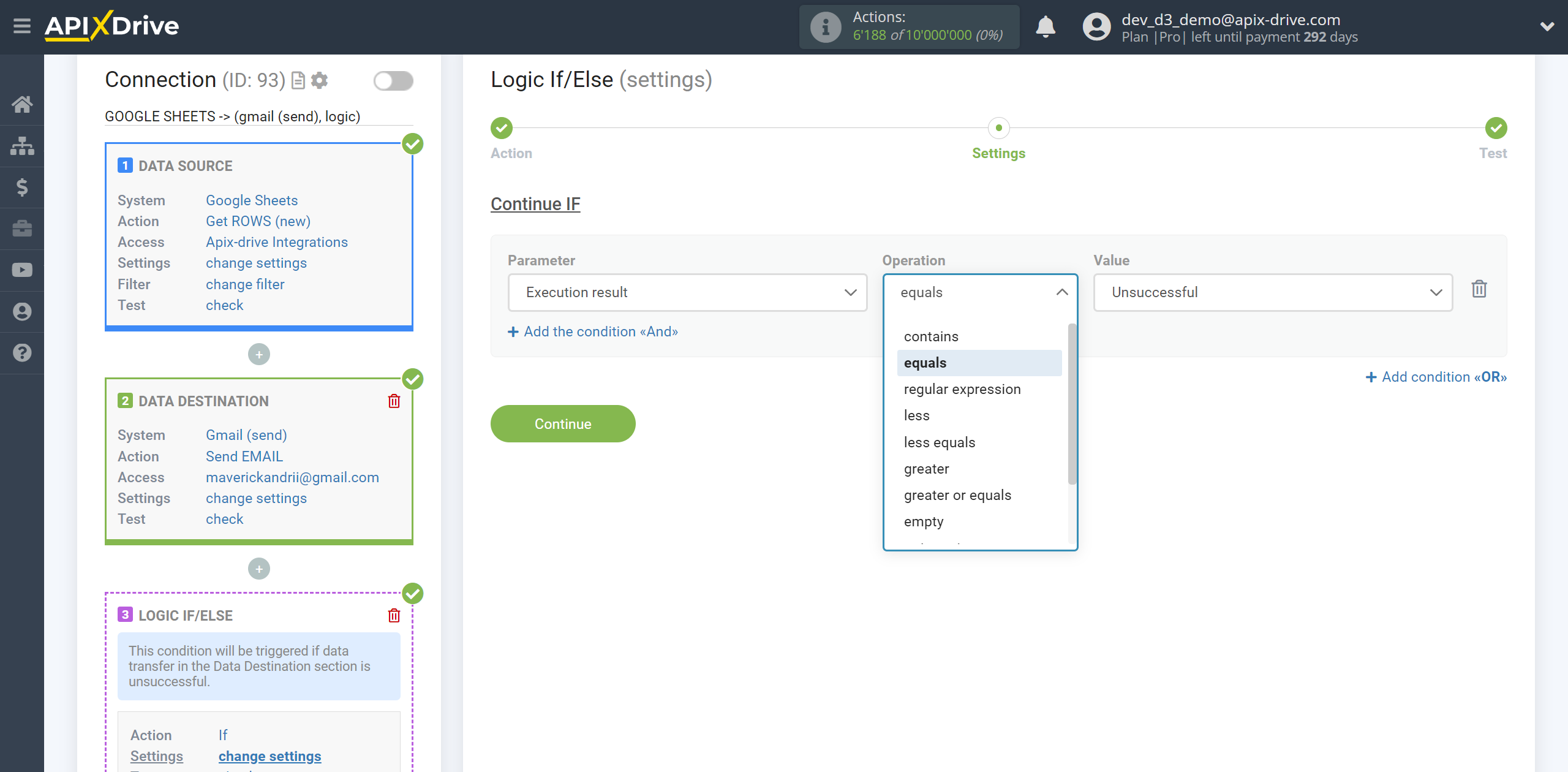
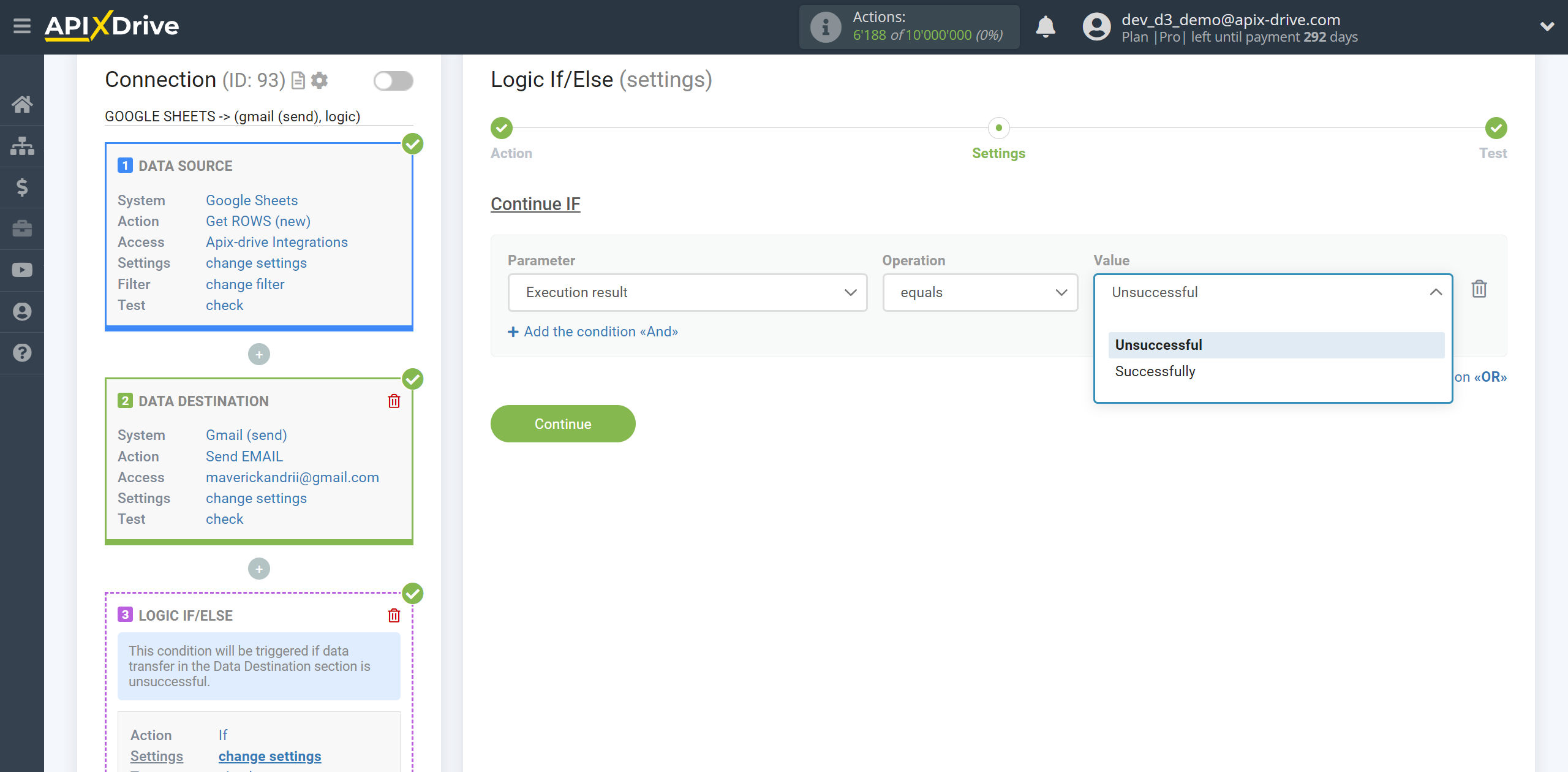
Also, you can add additional conditions using the operators "AND", "OR", if you need to specify several parameters in one condition. In this case, this is not necessary, so click “Continue”.
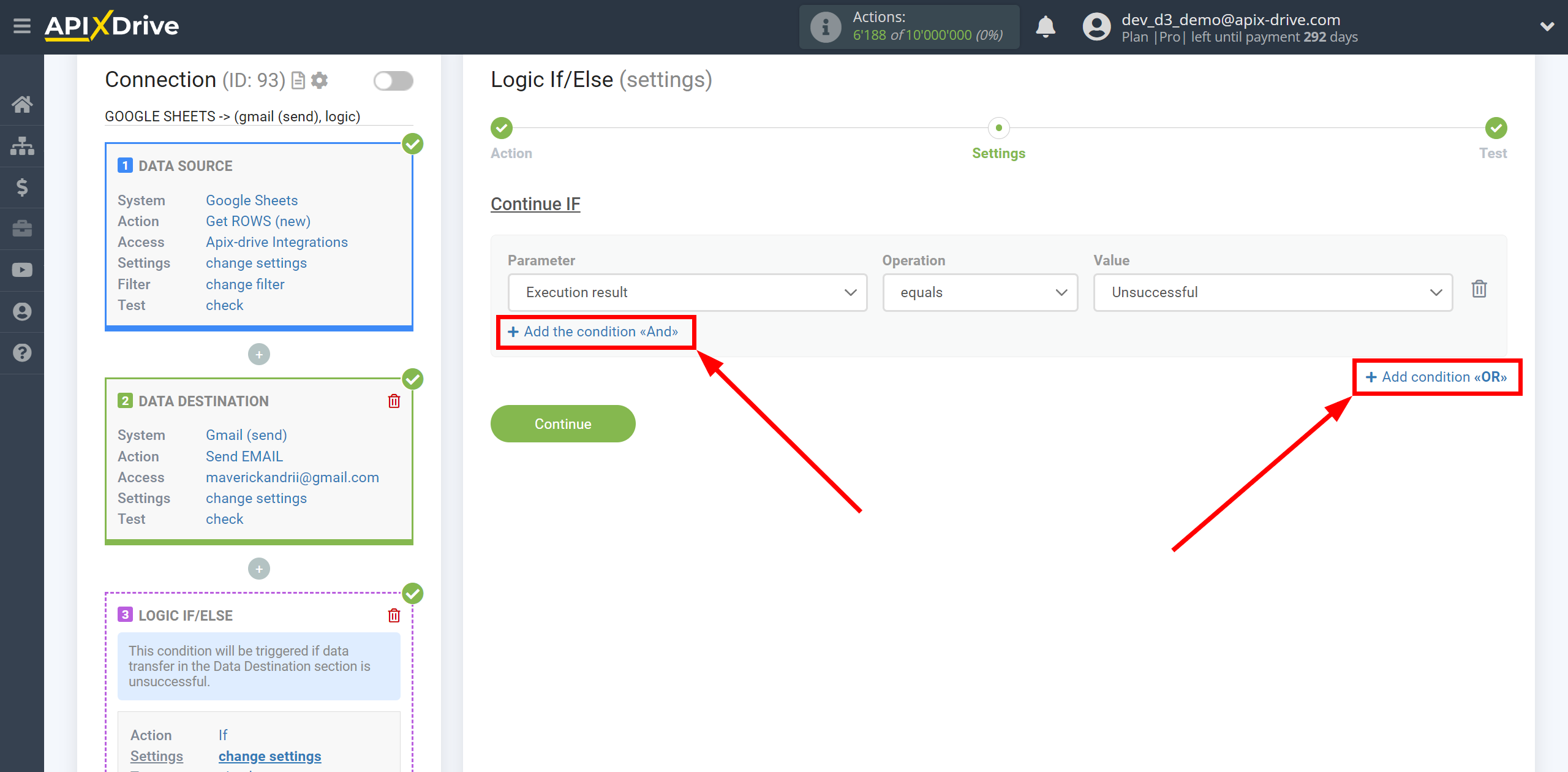
At the Test stage, you will see Logical result = 1 - this means that the setting of the action If for a specific condition is satisfied.
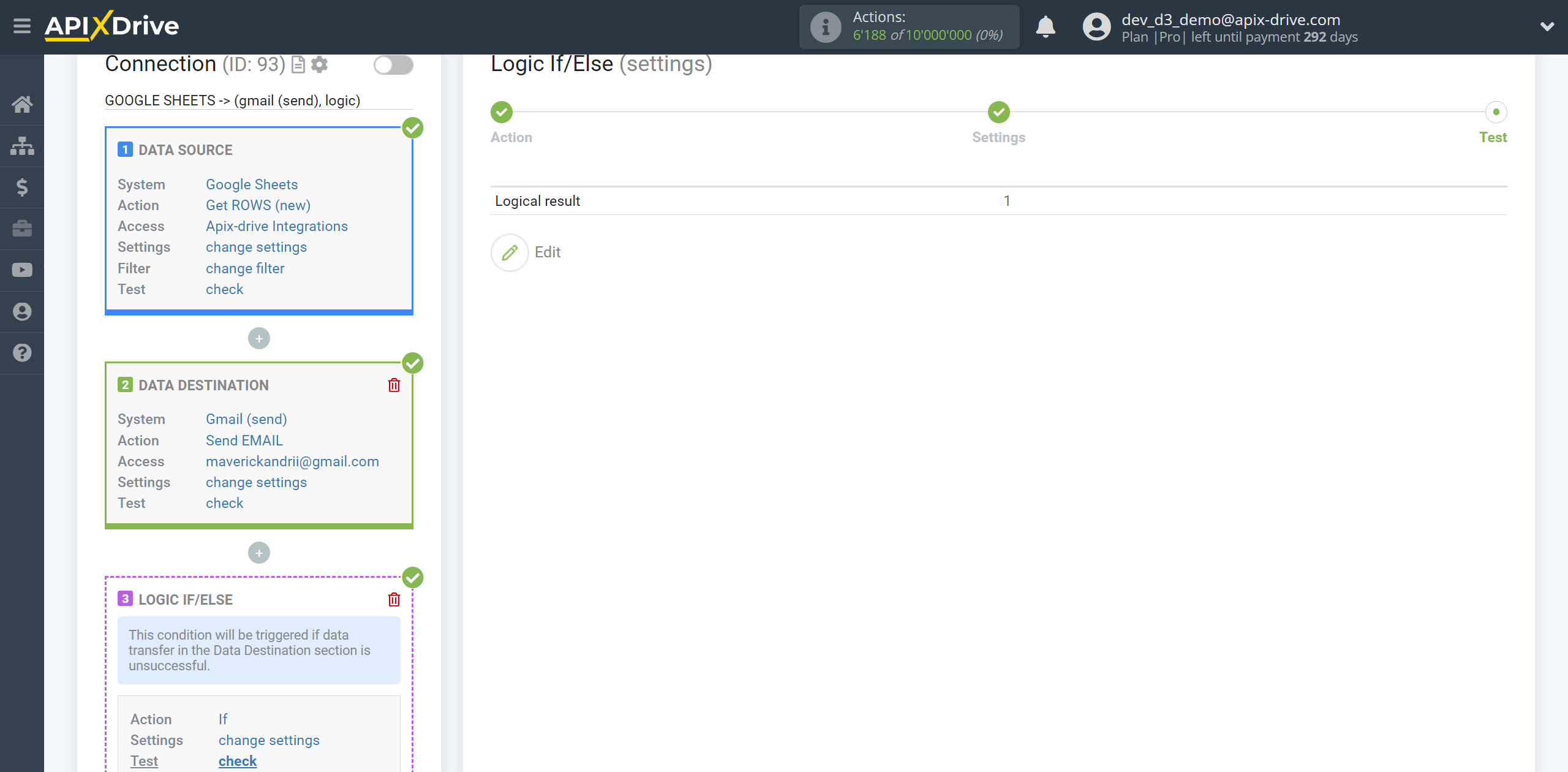
Next, you need to indicate what action the Logic section will perform,
when certain conditions are met, that is, what is the next data transfer algorithm and to which system.
In this example we use the DATA DESTINATION section.
Inside the Logic section we connect the Data Destination system. To do this, click on “+” and select “DATA DESTINATION” from the list.
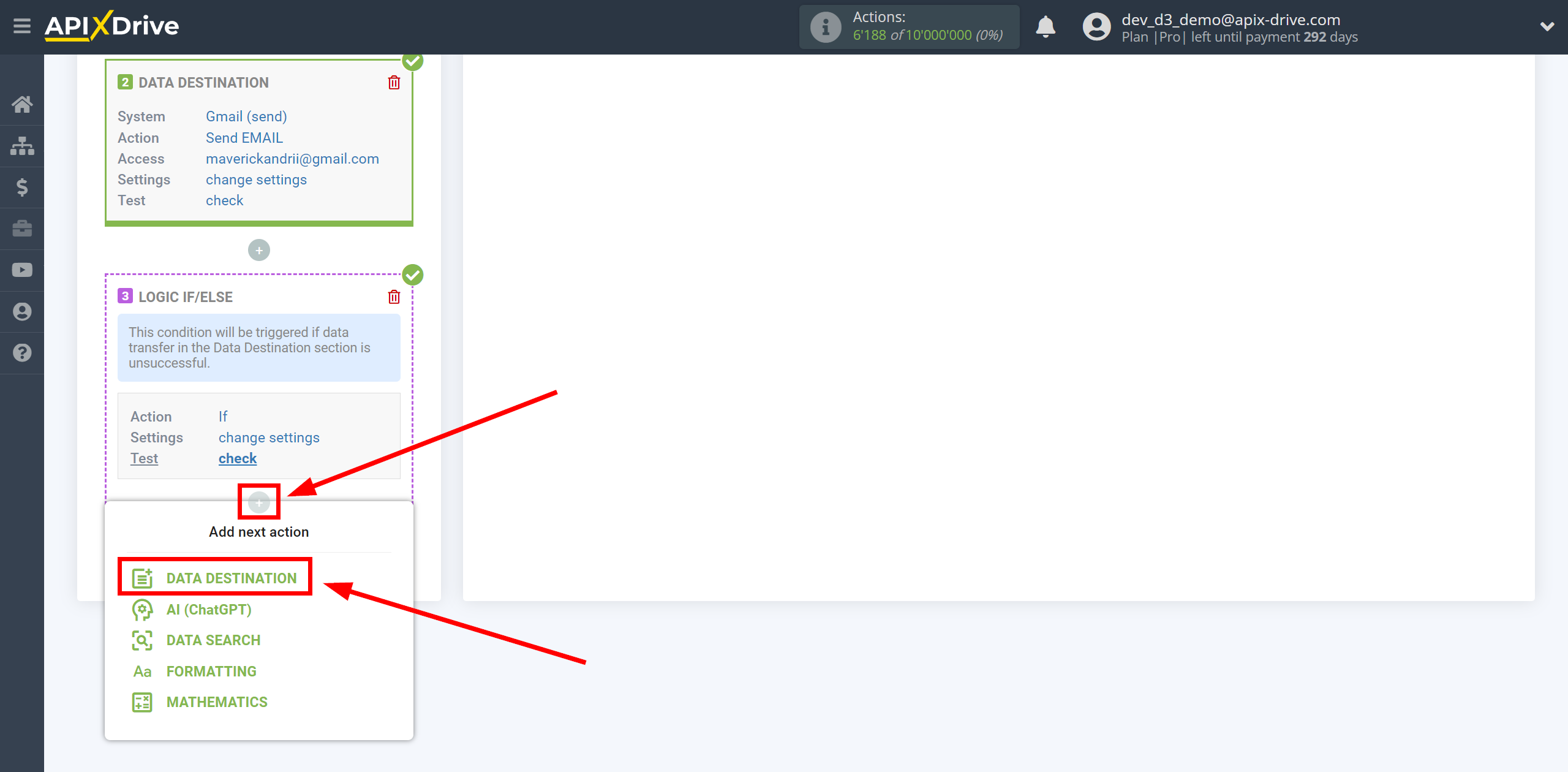
Setting Data DESTINATION inside the LOGIC If/Else section: Gmail
Select the system as Data Destination. In this example, we use Gmail (we connect a second Gmail account).
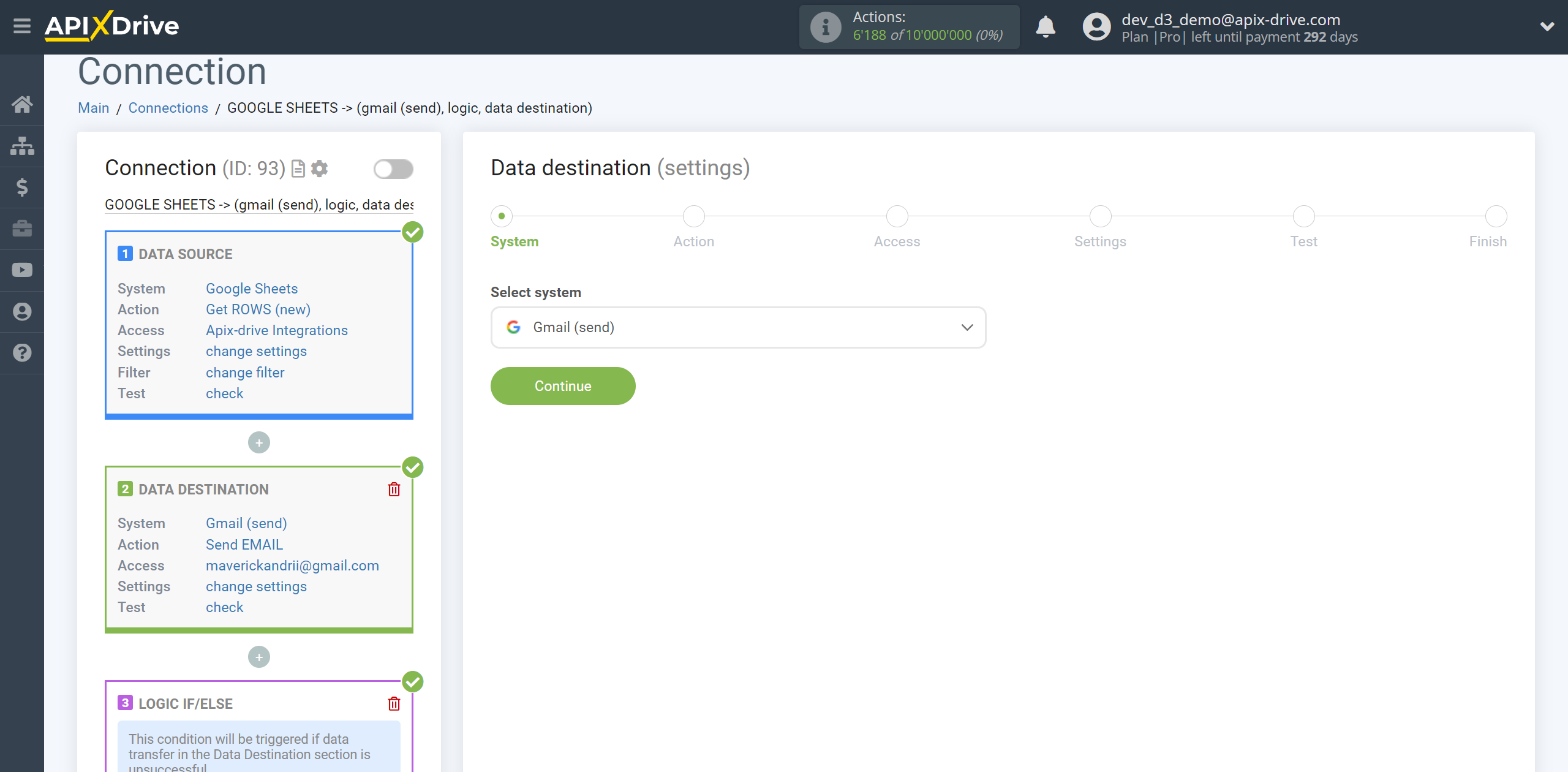
Next, you need to specify the action "Send EMAIL".
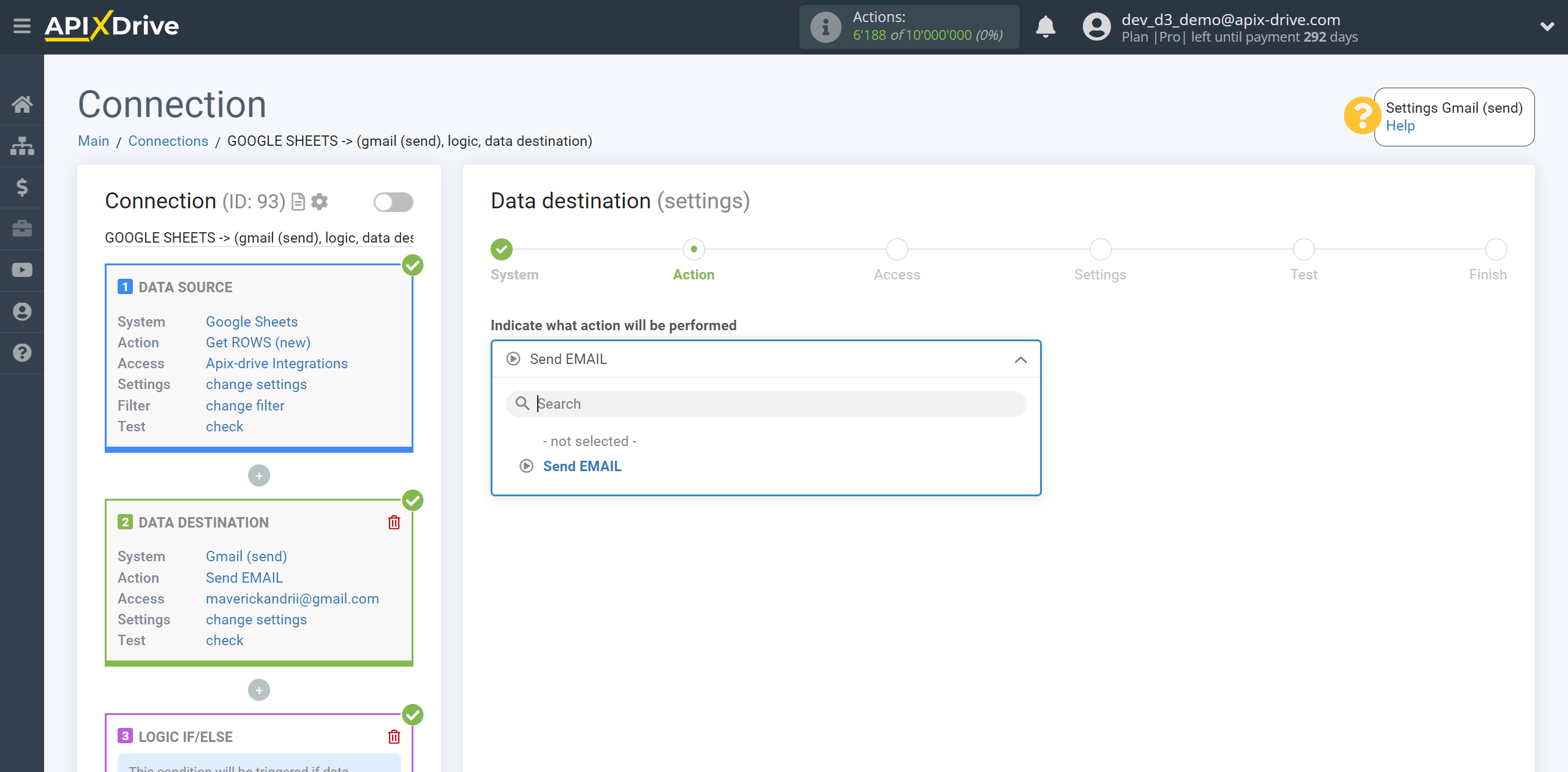
The next step is to select a Gmail account through which emails will be sent. Here we connect the second Gmail account to the ApiX-Drive system, to do this, click “Connect account” and repeat the same steps described when connecting Gmail as the first Data Destination.
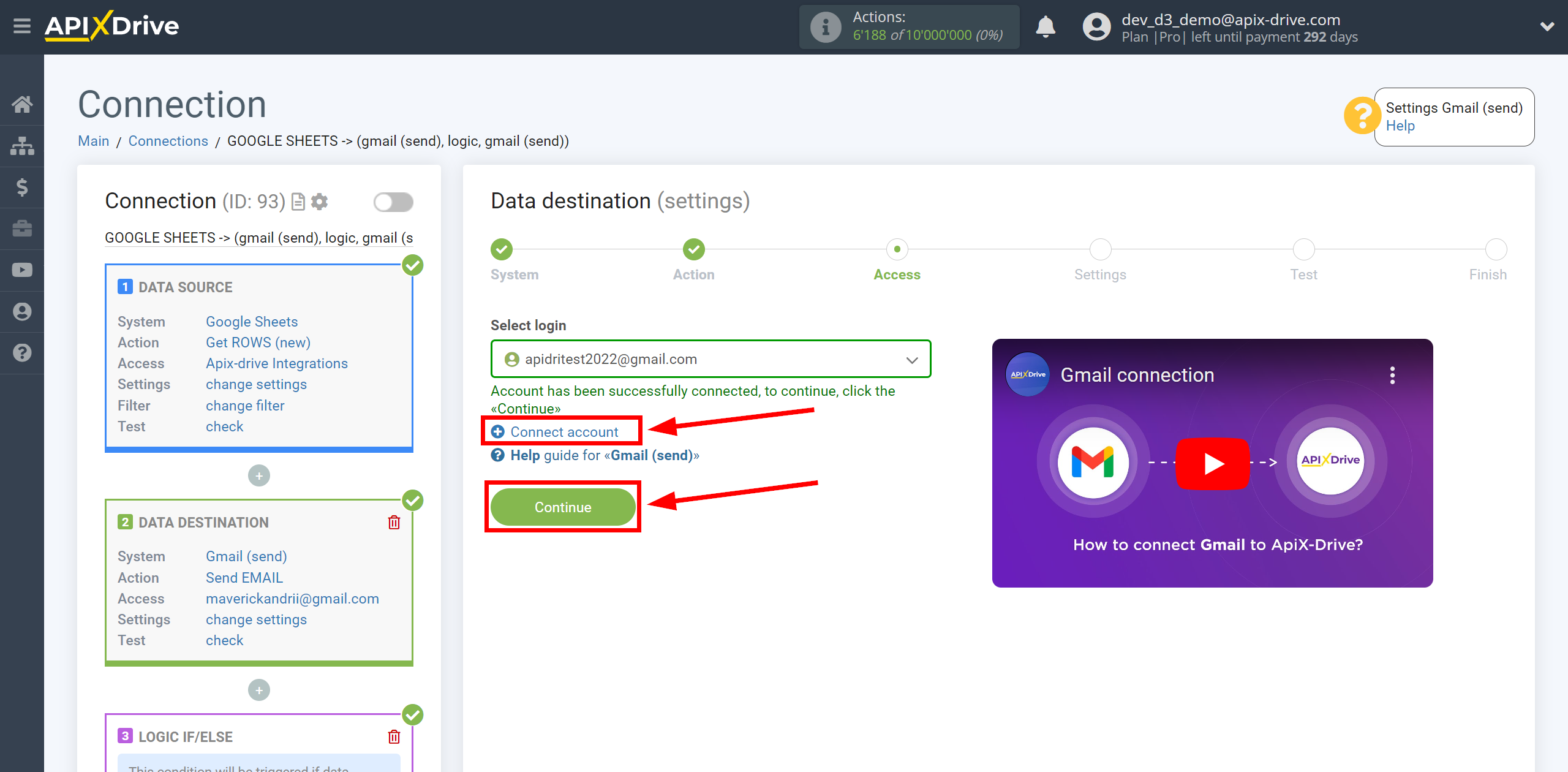
On the left are the Gmail fields into which the data will be transferred. On the right, in the drop-down list, is the available data from the data source, in this case, Google Sheets.
Select the required data that is in the Google Sheets cells, click on the parameter and it will be assigned to the selected Gmail field.
Please note that you can use not only Google Sheets variables, but also manually entered data, for example, you can compose the necessary text of a letter by adding it with data from Google Sheets cells.
Click "Continue" when you are finished assigning fields.
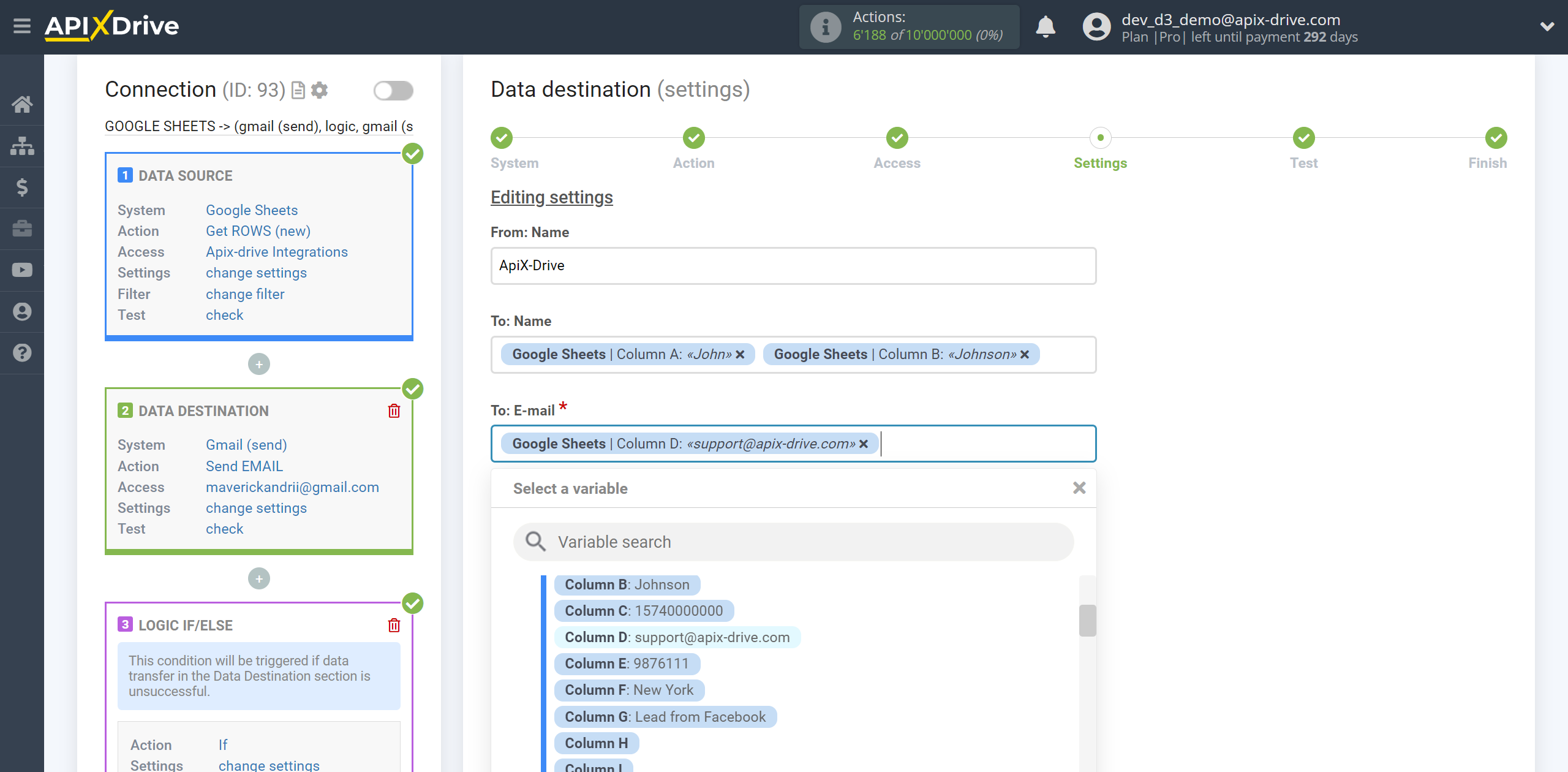
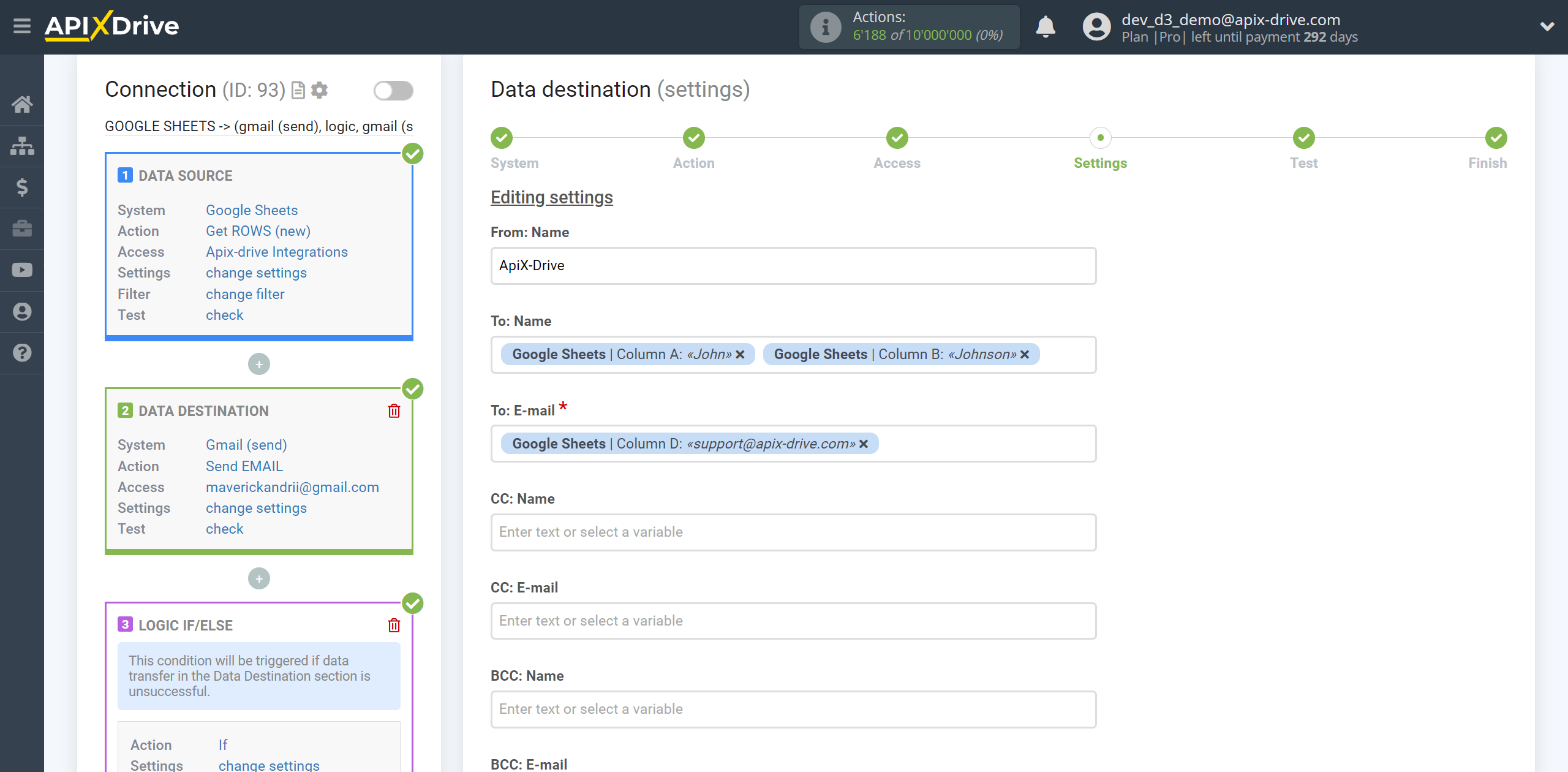
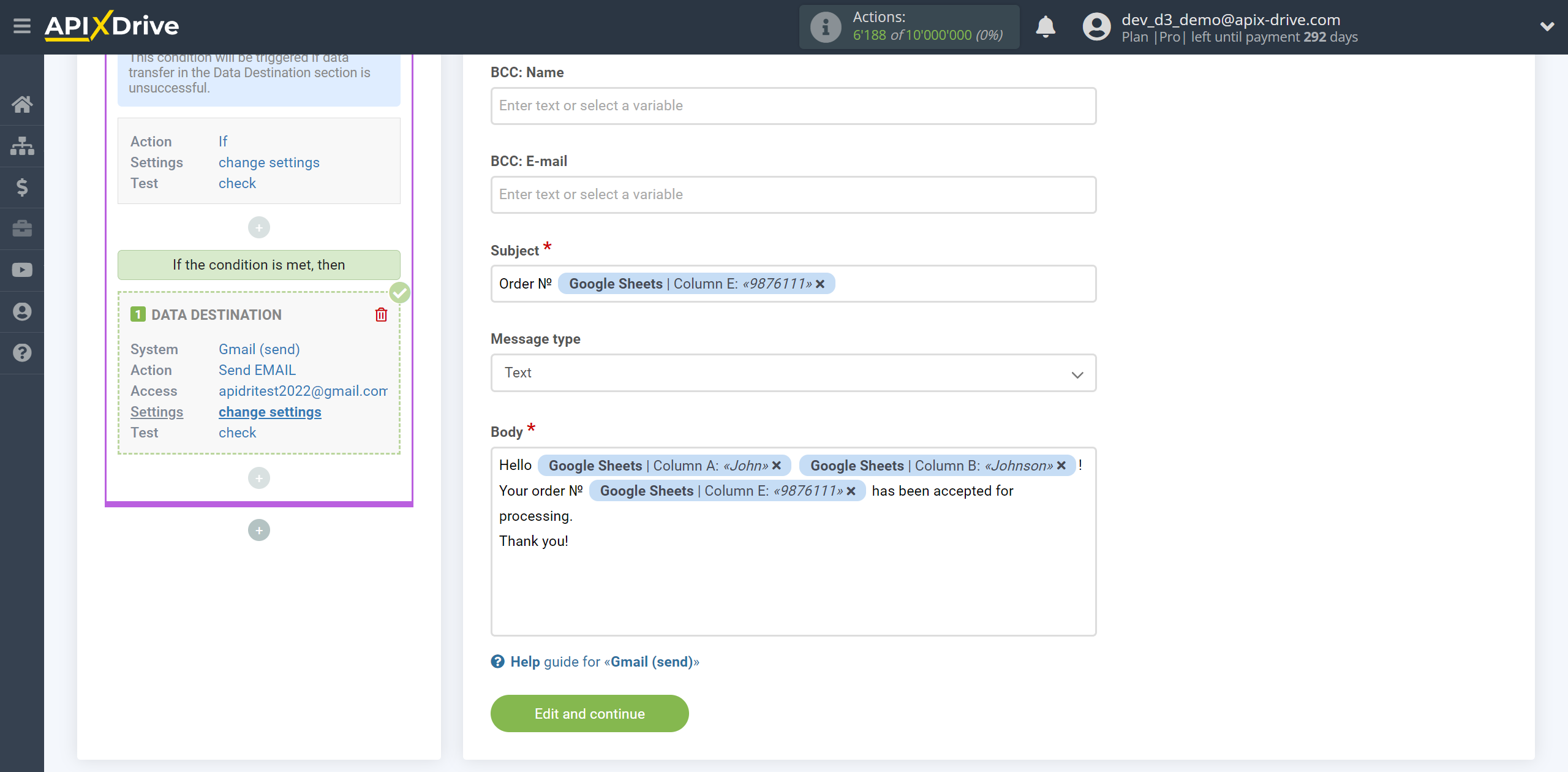
Now you can see the test data of the created email in Gmail.
Click "Send test data to Gmail" and check if the letter arrived and if it looks the way you intended.
If you are not satisfied with something, click “Edit” and go back a step.
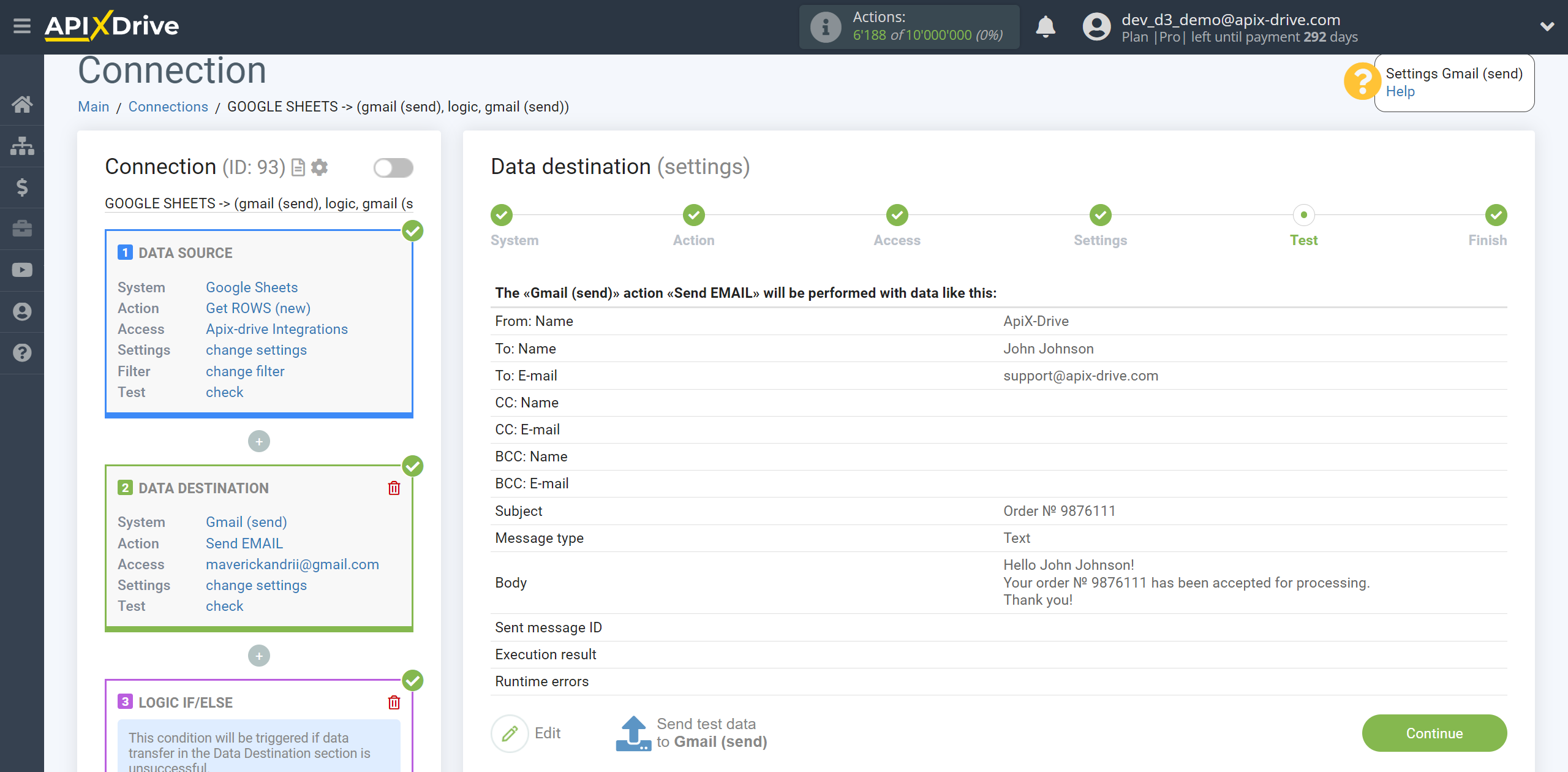
This completes the setup for Data Destination from a second Gmail account!
Now you need to add another Logic section and make another condition setting. To do this, click on “+” and select “LOGIC If\Else” from the list.
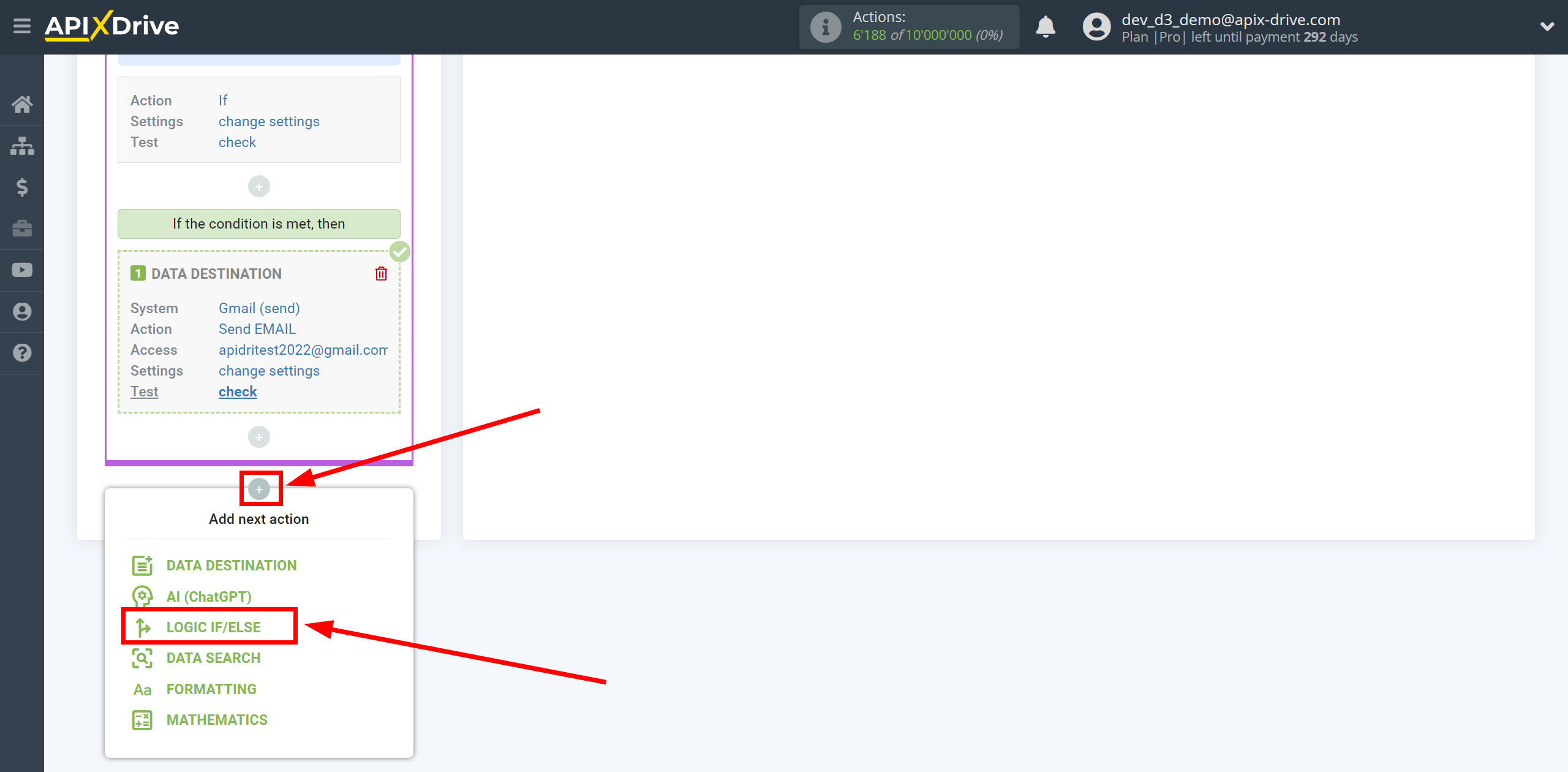
Connecting the second section of Logic If/Else
In the "Logical action" field, select the "If" action.
In the "Your comment" field, you can provide additional information or an explanation for a specific condition for the If action.
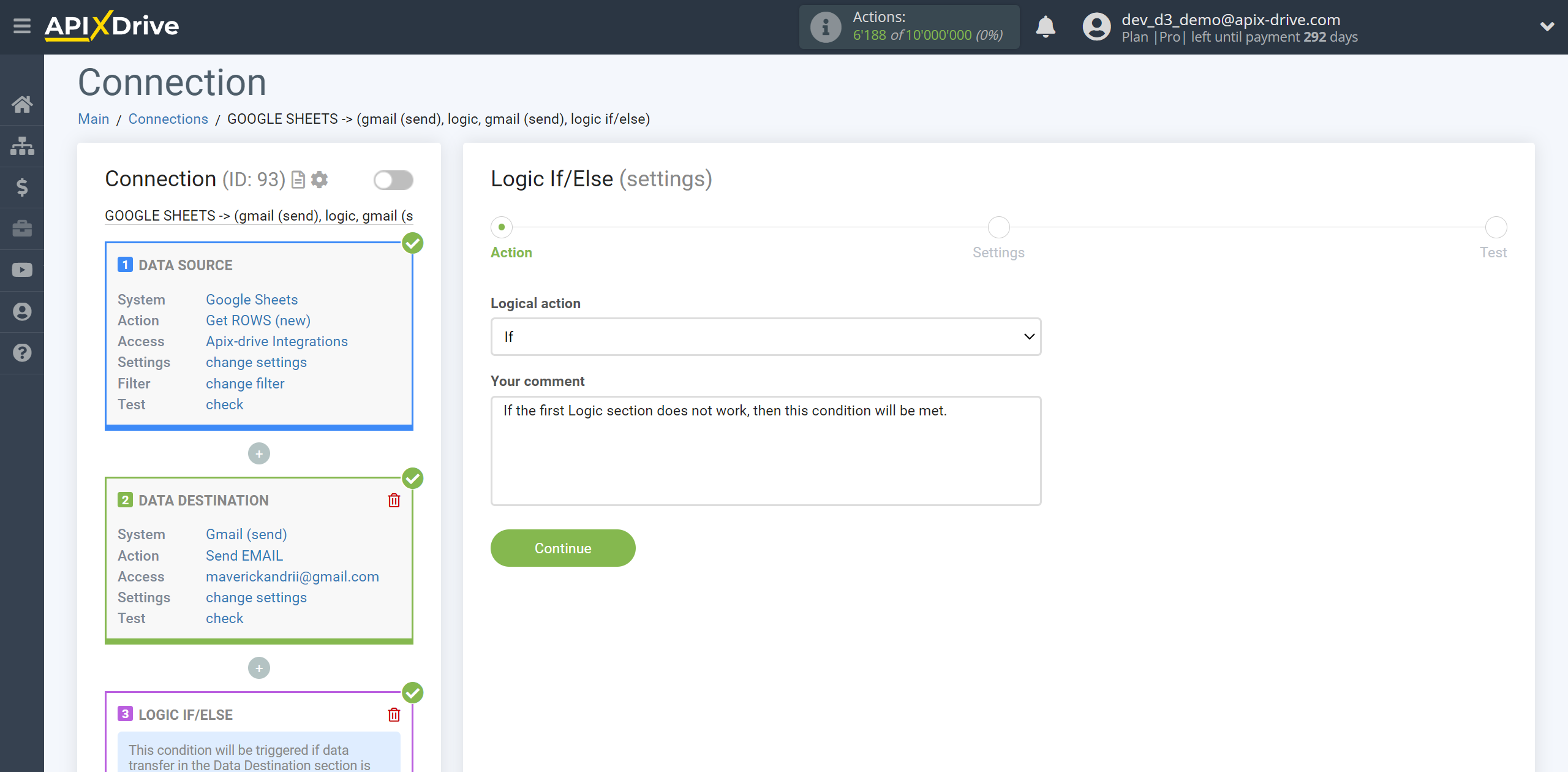
Next, you need to configure a specific condition, when fulfilled, data will be transferred in the Logic section.
- Parameter - this field contains all the fields from the previous Data Source and Data Destination sections that can be used to configure conditions. In our example, we use the field from the Data Destination "Execution Result".
- Operation - in this field you must select the action that will be applied for a specific condition. In this example, we select "Equals".
- Value - in this field you must select “Successfully” if you want the condition to be met when the Data Destination section is successfully triggered, or select “Unsuccessful” if an error occurs in the Data Destination section or for some other reason the data is not transmitted. In this case we select "Unsuccessful".
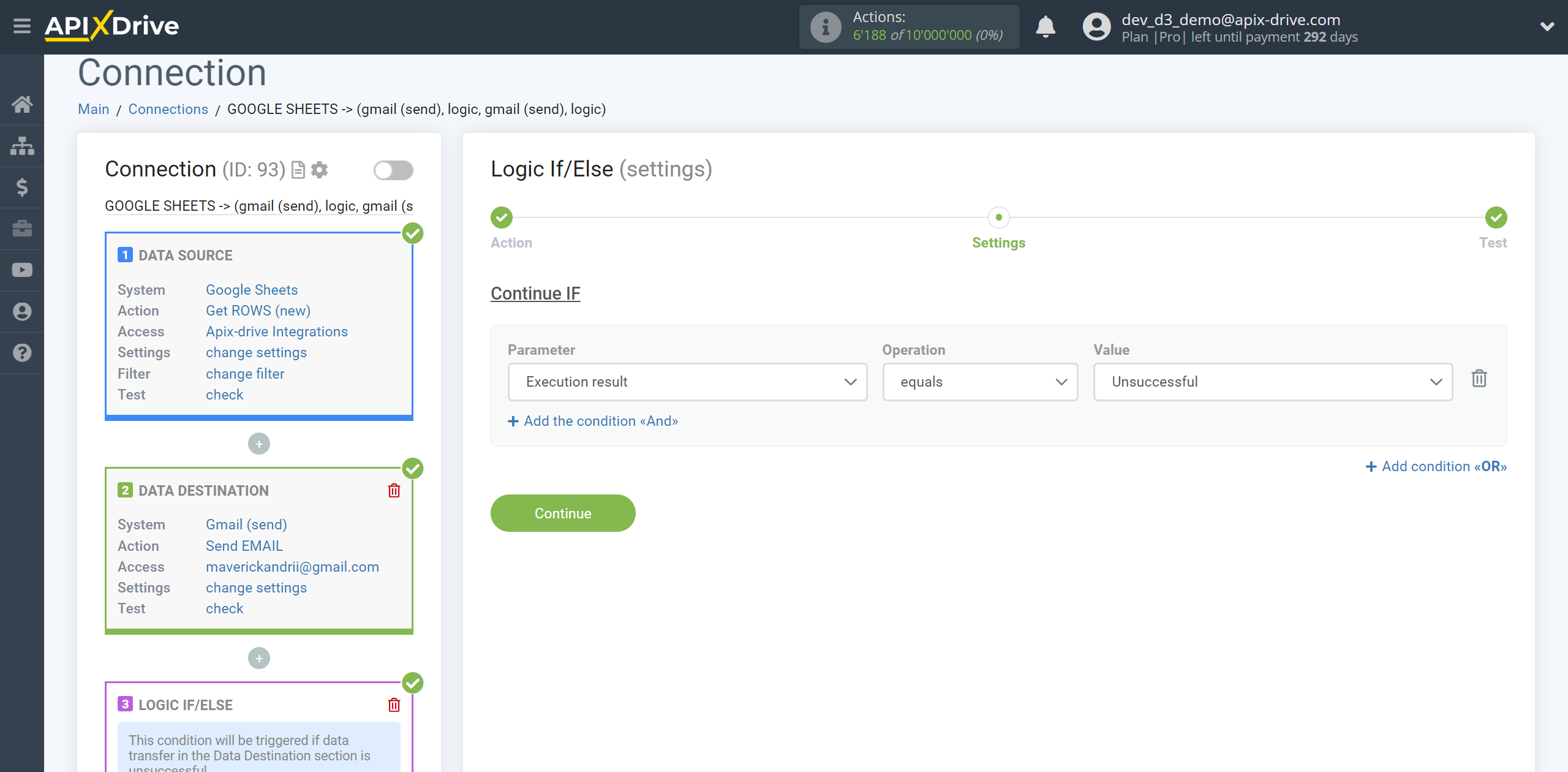
Also, you can add additional conditions using the operators "AND", "OR". In this case, this is not necessary, so click “Continue”.
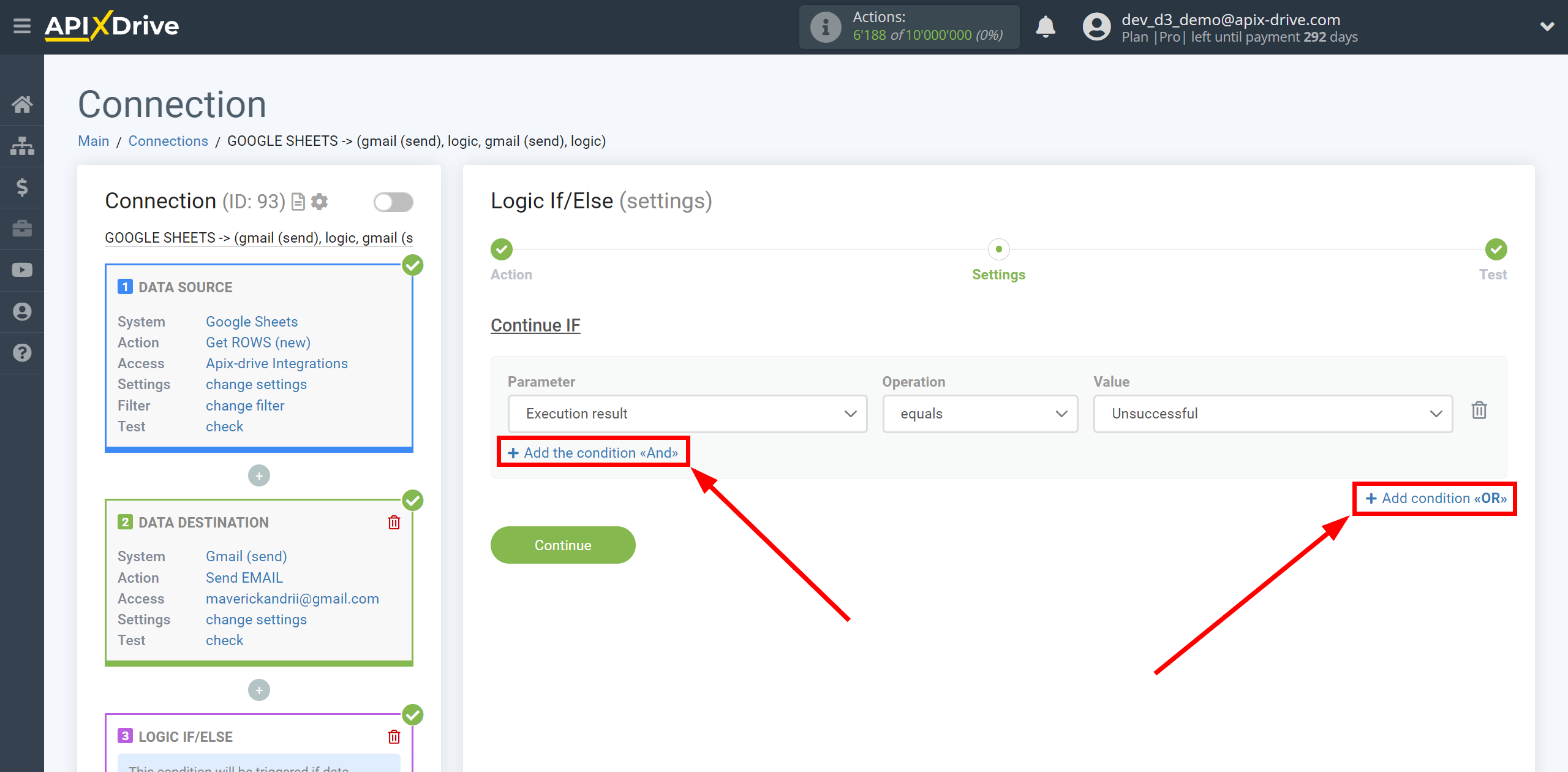
At the Test stage, you will see Logical result = 1 - this means that the setting of the action If for a specific condition is satisfied.
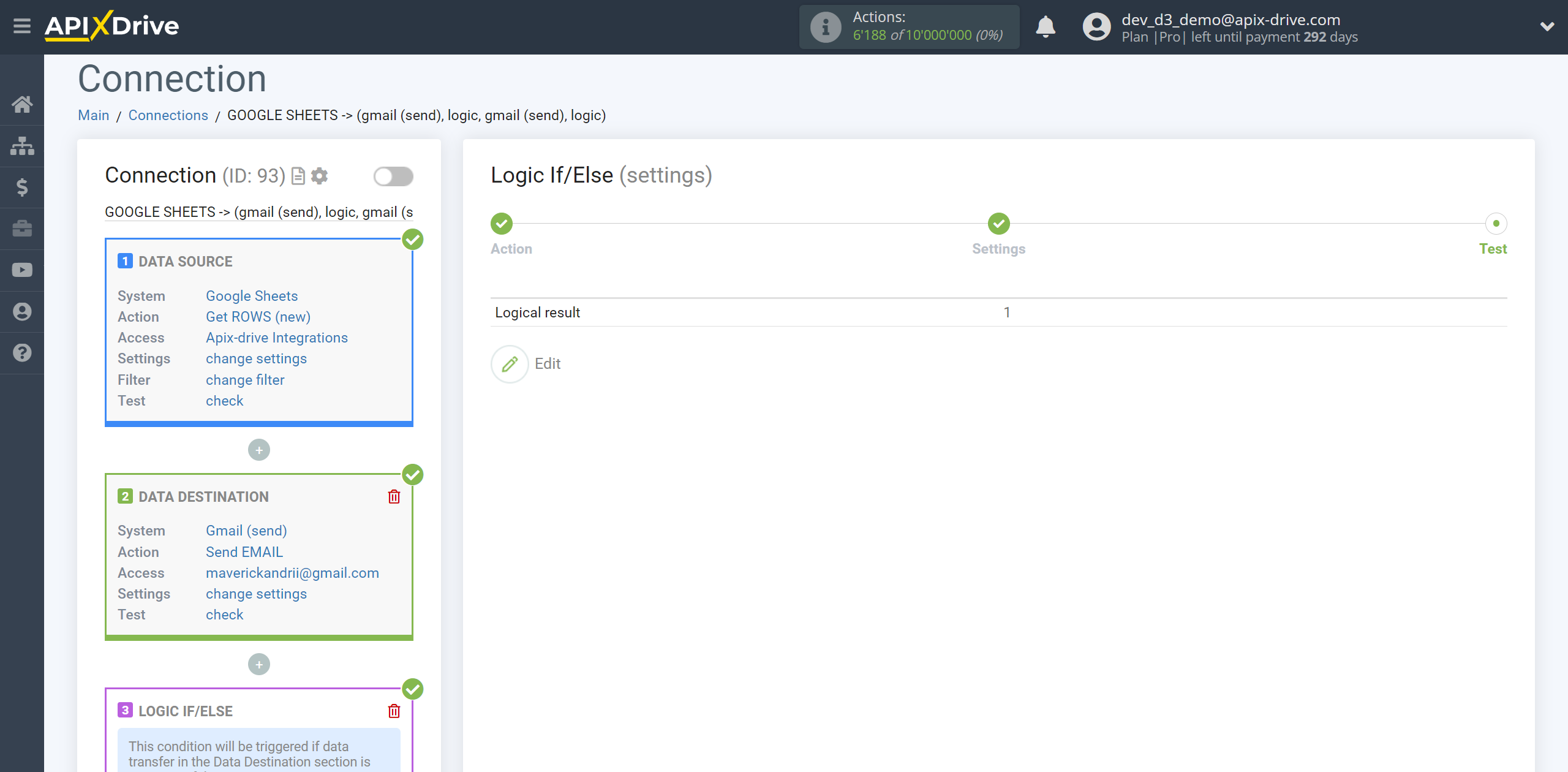
Next, you need to indicate what action the Logic section will perform,
when certain conditions are met, that is, what is the next data transfer algorithm and to which system.
In this example we use the DATA DESTINATION section.
Inside the Logic section we connect the Data Destination system. To do this, click on “+” and select “DATA DESTINATION” from the list.
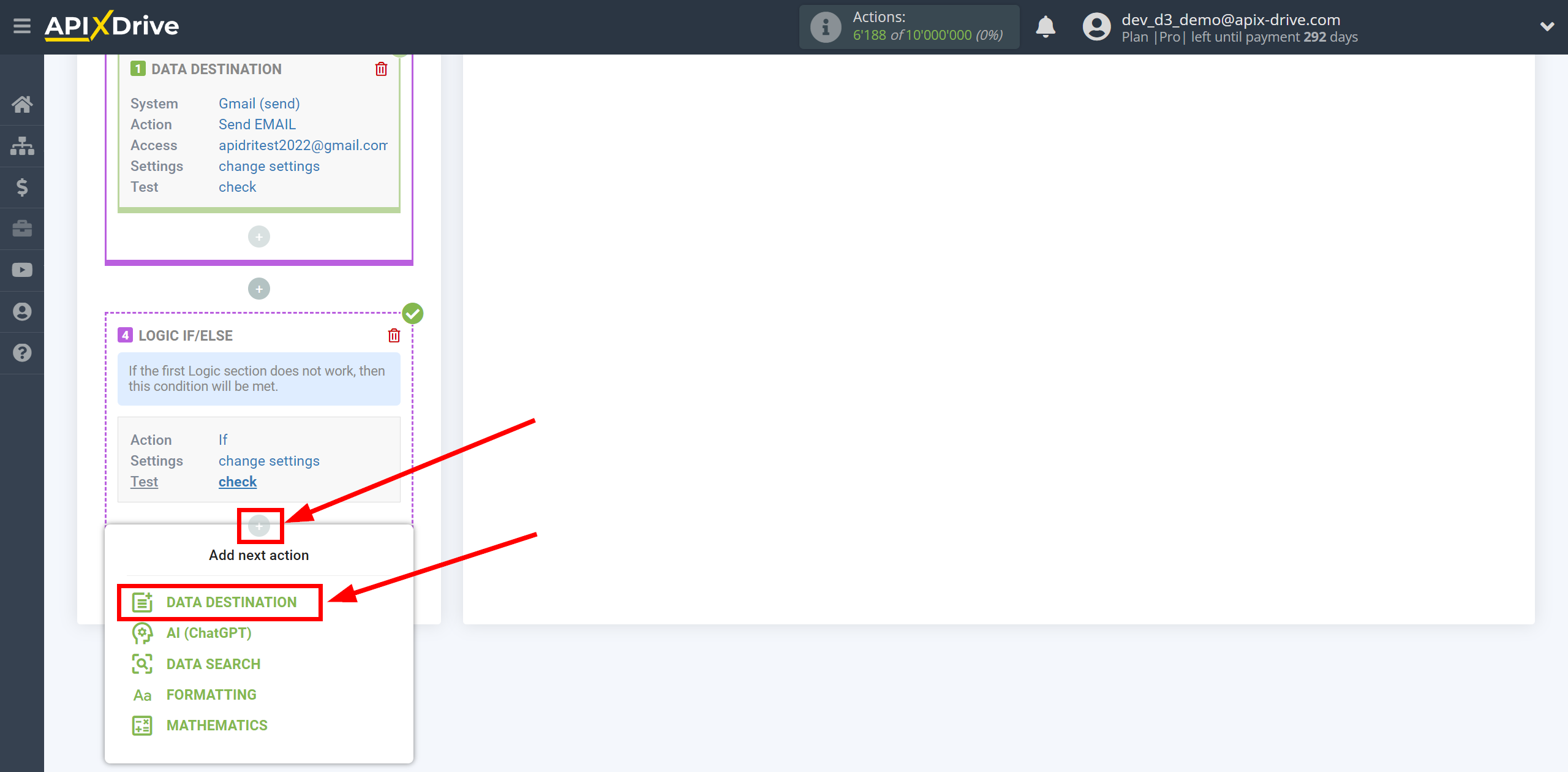
Setting Data DESTINATION inside the LOGIC If/Else section: Slack
Select the system as Data Destination. In this example, we select Slack
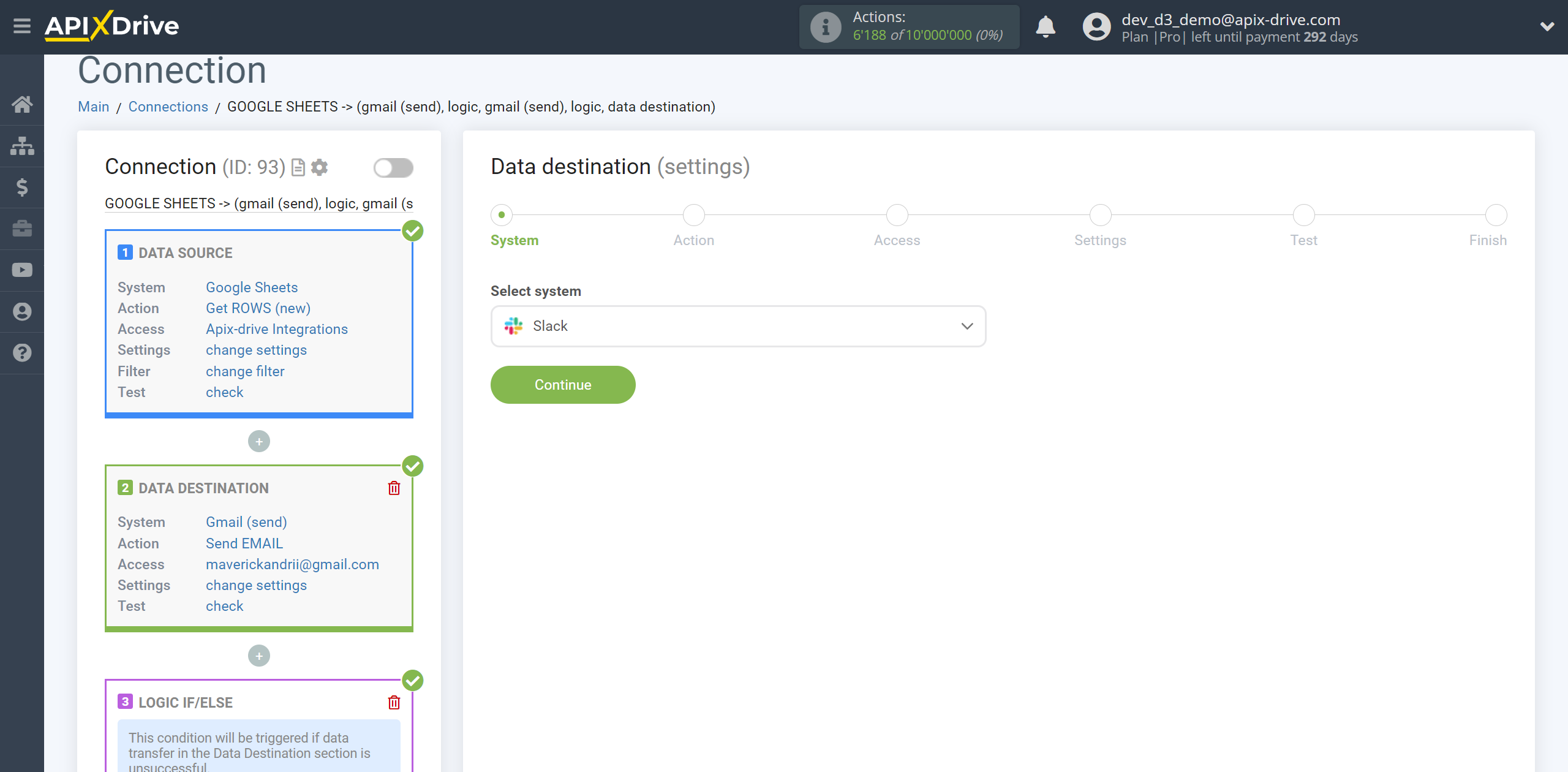
Next, you need to specify an action, for example, "Send MASSAGES (channel)".
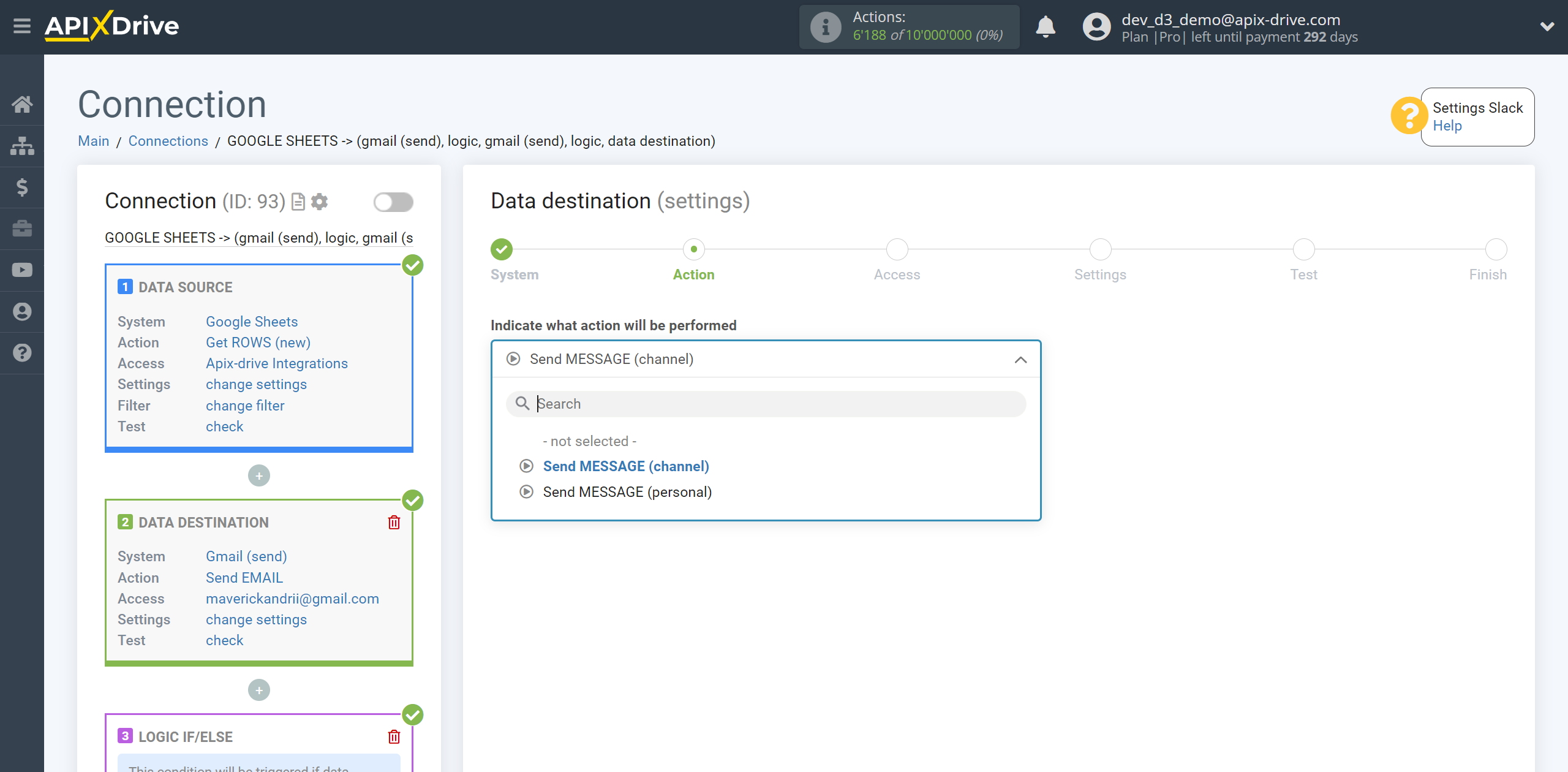
The next step is to select the Slack account to which messages will be sent.
If there are no accounts connected to the ApiX-Drive system, click “Connect account”.
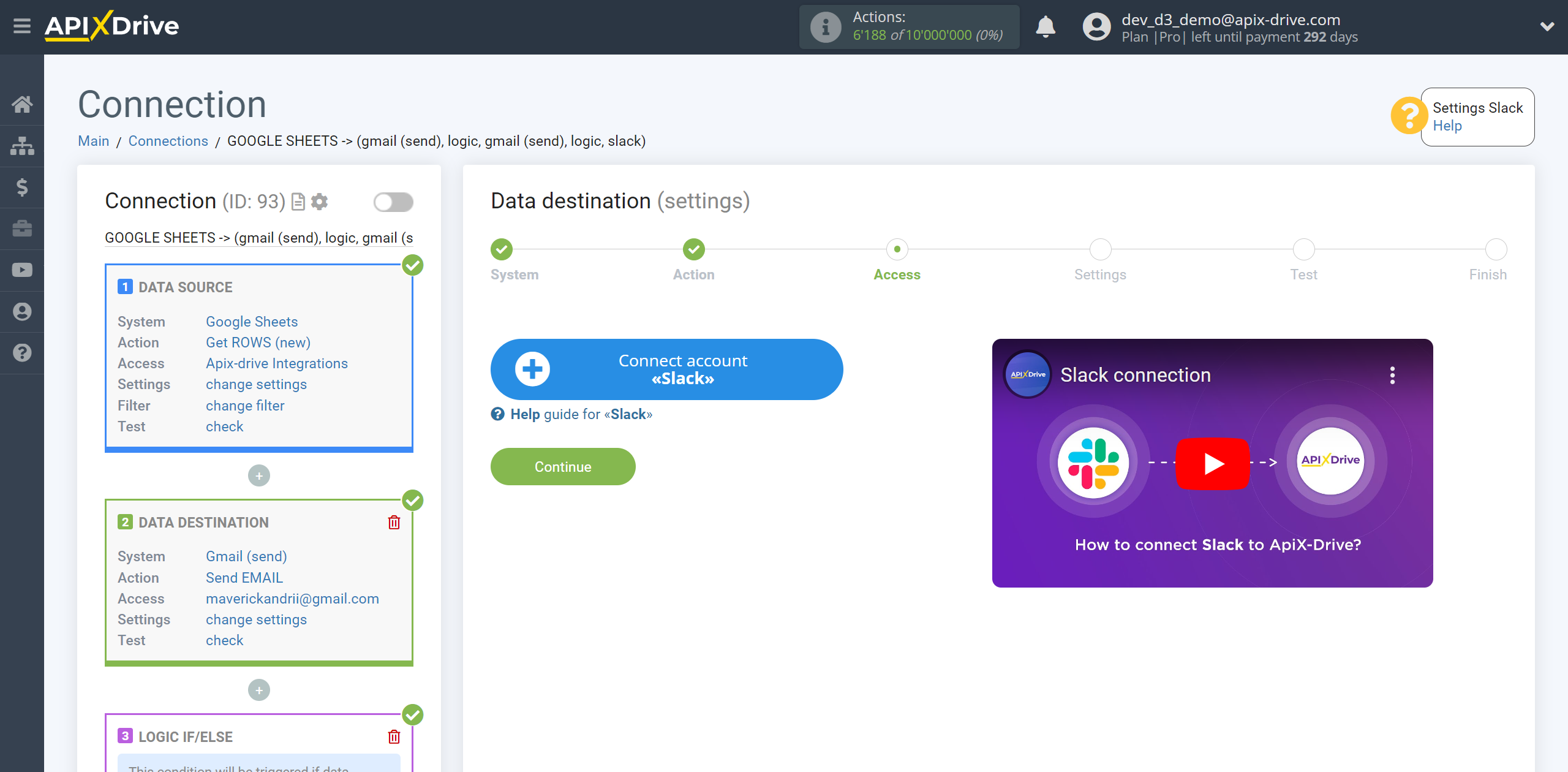
To connect your Slack account, follow the sequence:
1. Sign in to your Slack workspace
2. Enter your Slack username and password
3. Click "Allow" to grant ApiX-Drive permission to work with your Slack
4. After authorization, select the connected Slack account and click "Continue"
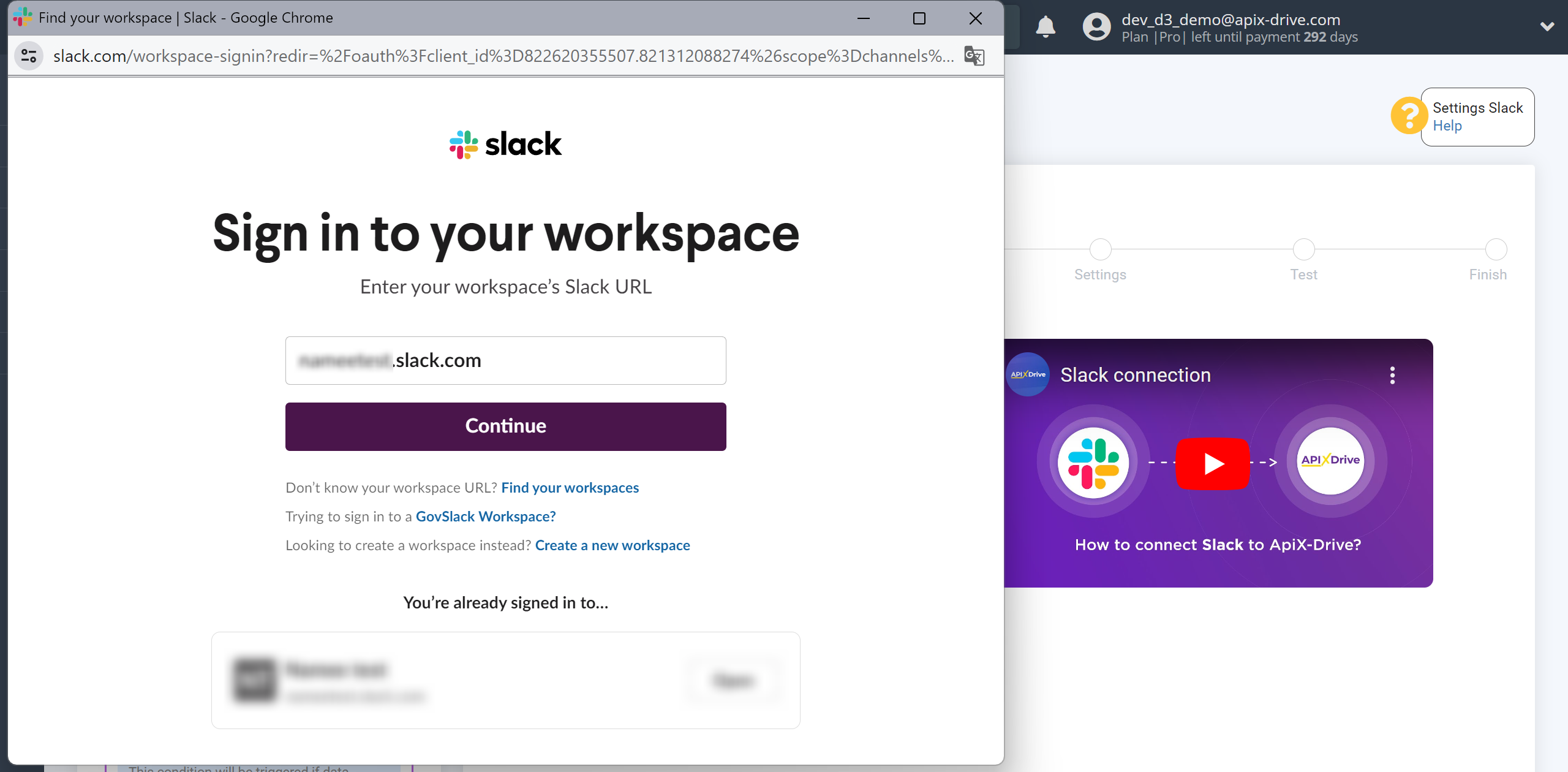
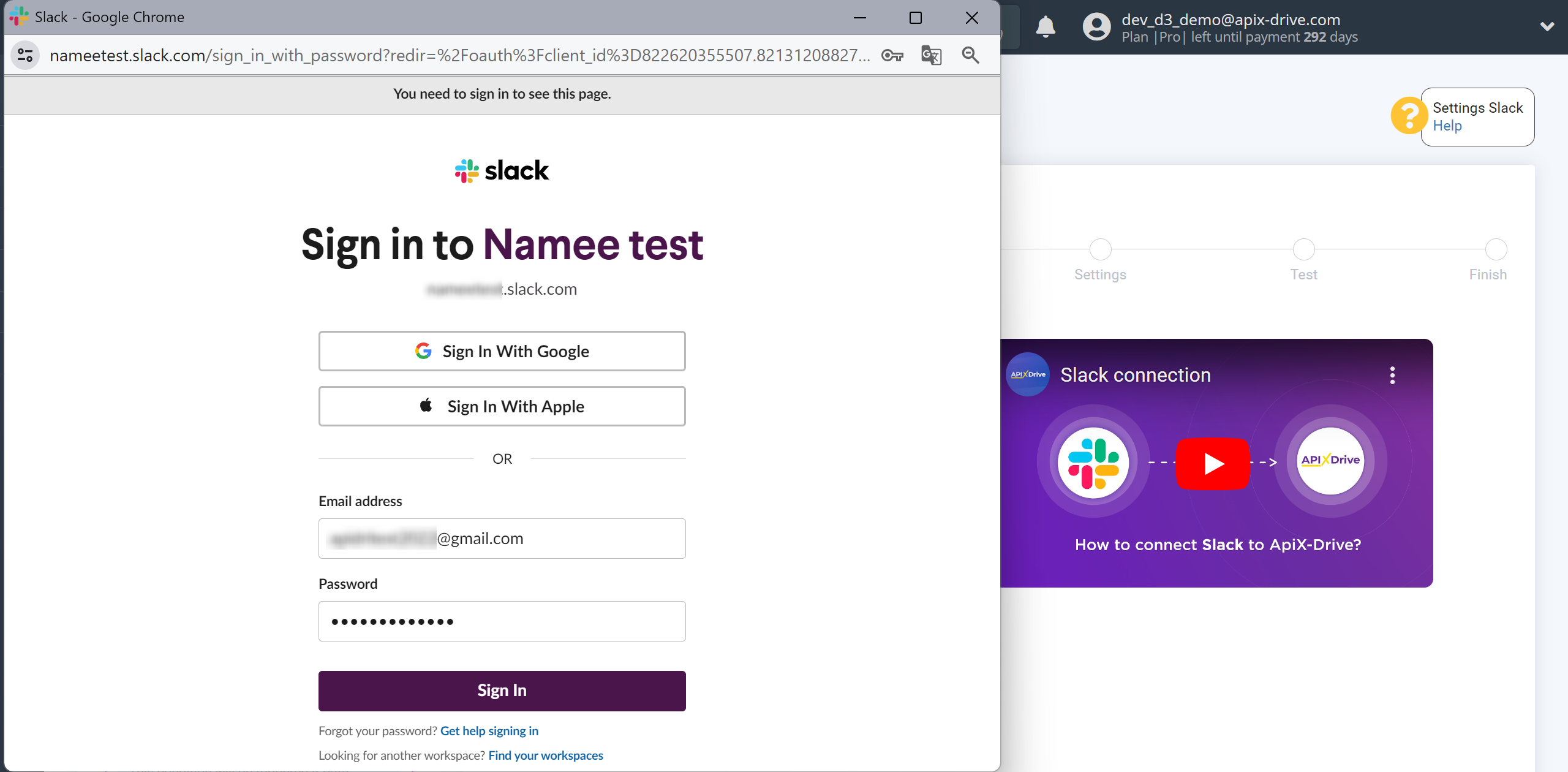
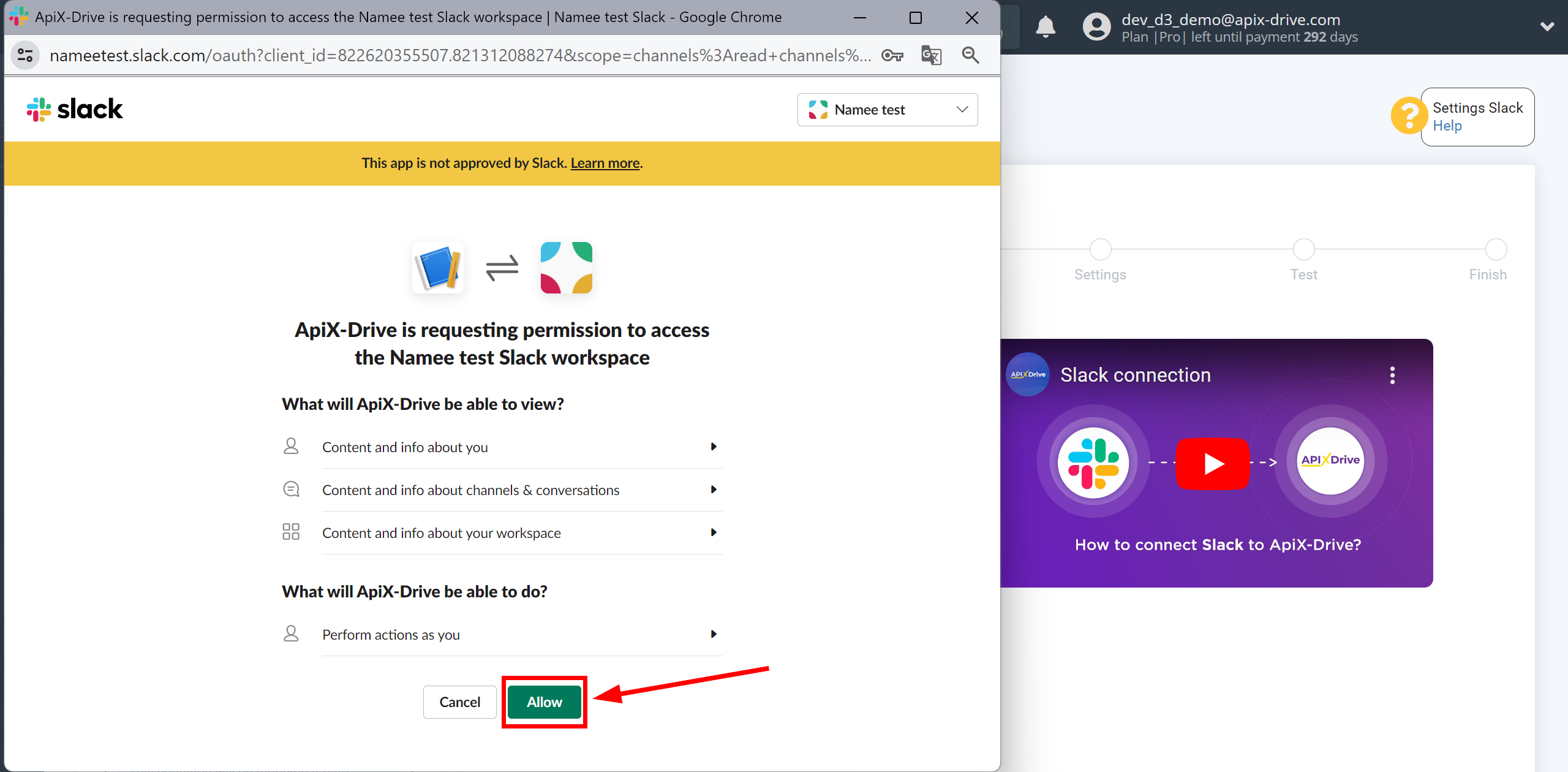
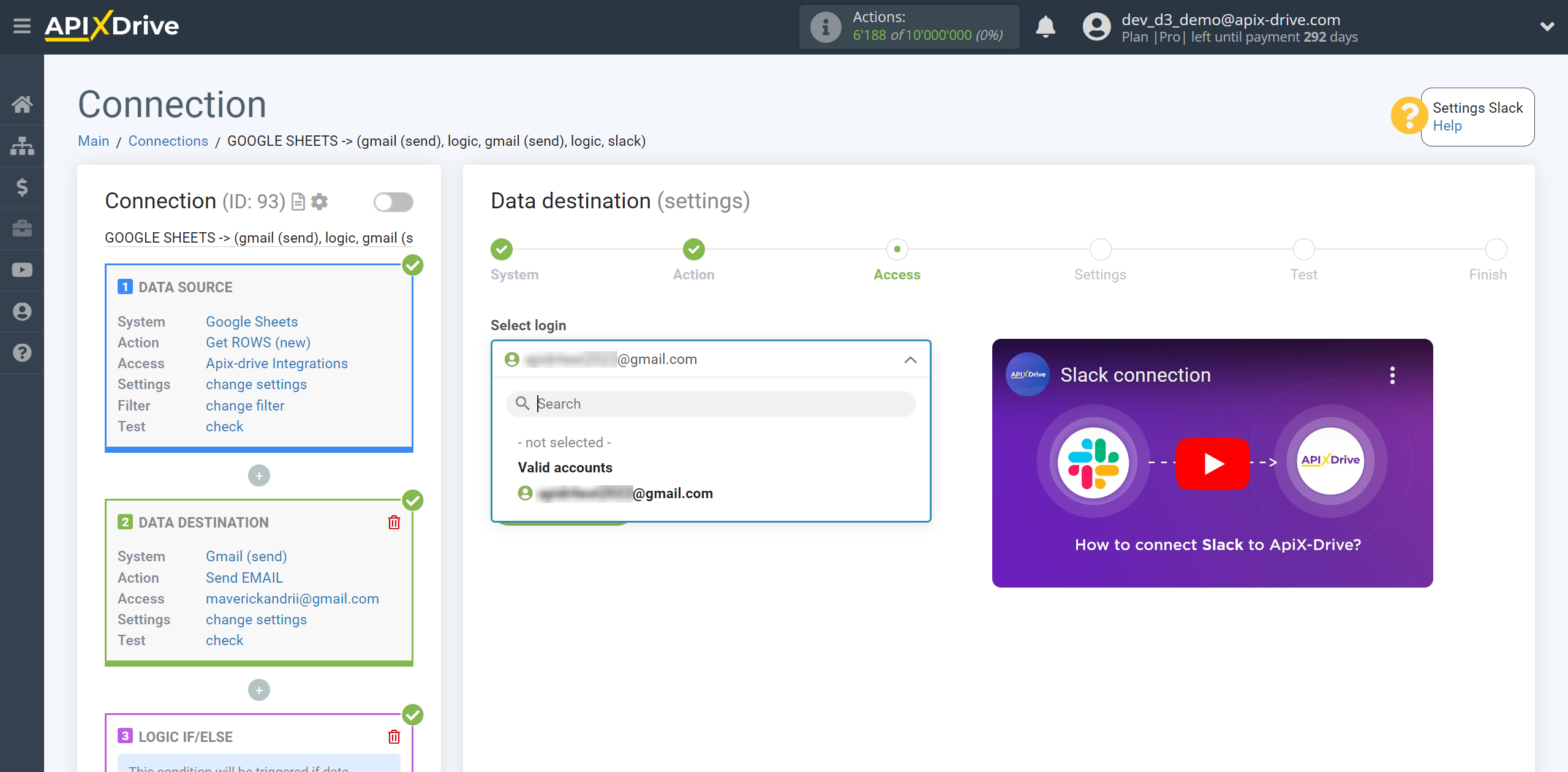
Now, you need to select a channel and create a message from the data that will be sent to Slack.
Expand the drop-down list and select the required indicators.
If necessary, write any constant variables in a field, or select the desired variable from the drop-down list to build a message, as shown in the example.
If you need to send messages to multiple channels, then create another connection and select a different channel.
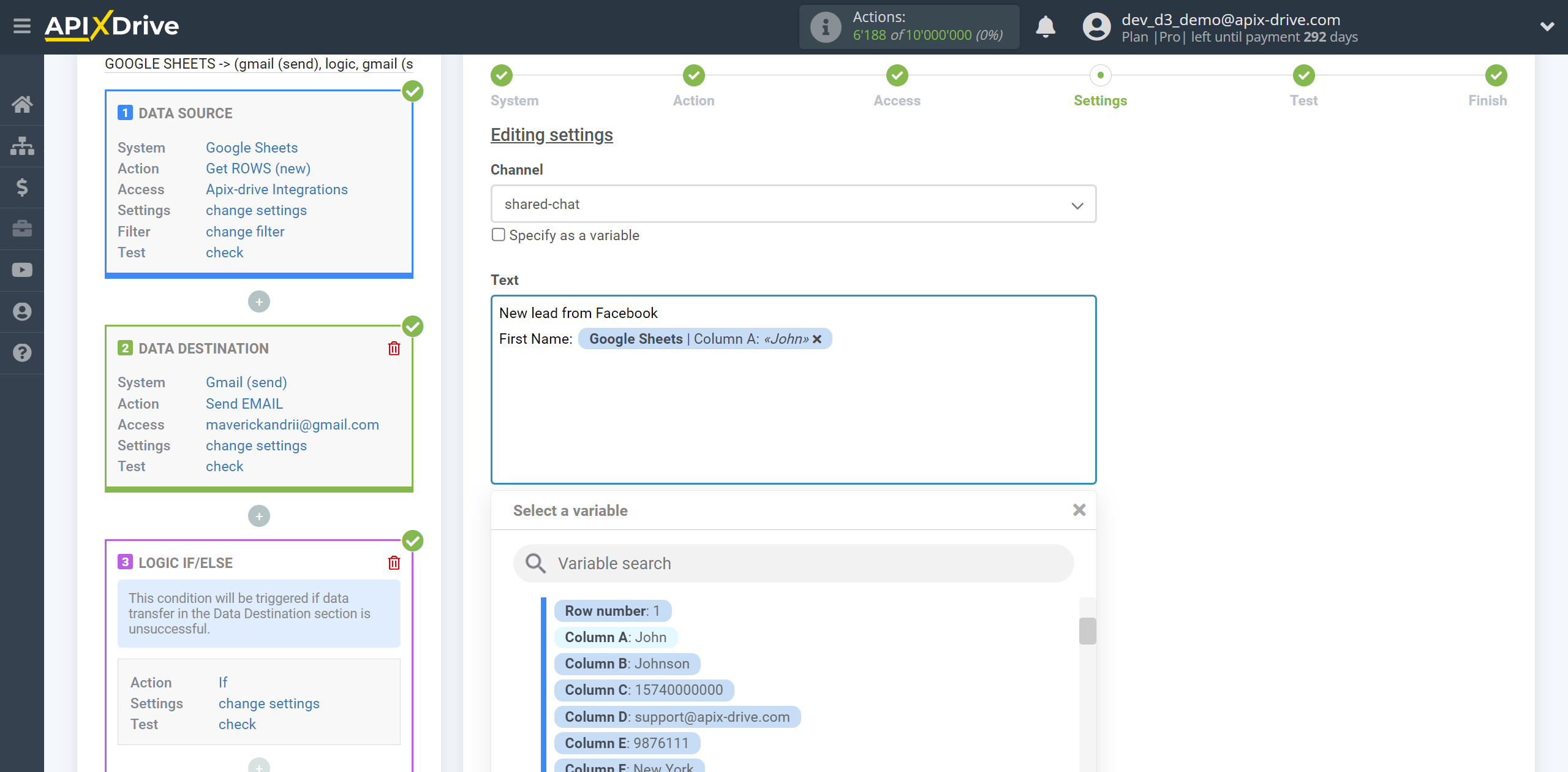
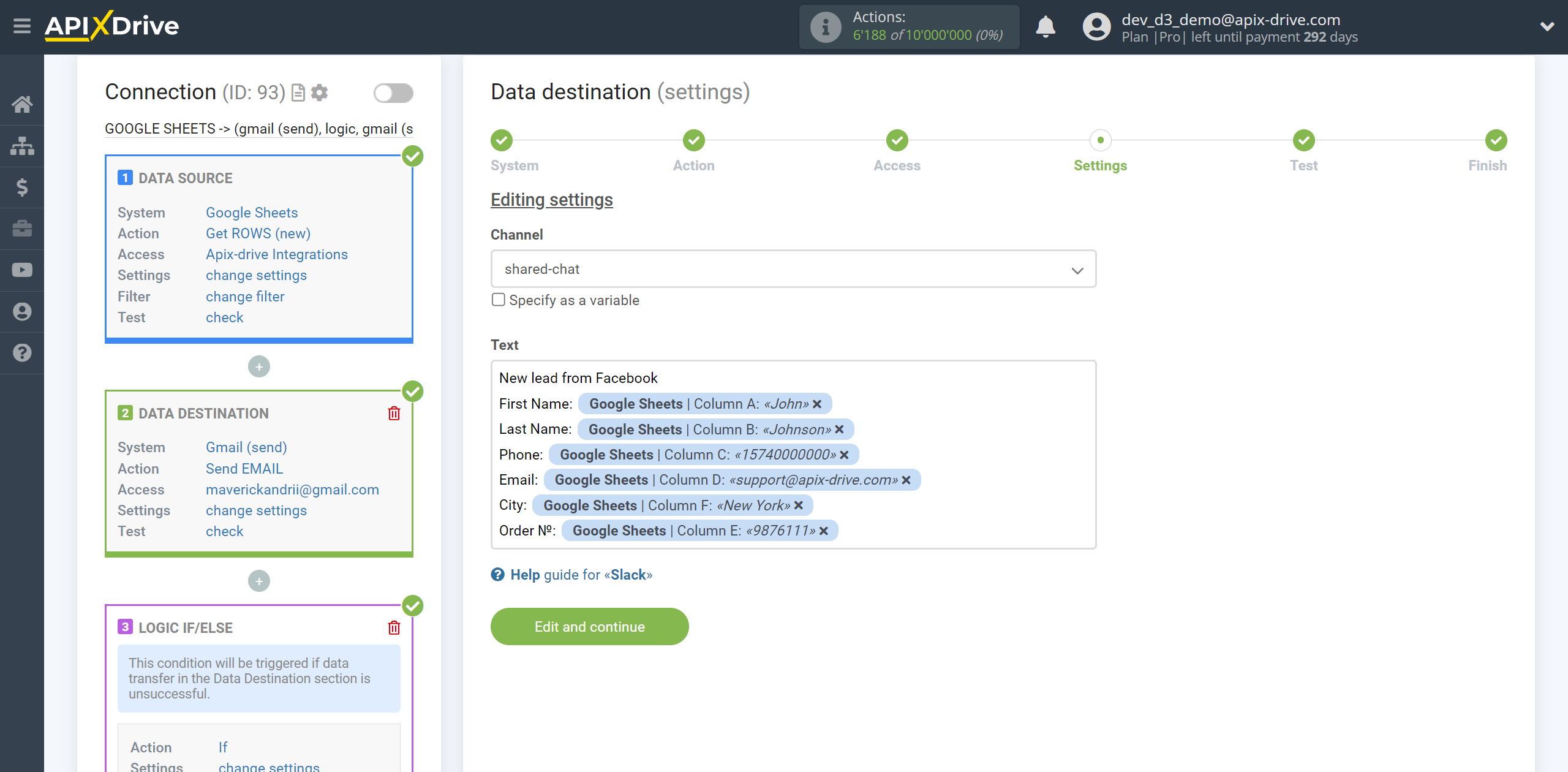
Also, in this example, we will add to the message text information about errors that occurred in Gmail Data Destination, due to which data transfer was unsuccessful, for this we will assign the “Runtime Errors” fields from the two Gmail Data Destination sections.
Note! The “Runtime errors” fields at the Test stage will be empty, since they are filled in only when auto-updating the connection is running and if the Data Destination system contained an error text.
When the message is generated, click "Edit and continue".
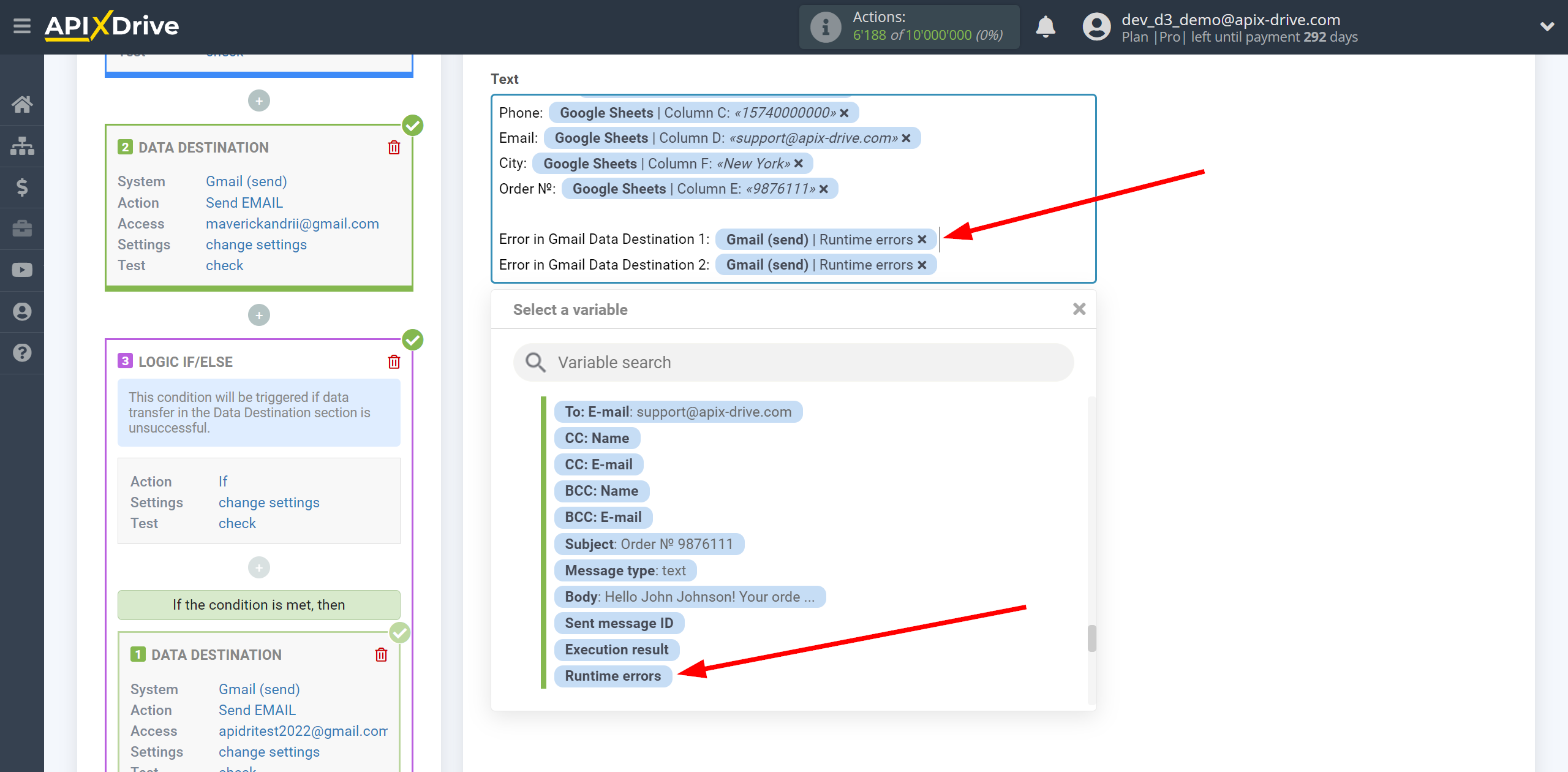
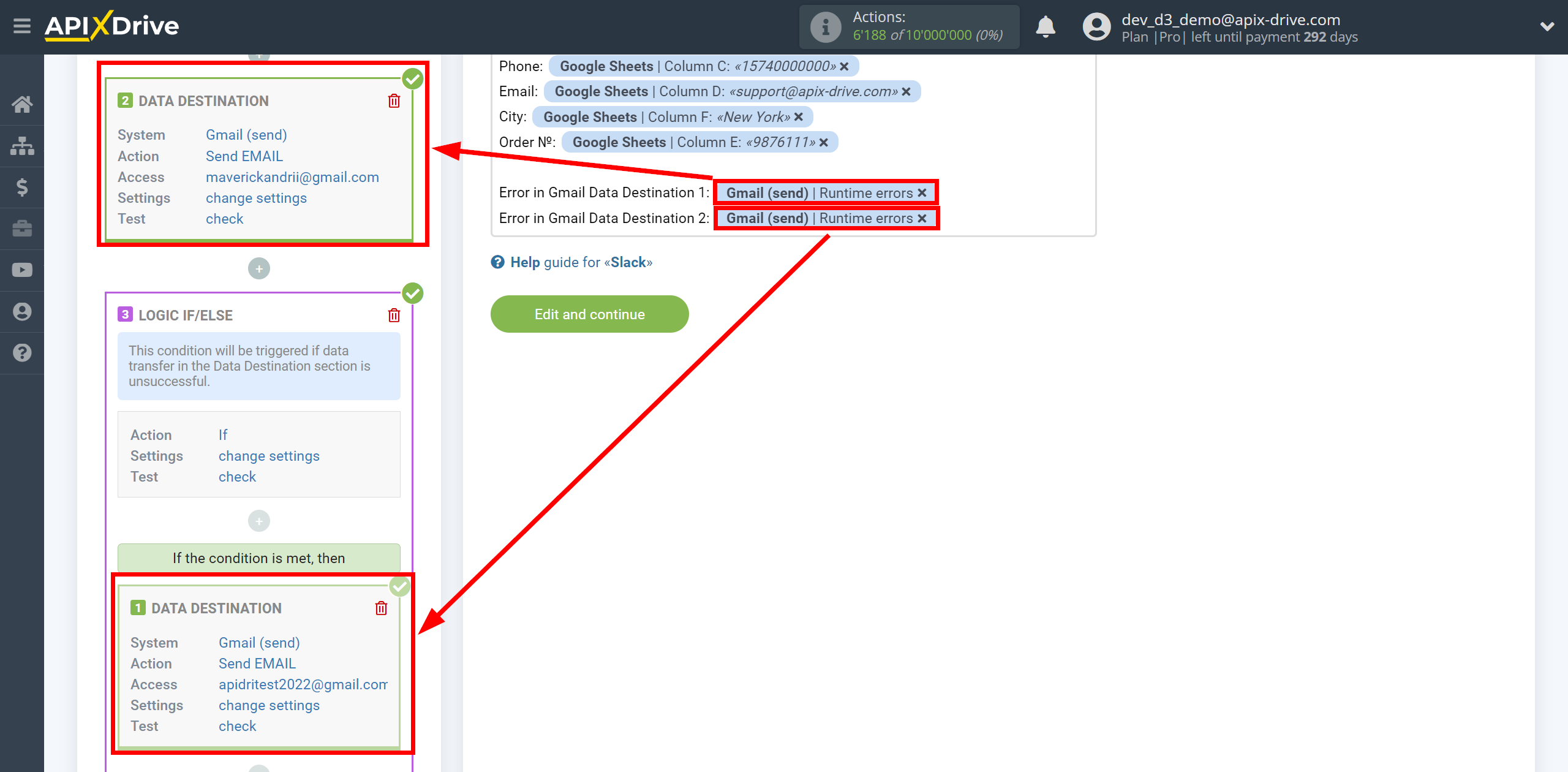
Now you can see the test data of what your message will look like.
To check the correctness of the settings - click "Send test data to Slack" and go to your Slack to check the result.
If something does not suit you - click "Edit" and go back one step.
If everything suits you - click "Next" for further settings.
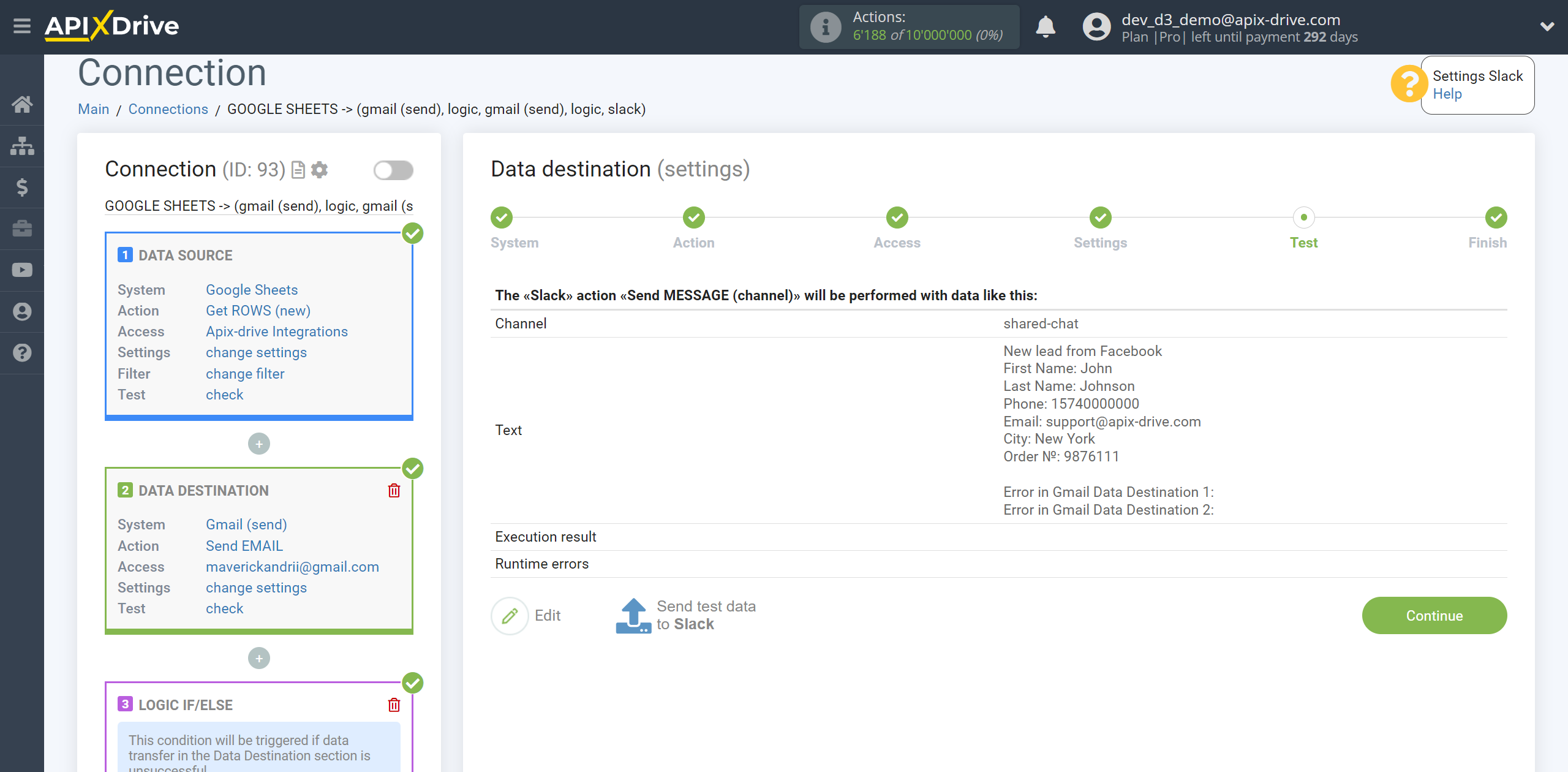
This completes the setup for Data Destination Slack!
As a result, we have the following condition: When get data from the Data Source system, we send an email to the client from the connected first Gmail account, If the email is not sent, that is, an error occurred or for some other reason the sending failed, then we send an email to the client from the connected second Gmail account, If the email is not sent again, then we send a message to the connected Slack account with the client data, as well as information about errors in Data Destination.
Now you can start choosing the update interval and enabling auto-update.
To do this, click "Enable update".
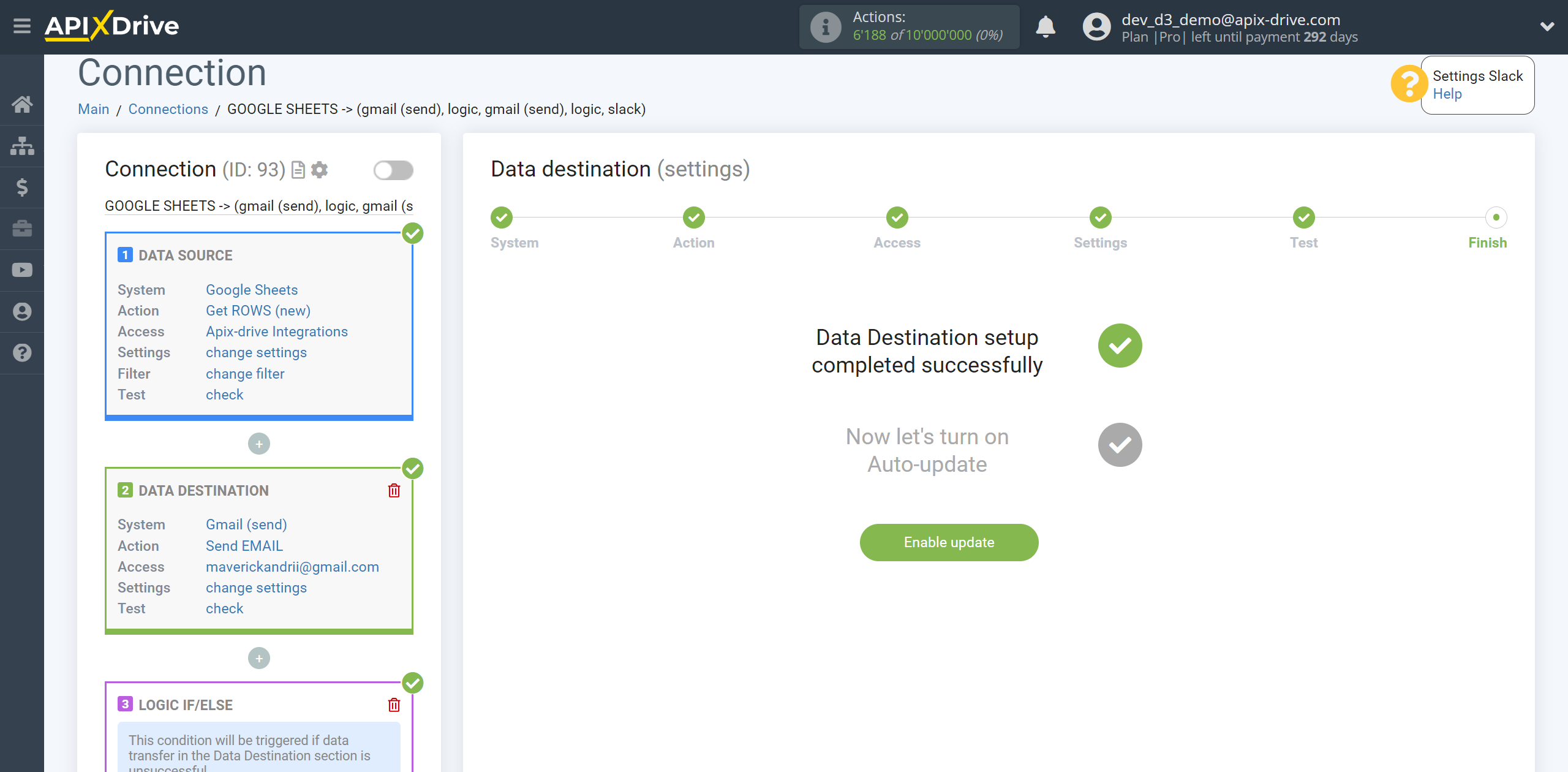
On the main screen, click on the gear icon to select the required update interval or setup scheduled launch. To start the connection by time, select scheduled start and specify the desired time for the connection update will be started, or add several options at once when you need the connection will be started.
Attention! In order for the scheduled launch to work at the specified time, the interval between the current time and the specified time must be more than 5 minutes. For example, you select the time 12:10 and the current time is 12:08 - in this case, the automatic update of the connection will occur at 12:10 the next day. If you select the time 12:20 and the current time is 12:13 - the auto-update of the connection will work today and then every day at 12:20.
To make the current connection transmit data only after another connection, check the box "Update connection only after start other connection" and specify the connection after which the current connection will be started.
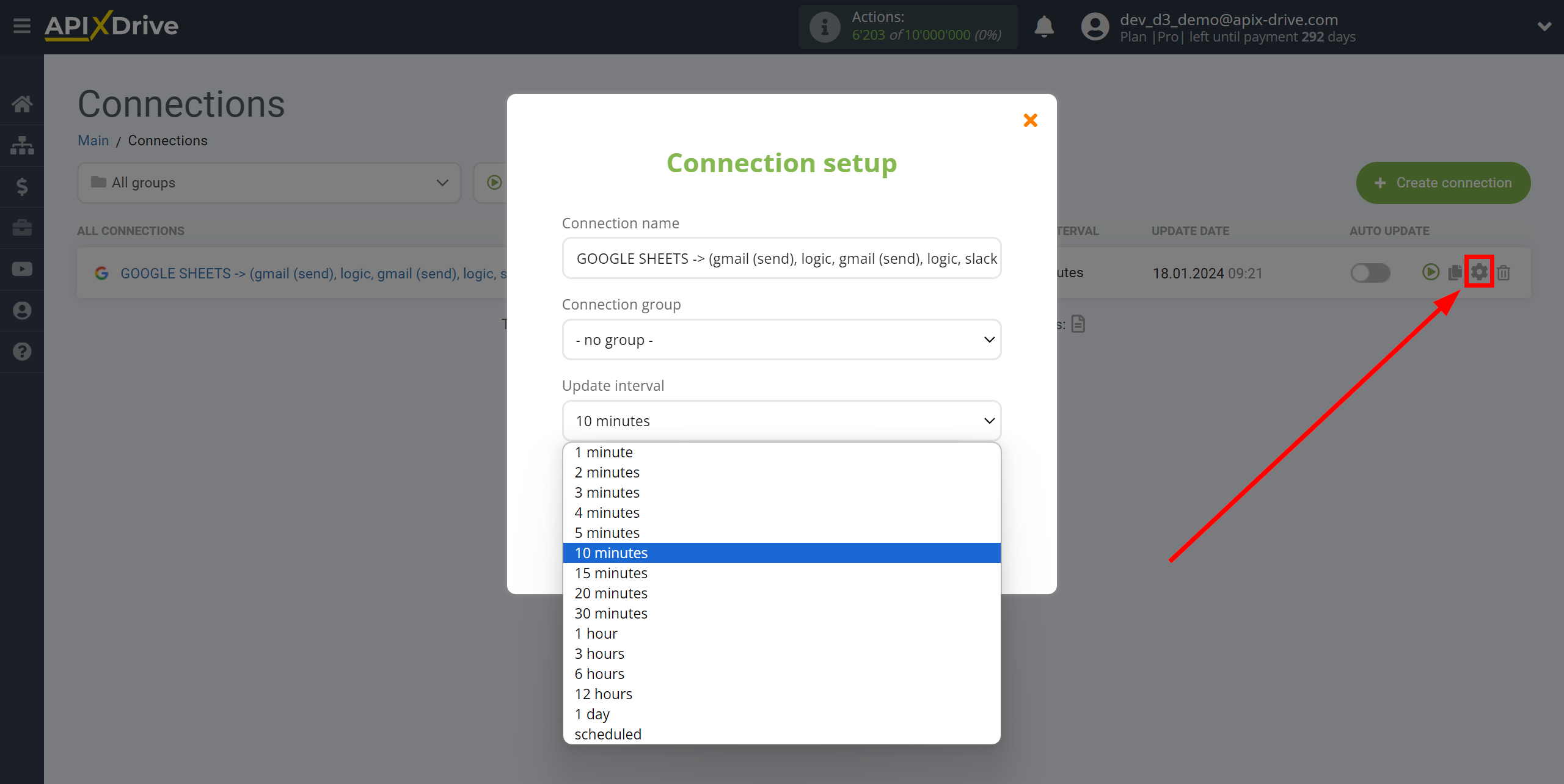
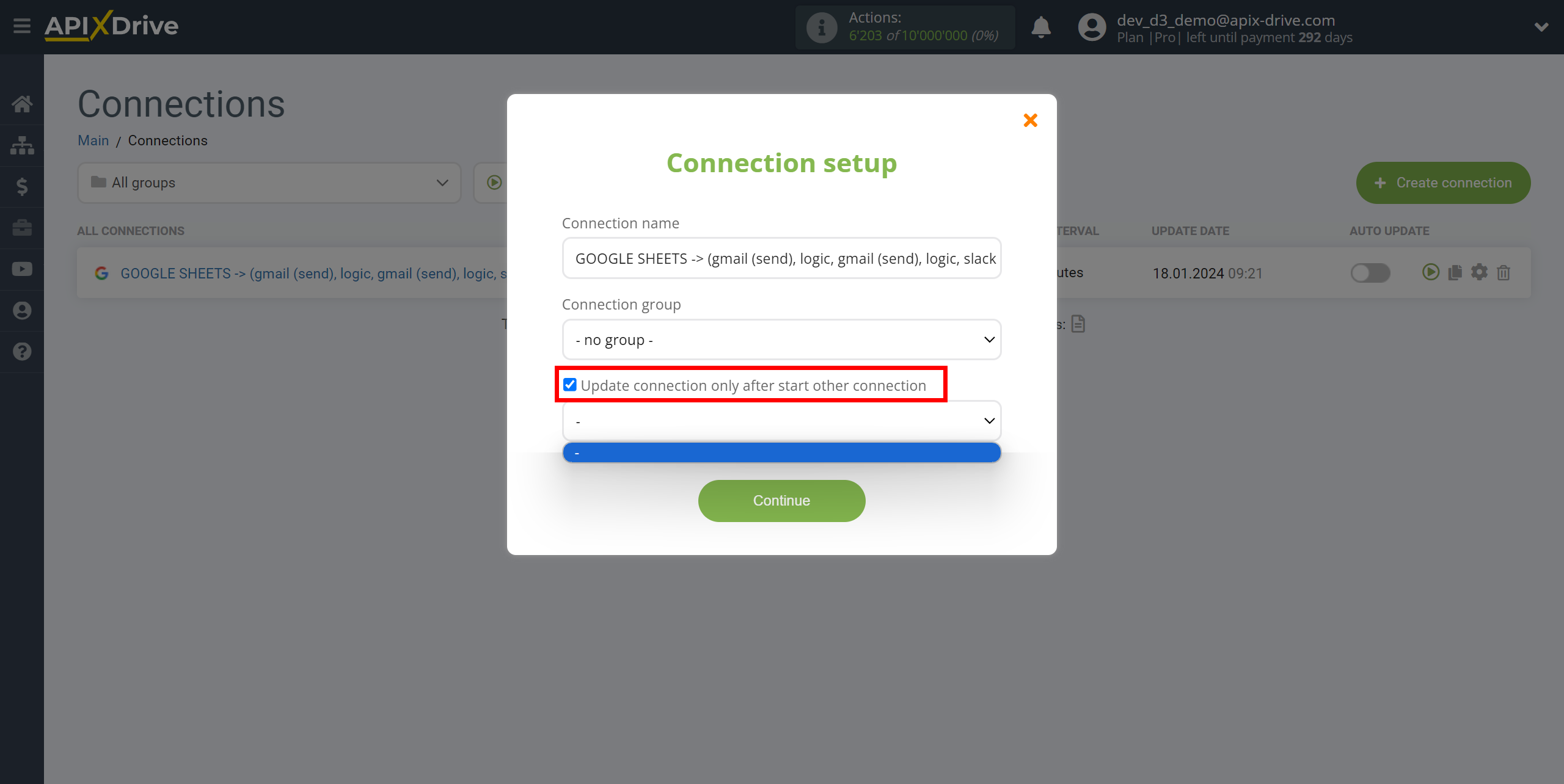
To enable auto-update, switch the slider to the position as shown in the picture.
To perform a one-time data transfer, click on the arrow icon.
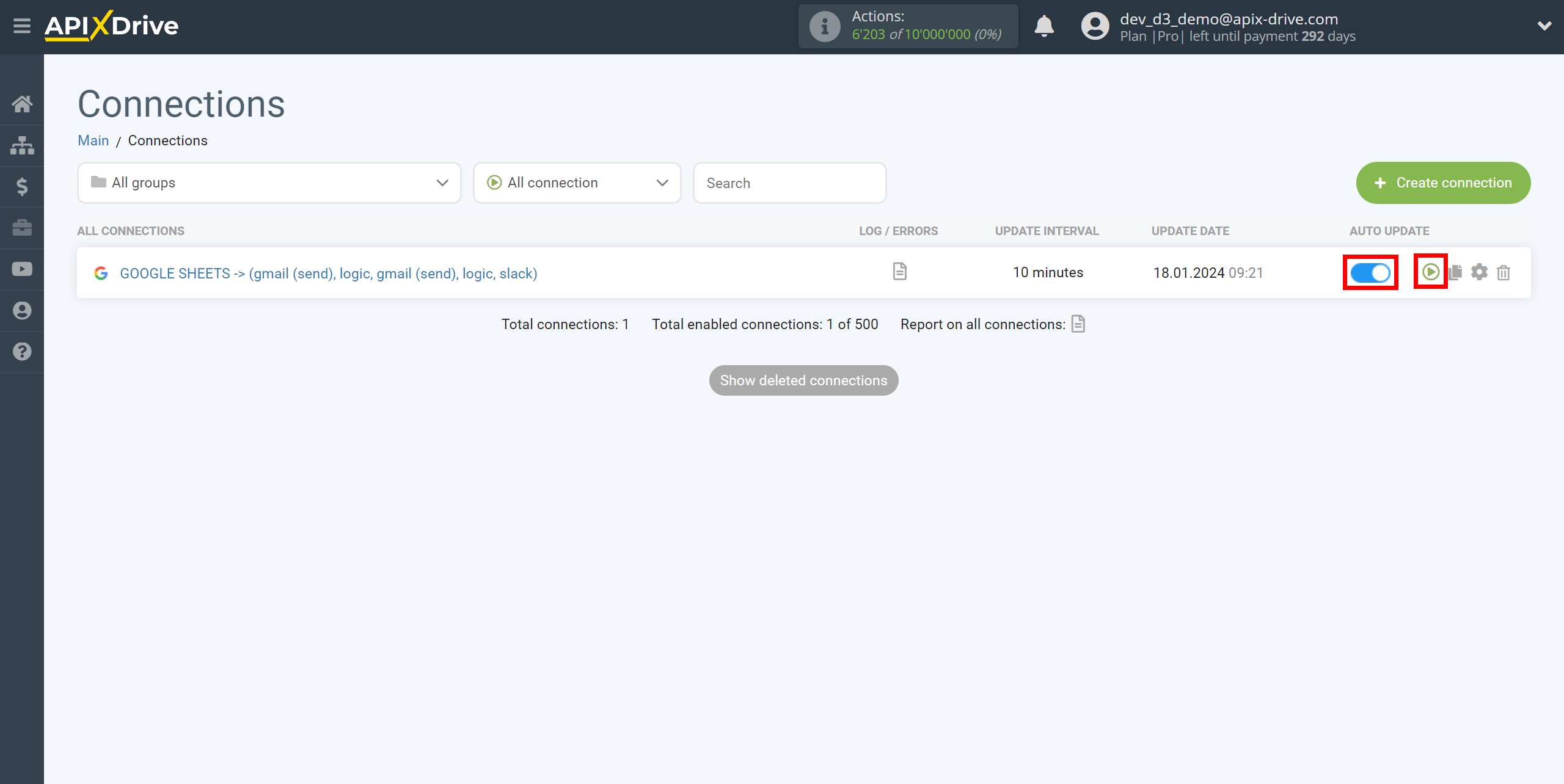
This completes the Logic setup! See how simple it is!?
Now you don’t have to worry, ApiX-Drive will do everything on its own!